2 Volumes
BANKS REDEFINED
American banking was invented in Philadelphia. The banking center of America has moved away and changed in extraordinary ways but the foundations remain.
Money
New volume 2012-07-04 13:46:41 description
Investing, Philadelphia Style
Land ownership once was the only practical form of savings, until banking matured in the mid-19th century. Philadelphia took an early lead in what is now called investment and still defines a certain style of it.
Quaker Investment Committee
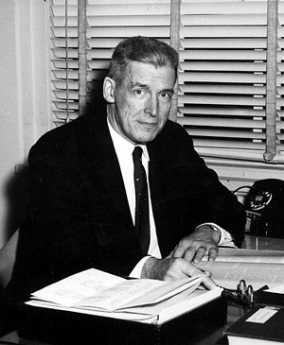
|
| Jonathan Rhoads |
Charitable institutions and other non-profit organizations occasionally assemble an endowment and thus develop a need for an oversight committee to hire (and occasionally fire) an investment manager, to monitor the fund's management, and to assess the manager's fees. The meetings of the oversight committee could, therefore, be pretty brief, related to two numbers. How had the endowment portfolio performed, compared with some acknowledged benchmark? To these two numbers might be added a brief summary of the investment management fees, compared with the usual benchmarks (40 basis points, or .4%, would be a common standard). However, an agenda so mercilessly sparse seems an inadequate reason to convene a group of worthies for an hour, and quite commonly the committee will chat about investments in general, hoping to pick up some personal pointers. A good tip or two makes the whole effort seem worthwhile.
On one such occasion in 1987, the famous Quaker surgeon Jonathan Rhoads, Sr was chairman of the committee. The manager of the endowment was a handsome fellow whose picture had occupied a full page of the New York Times financial pages just a day or two before this particular meeting. The picture had been truly spectacular, the tailoring was remarkable, and he surely had perfect teeth. As this gentleman entered the room, the committee gathered around, slapping his back and congratulating him on his fame with great jollity. Little did the group know that within thirty days, the stock market would have its most severe drop in almost twenty years. Unnoticed at first by the merry-makers, Jonathan Rhoads had sat down at the head of a perfectly empty long mahogany table, and was intoning to the empty seats, "We will now begin by reading the minutes of the last meeting of this committee". Visibly shaken, the group immediately broke up and took their seats.
Rhoads went on. We were now to hear the report of our portfolio by our manager. Proudly, it was noted that in February we had bought XYZ for 20, and in July we had sold it for 44. And in March we had bought ABCs for 60, and it now stands at 100. When he had concluded, the chairman said, "That's fine. That's just fine. But what bothers me is that point of confusion." Why, what confusion, Dr. Rhoads?
"The confusion between investment genius, and just being in a bull market." Later the same month, the stock market suddenly dropped 22% in one day, thus guaranteeing that no one in the room would ever forget the episode.
John Bogle, A Prophet In Our Valley
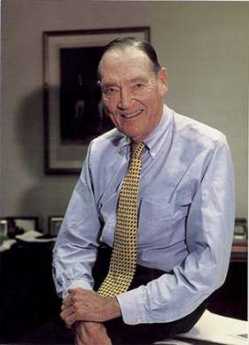
|
| John C Bogle |
Those who never met a living legend would have found in John C. Bogle a good place to begin, 80-plus years old, lively and very charming. The Vanguard Investment Company, which he founded, provides him a little think tank office, out of which have come several books and many articles (somebody else is running the company, now.) The drift of most of what he writes and most of his testimony to Congress, or at awards ceremonies, is that mutual funds charge too much. When the press decides to feature him, the spectacular theme is emphasized that in 1996 this current squash and tennis player was just about dead, and had a transplant of someone else's heart to keep him going. A populist graduate of Pre-Vietnam Princeton, and also the embodiment of a medical miracle, now, those things are newsworthy.
Future students of finance, however, will regard those things as minor footnotes. Bogle's real achievement was the invention of the index fund. Indexing had two purposes and probably stumbled onto a third. It combined diversification, low administrative costs, and outstanding investment performance in a single security. There will be foot-dragging in the boutiques and bucket shops, but this invention is well on its way to converting investment management from an inefficient luxury of the rich into an affordable efficient commodity for everybody. You will know that a fundamental has been established on the day when the U.S. Government starts buying index funds, or at least when it permits them to help finance Medicare or Social Security. Such invested funds of a government qualify for the term Sovereign-wealth funds; in fact, since major problems can be imagined if governments start to vote common shares, Heaven helps us if they don't stick to index funds. The investment community already knows that something basic has arrived, by their own standards. The original index fund will soon have a trillion dollars invested in it. Just do the math on what you would be paid if you realized a fifth of one percent, year after year, on managing a trillion. And then reflect on the impact on transactional costs generally, when many eminent firms still charge five times that much. To make barrels of money and still be a hero for making your product remarkably cheap -- now, there's a Philadelphia dream.
A technical explanation. Five hundred stocks as one lump are cheaper to buy and sell as a "program trade", and perform more smoothly, than any of them individually, because the ups balance out the downs. Transaction costs are less, because there is hardly any switching among the 500 stocks by the committee in charge, and therefore few taxes to pay. Fine, but what might not be easily anticipated is that the lumped investment performs better, unmanaged than the vast majority of funds managed by experts. Large funds, at least, are forced to buy the
stocks of large corporations. Large corporations are inherently subject to immense scrutiny and publicity, so there remains little advantage to being on the inside or acting quickly on general economic news. What everybody knows, in Wall Street parlance, isn't worth knowing. Index funds made up of small companies, or foreign companies, may possibly not work out as well as those limited to large domestic companies. For a while, it was thought index funds would out-perform when everything in the marketplace was going up, but underperform when most things were going down in a bear market. Not so, they seem to work better any way you look at them. They are the standard for performance, not just a measure of the averages. These things are here to stay.
Well, maybe. Reservations remain, although they don't have much to do with investment choices. It may take decades to happen, but it's hard to escape the uneasy feeling that some manager, someday, will figure out a way to divert a hundredth of a percent, or so, into his own pocket. A hundredth of a percent of a trillion dollars is quite a temptation. Perhaps an even more serious concern is that voting control of the corporations in the portfolio inevitably gets diluted by widespread index investing. Management supervision by stockholders is potentially lessened. Whether this will lead to management abuses, a temptation for minority stockholder intrusions, or to the government over-regulation, taking any of these directions would likely create a new power balance in the economy.
Meanwhile, John Bogle, who died on January 16, 2019, is on his way to financier sainthood. He's certainly in a class with Anthony Drexel and Nicholas Biddle, already. And other icons are under review.
Health Savings Accounts
The legislation removes the hampering restrictions of the 1995 Law. What follows is a brief outline of the main features of the HSA/MSA clause in the 2003 law,
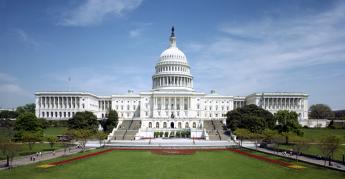
|
| U.S. Capital |
as published by the main authorizing committee, the House of Representatives, Committee on Ways and Means. From this point forward, more specifics of the program will probably be written by the Executive Branch and published in the Federal Register. The Ways and Means Committee will continue to exercise oversight authority, however, in conjunction with the Senate Finance Committee. As a consequence, statutory modifications of the program are likely to appear in future annual budget reconciliation acts, or else in any new Medicare amendments. The legislative route map becomes more understandable when it is recalled that Medicare itself is considered to be an amendment (Title XVIII) of the Social Security Act.
Committee on Ways and Means
Medicare Prescription Drugs, Improvement And Modernization Act of 2003
Health Savings Accounts (HSA's)
Lifetime savings for Health Care
Working under the age of 65 can accumulate tax-free savings for lifetime health can needs if they have qualified health plans.
A qualified health plan has a minimum deductible of $1,000 with $5,000 cap on out-of-pocket expenses for self-only policies. These amounts are doubled for family policies.
Preventive care services are not subject to the deductible.
Individuals can make pre-tax contributions of up to 100% of the health plan deductibles. The maximum annual contributions are $2,600 for individuals with self-only policies and $5,150 for families (indexed annually for inflation).
Pre-tax contributions can be made by individuals, their employers, and family members.
Individuals age 55-65 can make additional pre-tax "catch up" contributions of up to $1,000 annually (phased in).
Tax-free distributions are allowed for health care needs covered by the insurance policy. Tax-free distributions can also be made for the continuation coverage required by Federal law (i.e., COBRA), health insurance for the unemployed, and long-term care insurance.
The individual owns the account. The savings follow the individual from job to job and into retirement.
HSA savings can be drawn down to pay for retiree health care once an individuals reach Medicare eligibility age.
Catch-up contributions during peak savings years allow individuals to build a nest egg to pay for retiree health needs. Catch-up contributions allow a married couple to save an additional $2,000 annually (once fully phased in if both spouses are at least 55.
Tax-free distributions can be used to pay for retiree health insurance (with no minimum deductible requirements), Medicare expenses, prescriptions drugs, and long-term care services, among other retiree health care expenses.
Upon death, HSA ownership may be transferred to the spouse on a tax-free basis.
Contain rising medical costs- HSA's will encourage individuals to buy health plans that better suit their needs so that insurance kicks in only when it is truly needed. Moreover, individuals will make cost-conscious decisions if they are spending their own money rather than someone else's.
Tax-free asset accumulation- Contributions are pre-tax, earnings are tax-free, and distributions are tax-free if used to pay for qualified, medical expenses.
Portability- Assets belong to the individual; they can be carried from job to job and into retirement.
Benefits for Medicare beneficiaries- HSA's can be used during retirement to pay for retiree health care, Medicare expenses, and prescription drugs. HSA's will provide the most benefits to seniors who are unlikely to have employer-provided health care during retirement. During their peak saving years, individuals can make pre-tax catch-up contributions.
Chairman Bill Thomas Committee on Ways and Means 11/19/2003 12:56 PM
Investment Strategies
The Latin phrase Quis custodies custodies warns that it's pretty hard to find anyone you can completely trust. Investing for your retirement, you must be careful to avoid transaction fees to pay your agents, and taxes to pay your government to watch your agents, who in turn watch the companies they invest in.

|
| The Pitcairn Financial Group |
Gradually, the world is coming to accept John Bogle's idea of a market index fund as the best most people can do. Investing in the whole market, it doesn't do much trading, whether buying or selling. Therefore, it has minimum costs, minimum taxes. As a by-product, it has maximum diversification, hence maximum safety. Low costs and high safety don't automatically give the best performance, except that somehow they do. The Index Fund idea just relentlessly outperforms the vast majority of investment advisers, in both up-markets and down-markets. Investment advisers just hate index funds, bad-mouthing them constantly. But if you buy anything else, you had better have a very good reason to do so.
Well, it's just possible that a second Philadelphia-born idea can do it. The Pitcairn Foundation was created for his family by John Pitcairn, one of the world's all-time champion investors. About fifteen years ago, the Johnny Appleseed spirit caused the Foundation to open up its investment approach to non-family members; they created a public mutual fund company based on the collective ideas and experiences of the Foundation. John Pitcairn bought the Pittsburgh Plate Glass Company, nurtured it to success as PPG Industries, and then eventually sold it, based on the observation that almost no firms, family owned or otherwise, survive more than seventy-five years. Companies should be bought with the intention to sell them, even though they are managed expertly throughout their existence.
The Pitcairn Foundation observed that (although the managers wouldn't always admit it) continuing dominance by the founding family almost always proved beneficial for the running of the company by hired expert managers. Nepotism was often a bad thing in the managers, but a very useful thing in governance. But if you go too far with this idea, you may get into the stifling arrogance of family control in European and Oriental firms. Founding family control keeps the managers from over-paying themselves or worse still, under-working themselves. But if you allow the inevitable minority of worthless family members to pilfer the company, you get the same thing at a different level of control, where it is just harder to fire them.
After a great deal of intense scholarly work, it was observed that there are about six hundred major American corporations where the founding family maintains control. About a quarter of them have no outside directors other than the family, and the performance of these companies is about 15% worse than the market (i.e. the index). In the remaining group, family members only constituted about half of the outside directors.
Now, that group of companies regularly perform 15% better than the index. Guess which one you ought to buy as an investor.
So, now we have the Constellation Pitcairn Family Heritage Fund, open to the public as a no-load mutual fund. Its portfolio consists of fifty-five of those six hundred families dominated companies (with a market capitalization of at least $200 million each), selected by the Pitcairn Financial Company, entirely owned by the Pitcairn family. As long as it continues to outperform the index by 150 basis points, you can be fairly confident that the principle of family domination will endure, up and down the line. But not exclusively; it must be mixed with professional management. The family owns the fund manager, which is run by professionals, who watch the governance of the portfolio components, which are run by professional managers, overseen by founding family members on the corporate board -- themselves overseen by an equal number of non-family independent board members. It's like a Calder mobile, which by the way, is still another Philadelphia idea.
If you are looking to get rich fast, this isn't much of an idea. But since the Family Heritage Fund has consistently outperformed the index by 1.5%, it looks as though the advantage of selecting better corporate governance in the portfolio distinctly outweighs the disadvantage of reduced diversification.
Economics of La Cosa Nostra
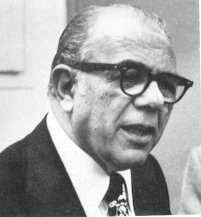
|
| Angelo Bruno |
During all of the reign of Angelo Bruno, it was a common street opinion that The Organization tried to stay away from drugs, prostitution and shooting anybody except other mobsters. Some of that attitude is found in the scene of the movie The Godfather where a neophyte going to his first killing is instructed to "Watch out for those goddam innocent bystanders". It was okay to bribe the police, not okay to annoy them. Counterfeiting and kidnapping were big no-no's, even though counterfeiting was a core activity for the ancestral Mafia in Western Sicily during the Nineteenth century.
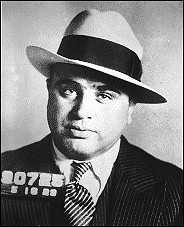
|
| Al Capone |
According to Robert Simone's book, the Philadelphia mob was mainly enriched by loan sharking. There are a lot of people who suddenly need cash desperately and can't get it quickly from banks. Simone himself was a compulsive gambler and frequently was in urgent need of money, either to throw it away or pay it back. Other people get caught in some illegal activity and suddenly need bail money to stay out of prison or up-front money for a lawyer. Or whatever. The Philadelphia mob had a reputation for being able to loan amounts of fifty or a hundred thousand dollars in response to a phone call, with home delivery of the money in fifteen minutes. For this, they would charge interest in the range of three percent a week, well above the usury limit, but probably not greatly out of proportion to the risk of loss. The police have little interest in transactions between willing parties, at least until the borrower fails to pay it back. Even at that point, it becomes a question of whether kneecaps will actually get broken, or baseball bats actually come in contact with skulls. Probably not very often, because the threat seems a credible one.
To run such a business requires large amounts of cash, hidden in safes or bricked up in walls. From this comes theft or attempted theft, with violent defense measures that often don't concern the police, much, unless those aforementioned bystanders get injured. Sometimes couriers get tempted to make unscheduled detours, but the police are fairly tolerant of informal restitution efforts. All in all, it's a nice clean illegal business.
An interesting sidelight is income tax evasion. It's entirely possible that The Organization would be willing to pay taxes if it could be done without filling out all those forms. Restaurants, bars, and market stalls can be run as a way to launder money and yet pay tax on it. But boys will be boys, and no doubt the IRS has, or had, some legitimate concerns. For years I felt the government was over-reaching when it jailed Al Capone for income tax evasion, after being unable, however, convinced it may have been, to convict him of overtly illegal activities. That's one side of it. But if you envision these organizations with millions of dollars in cash hidden away, it's easy to imagine them extending invisible credit to their associates for services rendered but not yet paid out and, of course, untaxed. Calling for such money on demand is not much different from having it in a bank. If appreciable amounts of that circumvention go on, the Internal Revenue Service really might have a grievance. Its image would be improved by demonstrating it is pursuing a named crime rather than a pretext to jail someone it doesn't like. Legislation could surely be devised which more carefully specified such illegalities. It might then be possible to bring an end to the appearance of putting people in jail for merely enjoying an ornate lifestyle. People who, almost by definition, cannot be proven to have committed a crime.
John Head, His Book of Account, 1718-1753

|
| American Philosophical Society |
Jay Robert Stiefel of of the Friends Advisory Board to the Library of the American Philosophical Society entertained the Right Angle Club at lunch recently, and among other things managed a brilliant demonstration of what real scholarship can accomplish. It's hard to imagine why the Vaux family, who lived on the grounds of what is now the Chestnut Hill Hospital and occasionally rode in Bentleys to the local train station, would keep a book of receipts of their cabinet maker ancestor for nearly three hundred years. But they did, and it's even harder to see why Jay Stiefel would devote long hours to puzzling over the receipts and payments for cabinets and clock cases of a 1720 joiner. Somehow he recognized that the shop activities of a wilderness village of 5000 residents encoded an important story of the Industrial Revolution, the economic difficulties of colonies, and the foundations of modern commerce. Just as the Rosetta stone told a story for thousands of years that no one troubled to read, John Head's account book told another one that sat unnoticed on that library shelf for six generations.
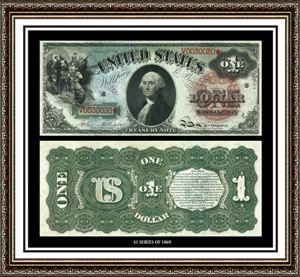
|
| Colonial Money |
The first story is an obvious one. Money in colonial days was mainly an entry in everybody's account book; today it is mainly an entry in computers. In the intervening three centuries, coins and currency made an appearance, flourished for a while as the tangible symbol of money, and then declined. Although Great Britain did not totally prohibit paper money in the colonies until 1775, in John Head's day, from 1718 to 1754, paper money was scarce and coins hard to come by. Because it was so easy to counterfeit paper money on the crude printing presses of the day, paper money was always questionable. Meanwhile, the balance of trade was so heavily in the direction of the colonies that the balance of payments was toward England. What few coins there were, quickly disappeared back to England, while local colonial commerce nearly strangled. The Quakers of Philadelphia all maintained careful books of account, and when it seemed a transaction was completed, the individual account books of buyer and seller were "squared". The credit default swap "crisis" of 2008 could be said to be a sharp reminder that we have returned to bookkeeping entries, but have badly neglected the Quaker process of squaring accounts. As the general public slowly acquires computer power of its own, it is slowly recognizing how far the banks, telephone companies, and department stores have wandered from routine mutual account reconciliation.

|
| John Head's Account Book |
From John Head's careful notations we learn it was routine for payment to be stretched out for months, but no interest was charged for late payment and no discounts were offered for ready money. It would be another century before it became routinely apparent that interest was the rent charged for money and the risk of intervening inflation, before final payment. In this way, artisans learned to be bankers.
And artisans learned to be merchants, too. In the little village of Philadelphia, chairs became part of the monetary system. In bartering cabinets for the money, John Head did not make chairs in his shop at 3rd and Mulberry (Arch Street) but would take them in partial payment for a cabinet, and then sell the chairs for the money. Many artisans made single components but nearly everyone was forced into bartering general furniture. Nobody was paid a salary. Indentured servants, apprenticeships trading labor for training, and even slavery benignly conducted, can be partially seen as efforts to construct an industrial society without payrolls. Everybody was in daily commerce with everybody else. Out of this constant trading came the efficiency step for which Quakers are famous: one price, no haggling.
One other thing jumps out at the modern reader from this book of account. No taxes. When taxes came, we had a revolution.
www.Philadelphia-Reflections.com/blog/1517.htm
David F. Bradford, 1939-2005

|
| David Bradford |
We should take the word of his friend and colleague, Daniel Schaviro, that the core of David Bradford's professional career as an economist was his conviction that a very deep wrong existed when two people could earn exactly the same income over their lifetimes but the one who spent every cent immediately would pay less in taxes than the other who carefully saved for his retirement and heirs. Bradford was offended by this message our society was broadcasting.
Working for a time in the U.S. Treasury Department and later as a member of the President's Council of Economic Advisor's, he was able to explore the mechanical workings of tax law well enough to translate moral conviction into a workable proposal for political reform. In 1977 he published "Blueprints for Tax Reform", introducing these practical ideas at the highest level of academic rigor. The impact of his ideas in this paper extended through three presidencies, particularly the present one.
Bradford saw the tax injustice which penalized the Protestant ethic could be corrected in two ways. Either the tax code could shelter individual savings from taxes until they are spent (the IRA), or else convert the income tax into a consumption tax (like VAT). In either case, taxation would take place at the same time as consumption, rather than at the time of earning. Notice the person who saves money to spend later will suffer from both inflation and taxes on taxes on the inflation "gains". The political choice between the two proposed solutions was made by Senator William Roth (R, DE) who sponsored the Individual Retirement Account (IRA) and shepherded it through an intensely political Congress. His was a wise decision, since its voluntary nature made it attractive to politicians, while the French experience with a mandatory Value Added Tax (VAT) created political opportunities to favor certain industries, which politicians were quick to understand.
After twenty-five initially slow years, the eventual popularity of the IRA has now encouraged its extension to Social Security. That's what agitates domestic policy debate at the time of David Bradford's unfortunate death. The IRA model is also the basic concept underlying Health Savings Accounts (HRA), which struggled for many years but have reached their own period of growing acceptance. The Blueprints idea has thus dominated domestic politics for nearly three decades, while its originator remained largely unknown. Far from being a sign of weakness of the idea, it is a proof of the revolutionary nature of this simple concept that it initially provokes public resistance, but also inspires relentless tenacity among those who have taken up its challenge.
David Bradford returned to Princeton from his Washington experience, resting for decades at the quiet center of an Economics department that is not known for its quietude. After a most unfortunate fire at his home, he died of the burns in nearby Philadelphia, which hardly knew him.
The Minnesota Investment Standard
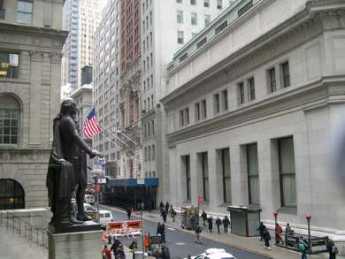
|
| Wall Street |
The performance of mutual investment funds is commonly compared with the stock market as a whole, or some surrogate index of it. The uncomfortable thing is that successful funds grow, and when they get big enough, they just have to resemble the market as a whole. Subtract some fees and expenses, and they are the market. If there is no substantial difference between a managed fund and an unmanaged one, job security for investment managers comes into serious question. You would expect to hear a lot of gallows humor about a situation like that, but in fact, it is largely treated as too painful to mention. Except perhaps, by Quakers.
One highly successful veteran of multiple famous Wall Street boar dooms is not a Quaker, but having spent twelve years in Quaker schools certainly talks like one. His brand of humor has brought many weighty meetings to a halt, and in this case, he has developed what he calls "The Minnesota Investment Standard." The allusion is to the little town that Garrison Keillor made famously, where all of the women are beautiful, and all the children are above average.
"In this remarkable case, however, all the mutual funds seem to perform below average."
Mutual Fund Governance

|
| Mutual Funds |
Unfortunately, mutual funds' main advisory revenue often or even usually comes from selling the fund they work for to corporate pension systems. Although the money belongs to the employees, the choice of fund is usually left to the employer. The revenue of that fund, and hence the revenue of that fund's management adviser firm, is based on the volume of assets; the bigger the fund, the more they all are paid. For the most part, corporation managements can readily change the mutual funds which handle employee pension savings. Consequently, If word gets around that some fund manager often votes the proxies against corporate management in proxy fights, there's ample opportunity for retaliation. So, effective reform of both corporate governance and mutual fund performance seemingly must either exclude corporate management from the selection of employee pension advisers or else from the right to vote the proxies. However, that's too simple. The unspoken bargain is "If you don't criticize our performance (and reimbursement), we won't criticize yours."
A Single International Currency?
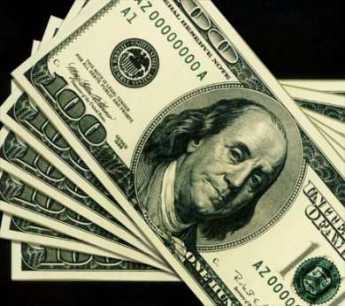
|
| It's Only Paper |
The Economist, printed in London, refers to the United States in its October 17, 2011 edition as the "World's largest currency union", but goes on to state it only became a true currency union in the Presidency of Franklin Roosevelt. That's sort of the case, even though most people suppose Alexander Hamilton unified American monetary affairs with the Compromise of 1790 which among other things traded the nation's capital away from Philadelphia. No, Hamilton only unified the Revolutionary War debts, which to be sure, at that time were the main debts of the new nation. In time, the country and the economy grew in size until our currency was no longer unified because the individual states and banks were legally free to issue their own money. Nicholas Biddle of the Second National Bank had an irritating habit of buying up the circulating currency of a weak bank and presenting it as a bagful to the teller's window. If the bank was really overextended, it then went bankrupt, and other marginal currency-issuers could observe a bitter stress test about printing unreserved paper money. According to The Economist, the main stabilizer was not a migration of money, but the migration of workers. Unemployed people by the many thousand would move to a state or territory with a labor shortage, a solution made practical by the extremely low cost of real estate. In Europe, a far more practical adjustment remains the moving of funds from one state to another, although there is today enough migration across the Mediterranean to demonstrate how disruptive it is to mix extremes of unwelcome language, religion, and culture. In comparing the American and European experiences we thus have two quite different systems to compare, although distinctive conditions often bring out the main issues. The problem of maintaining a common currency union, for example, is hard enough, while the Europeans have the similar but not identical problem of devising a stable one from a large number of different ones.
After three hundred years of fumbling America has perhaps muddled through to a currency union that works. Resting on the fact that most Americans are either debtors or creditors and the rest mostly don't care, the quantity and value of American dollars since 1913 have been negotiated between banking and the U.S. Treasury with the Federal Reserve as umpire. During that last century we have endured two major depressions and a dozen recessions, abandoned the gold standard and fought a number of wars; but the American currency union has never given serious signs of weakness. It would appear that the main problems with currency unions appear at the beginning, in putting them together. After the transition, things appear to get easier. Bank profits are improved by higher interest rates, while all governments, perpetually in debt, want lower ones. Ultimately, of course, the real tension is between the creditors and debtors, but banks and Treasury seem adequate surrogates. Most creditors place trust in the incentives of banks to prevail, debtors trust government; both sides should have learned trickiness in endless negotiations is futile. What was once a battlefield, is now mostly peaceful; these people actually respect each other. Many people may occasionally dislike an outcome, but all acknowledge the tension produces legitimate compromise.
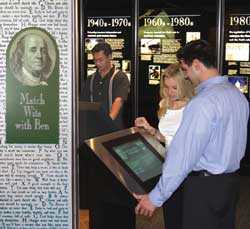
|
| Match Wits with Ben Franklin |
Aside from some "don't ask, don't tell" mystery that somehow compels assent by regions of the country who feel betrayed by agreements their representatives have made, negotiating postures are pretty simple and clear. It is safely assumed the government wants to inflate; all governments have done so for thousands of years. Therefore, the basic Federal Reserve policy of targeting interest rates to restrain inflation is probably a concession to banks. Banks would mostly want the highest rate that does not cause a recession. Debtors do not mind lower rates leading to just a little inflation, hoping to pay off their debts later with cheaper money. Government, acting as an agent for debtors, additionally knows that rampant inflation loses elections and occasionally, as in inter-war Germany and Austria, destroys the middle class. So, with everyone else resisting inflation, debtors must be satisfied with 2% annual inflation. That's arbitrary, reflecting its origin in the haggling process. Inflation-targeting plus two percent; that's the system.
If only there weren't all those other countries in the world. If they inflate or deflate, we could just float our currency exchange rate to maintain international trade; that isn't so bad, although frequent readjustment of prices is a costly nuisance. But if some country freezes its currency at an unrealistic price, speculators will move money around to take advantage. Enter Gresham's Law (commonly expressed as "Bad money drives out the Good".) Gresham's original phrasing is actually apter: "When two currencies of unequal value circulate together, the good currency quickly disappears." So, when truant governments cheat on currency values, well-behaved countries find their own currency getting hoarded. Potentially, that leads to currency shortages, as happened to Argentina when Brazil devalued in 1999. So, countries running an honest currency nevertheless feel pressure to print more; Brazil "exported its inflation" to Argentina. Plenty of wars have been started for less provocation. When something causes that extra money to come out of hiding, there will be spreading inflation, notwithstanding attempts to isolate foreign inflation by the central banks of more responsible nations. Furthermore, runaway inflation can unsettle governments, as it did in the Argentina example, going from one extreme to the opposite. There is thus wide-spread sympathy for currency unions, even though locally independent currencies can sometimes better adjust to local commotions, typically by devaluing the currency and then rejoining the currency union at a more realistic price. The Federal Reserve in our case would be forced to raise interest rates sky high, promptly triggering housing and stock market crashes. So the point returns; if our Federal Reserve system works so well, why can't everybody does the same thing on an international level. In fact, what's the matter with having one big world currency?
Maybe, some say, we could have a World Reserve Bank, issuing a common international currency. What we now have in place is U.S. money serving as a Reserve Currency for the world. The force behind this system is again Gresham's Law, that since we have the strongest currency in the world when it circulates in other countries in the company of weaker local currencies, it quickly "disappears". That is, it is hoarded out of sight until nothing but local money remains visible. Under these circumstances, only the United States with the world's Reserve currency is able to print money without creating inflation. Unfortunately, that implies that if it should ever weaken, it will quickly reappear and flood the host country with inflation, whereupon the host government will ship it all back to enjoy your own inflation, thank you. Thus, being the reserve currency for the whole world allows you to have some inflation and ship it abroad, but if it ever comes back home, there could be a painful disruption. The last time this happened was when the British Pound surrendered the reserve role to the American dollar. It was a bad time for the British economy.
The question periodically arises whether it might be better to use a "basket" of currencies as the reserve against temporary monetary shortages, with the United States trading away some of its free ride on inflation in return for reducing the risk of someday getting it all back at once.
Using a basket of everybody's money as a pool of international reserves might smooth out the tidal waves, but it probably would not create the same stability from tempests we enjoy with the Federal Reserve. If you regard a country's money supply as one big short-term bond, then a basket of currencies is a basket of bonds, issued by a world full of debtors. In that situation, pressure for worldwide inflation is inevitable. In a world with nationalized banks and/or subsidized banking systems, it is hard to imagine any international banking voice without a strong political component. Mandatory contributions of gold bullion might be considered, but it is hard to think of an adequate substitute for the flexibility of adversary tension between permanent creditors and permanent debtors. The situation is not permanently hopeless however, just remote. The enduring risk is that some nations always have more to lose from a collapse of trade than others. Continuing improvement in world economic conditions may one day make a unified world currency feasible. As St. Augustine famously said, "Make me chaste, but not yet."
REFERENCES
| Runaway America: Benjamin Franklin, Slavery, and the American Revolution, David Waldstreicher ISBN-13: 978-0809083152 | Amazon |
Delaware's Court of Chancery
 |
| Chancery |
Georgetown, Delaware is a pretty small town, but it's the county seat so it has a courthouse on the town square, with little roads running off in several directions. The courthouse is surprisingly large and imposing, even more, surprising when you wander through cornfields for miles before you suddenly come upon it. The county seat of most counties has a few stores and amenities, but on one occasion I hunted for a barbershop and couldn't find one in Georgetown. This little town square is just about the last place you would expect to run into Sidney Pottier and all the top executives of Walt Disney. But they were there, all right, because this was where the Delaware Court of Chancery meets; the high and mighty of Hollywood's most exalted firm were having a public squabble.
Only a few states still have a court of Chancery, but little Delaware still has a lot of features resembling the original thirteen colonies in colonial times. The state abolished the whipping post only a few decades ago, but they still have a chancellor. The Chancellor is the state's highest legal officer, and four other judges now need to share his workload, which was almost completely within his sole discretion seventy-five years ago. In fact, the Chancellor usually heard arguments in his own chambers, later writing out his decisions in longhand. The Court of Chancery does not use juries.
Going back to Roman times, the Chancellor was the highest office under the Emperor, and in England, the Lord Chancellor is still the head of the bar in a meaningful way. Sir Francis Bacon was the most distinguished British Chancellor and gave the present shape to a great deal of the present legal system. A court of Chancery is concerned with the legal concept of equity, which is a sense of fairness concerning undeniable problems which do not exactly fit any particular law. The Chancellor is the "Keeper of the King's conscience" concerning obvious wrongs that have no readily obvious remedy. You better be pretty careful who gets appointed to a position like that, with no rules to follow, no supervisor, no jury, dealing with mysterious issues that have no acknowledged solution.
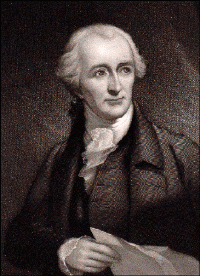 |
| George Read |
Delaware's Court of Chancery evolved in steps, with several changes of the state Constitution over a span of two hundred years. As you might guess, a few powerful chancellors shaped the evolution of the job. Going way back to 1792, Delaware changed its Supreme Court from the design of its Constitution, and George Read was the new Chief Justice. However, it was all a little embarrassing for William Killen, who had been the Chief Justice, getting a little old. Read refused to have Killen dumped, and in this he was joined by John Dickinson, who had been Killen's law clerk. So Killen was made Chancellor, and a court of Chancery was invented to keep him busy.
Under a new 1831 Constitution, the formation of corporations required individual enabling acts by the Legislature and limited their existence to twenty years. However, the 1897 Constitution relaxed those requirements and permitted entities to incorporate under a general corporation law and allowed them to be perpetual. By this time, other states were distributing equity cases to the county level, but Delaware was too small to justify more than a single state-wide Court. That court was attractive to corporations because it could become specialized in corporate matters, but retained a pleasing number of equity cases among common citizens, thus retaining a folksy point of view. In unique situations or those without a significant history of public debate, it was thought especially desirable to strive for unchallenged acceptance of the court's decision.
But other states thought they could see what Delaware was up to. In 1899 the American Law Review contained the view that states were having a race to the bottom, and Delaware was "a little community of truck farmers and clam-diggers . . . determined to get her little, tiny, sweet, round baby hand into the grab-bag of sweet things before it is too late." However, that may be, corporations stampeded to incorporate in the State of Delaware, and the equity of their affairs was decided by the Chancellor of that state. In one seventeen year period of time, the U.S. Supreme Court reversed the decision of the Chancellor only once.
 Chancery's jurisdiction was complementary to that of the courts of common law. It sought to do justice in cases for which there was no adequate remedy at common law.  |
| A. H. Manchester Modern Legal History of England and Wales, 1750-1950 (1980) |
Some legal scholar will have to tell us if it is so, but the direction and moral tone of America's largest industries has apparently been shaped by a small fraternity or perhaps priesthood of tightly related legal families, grimly devoted to their lonely task in rural isolation. The great mover and shaker of the Chancery was Josiah O. Wolcott (1921-1938), the son and father of a three-generation family domination of the court. Most of the other members of the court have very familiar Delaware names, although that is admittedly a common situation in Delaware, especially south of the canal. The peninsula has always been fairly isolated; there are people still alive who can remember when the first highway was built, opening up the region to outsiders. Read the following Chancelleries quotation for a sense of the underlying attitude:
"The majority thus have the power in their hands to impose their will upon the minority in a matter of very vital concern to them. That the source of this power is found in a statute, supplies no reason for clothing it with a superior sanctity, or vesting it with the attributes of tyranny. When the power is sought to be used, therefore, it is competent for anyone who conceives himself aggrieved thereby to invoke the processes of a court of equity for protection against its oppressive exercise. When examined by such a court, if it should appear that the power is used in such a way that it violates any of those fundamental principles which it is the special province of equity to assert and protect, its restraining processes will unhesitatingly issue."
That is a very reassuring viewpoint only when it issues from a person of totally unquestioned integrity, a member of a family that has lived and died in the service of the highest principles of equity and fairness. But to recent graduates of business administration courses in far-off urban centers of greed and striving, it surely sounds quaint and sappy. And many of that sort have found themselves pleading in Georgetown. Just let one of them a bribe, muscle, or sneak into the Chancellor's chair someday, and the country is in peril.
Finances of the Girard Estate
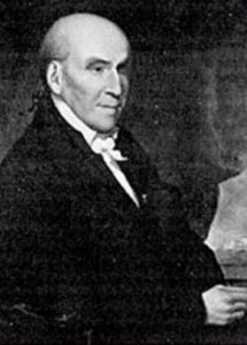
|
| Stephen Girard |
Stephen Girard died on December 26, 1831. It required 7 years for executors to settle the estate of this richest man in America, valued at $7 million, of which $5.25 million was to establish a school for poor white orphan boys. Two million dollars of that was set aside in the will for the construction of his new school. Considerable criticism was raised about the fact that the various administrators of his estate did not admit a single student for the first sixteen years, during which time extensive trustee tours of Europe were conducted to study suitable models and publish books about them. At the end of that time of preparation, the two million dollars were just about all gone. It turns out that Girard could actually afford this luxurious approach. In 1886 the estate would rise in value to $11 million, in 1914 it was worth $30 million. In 1926 it was worth $73 million. This appreciation was in spite of educating more than 10,000 boys, and also purchasing and repaving (with Belgian blocks) both Delaware Avenue and Water Street, from Vine to South Street as a public service to which more than $2 million was devoted. In 1935 Cheesman Herrick wrote a history of Girard College, in which is found the following, rather delicate, history of the long-term financial management by the Board: "The Board of Directors of City Trusts is a creation of the State of Pennsylvania. At the outset in the administration of the Girard will, the city authorities looked to the state Legislature for an empowering act to proceed with the organization of Girard College. The same authority [then] set aside the control of the City councils and put the Girard Estates and Girard College under a new Board which became a part of the machinery of the city government. Probably no more successful administration of public trusts has ever been known than that by the Board of Directors of City Trusts. Time has known the wisdom of Stephen Girard in leaving the administration of his estate as he did. "Colonel Alexander K. McClure, who knew Philadelphia well and who was relentless in his inquiry as to the discharge of trusts by public officials, paid the Board of Directors of City Trusts a deserved compliment in saying that no shadow of doubt or suspicion had ever fallen upon the doing of that body. It may be added further that probably no other government agency or private business enjoys a higher reputation for integrity and efficiency in the conduct of its affairs that does this Board. That this record is good is owing primarily to the standard set by those who have served under the Board in various business and administrative positions.
"When the record of the Board is taken into consideration, and the magnitude of the work which it has to supervise is regarded, one can readily see that service on this Board is a signal distinction. The list of the Board has been a sort of honor roll of Philadelphia's foremost citizens. That the standard in this Board has been so high and that members of the Board have served so faithfully, have been due in no small part to its members' having seen beyond the millions of Stephen Girard, and numerous other funds which they have handled, to the great good which these various trusts are accomplishing. With the interest of the beneficiaries always in mind the Board has conscientiously sought to make the Girard Estate, and the other foundations under its supervision, serve the community to the greatest possible extent. The idea of service has been the touchstone making the Board of Directors of the City of Trusts a great Board." Starting with Nicholas Biddle, the Board of the institution was certainly composed of men who had distinguished themselves in business and finance. However, a great deal of credit must be given to Stephen Girard, himself. A year before he died, he bought roughly 18,000 acres of Schuylkill County after the discovery of coal outcroppings on the property. In subsequent years over a hundred million dollars of anthracite coal were extracted by the mining agents of the Girard Estate, based in Pottsville, PA. The clean-burning properties of this form of coal were promoted with the image of "Phoebe Snow", and were the basis for much of the industrialization of the region. Coal came down the Schuylkill River on canal barges with a terminus opposite the present boathouses, hence the Lighthouse adorning Sedgwick, the most northern boathouse. Later, it was carried on the Reading Railroad, which at one time was the largest railroad in the nation. The Girard heirs felt this went far beyond Girard's contemplated income from the estate, and went to court to obtain for themselves what they considered a more appropriate share of it. Their argument boiled down to saying Girard College had so much money it didn't know what to do with it and was returning income to principal. It was their contention that if Girard could have predicted both the revenue and the expenses of the school, he would have left the school less money, and given more to his numerous heirs. The managers of the estate, who felt their own acumen was largely responsible for the windfall, made a sophisticated and ultimately successful rebuttal. Instead of relying on the contrast between the incredibly good performance of the Board of City Trusts, compared with the earlier looting of the estate by City Council, their lawyer
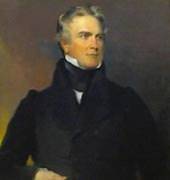
|
| Horace Binney |
(Horace Binney) relied on and largely invented some important legal reasoning. Coal in the ground was a dwindling asset, and speed of its dwindling was under the control of the owners. The managers of Girard's estate had shrewdly transformed the coal into a more conventional source of income by taking proceeds at the best available price, regardless of the needs of the school. With it, they put up office buildings and department stores in the center of Philadelphia on the land around 12th and Market, first intended to be the site of the orphan school. Also, the six hundred acres of Girard's farm in South Philadelphia were converted to rental houses. In time, the income from the coal-bearing properties was transferred to center-city rentals -- all within the bounds of real estate which Girard had purchased before his death. The trustees had enhanced the value of Girard's properties by shifting assets amongst them, a result that greatly benefited the entire city and region, and rendered the entire concept of annual income -- irrelevant. The legalisms of this dispute are very clever, but in truth, the Girard's heirs probably never had a chance in court against the political and business establishment of the whole state, united in the firm belief they were doing a remarkably benevolent thing for orphans. It is breath-taking to reflect that Girard College's anthracite did become the economic pump for the entire Philadelphia industrial region from Pottsville to Trenton, for nearly a century. And equally breathtaking to reflect that, about a century later, anthracite mining just about ceased entirely. Although there was shrewd later management of the assets, the fact is the coal was discovered, purchased and bound up in irrevocable covenants by a single man in 1829, who was therefore dead during every day of this activity, except during the first year when the plan was organized. If he wanted to do this for orphans, it is scarcely possible even to suggest a reason why he shouldn't.
REFERENCES
| Girard College It's Semi Centennial of Girard College: George P. Rupp ASIN: B000TNER1G | Amazon |
IRA ... Individual Retirement Accounts (3)

|
| TSR-80100 |
It wasn't Ronald Reagan on the phone, it was John McClaughry, Senior Policy Adviser. I'm not sure how important you are when you are a Senior Policy Adviser, but it rates you an office in the Executive Office Building that has fireplaces and sofas, conference tables, and -- off in one corner-- a desk. I knew at a glance that we were going to be friends, because his desk had a Radio Shack TRS-80 computer on it, too. Seeing that, emboldened me to stuff my temporary White House identification badge in my pocket, because a guy with a computer in 1980 was certainly a member of the brotherhood, and would get me out of trouble if the guards caught me taking souvenirs. I still have the badge.
John was and is a master networker; maybe that's the job description of a senior policy adviser, I wouldn't know. He knew everybody who had anything to do with health financing, in all the branches of government, including one I hadn't known about, the neighborhood Think Tanks. Everybody is forever passing out business cards to new acquaintances and sweeping them into the left-hand breast pocket in one continuous motion. In Japan, everybody passes out cards but makes a big bowing ceremony of receiving them; what then happens to them in Japan I don't know, but in Washington, they go into Rolodexes and everybody invites everybody to some gathering or other. One evening, I was the entertainment at such a gathering, and have usefully kept up with quite a few people who attended. It's a different atmosphere from some other functions, particularly in the State Department with the other party, where everyone pretends to be meeting you for the very first time when they really aren't.
A few days after our first meeting, John wrote me a short note. Senator Roth of Delaware was pushing something called IRA, or Individual Savings Accounts. Did I think the idea could be applied to health care financing? I suddenly felt as though someone had shoved a stick into my skull and was stirring it around. Of course, just perfect! Add that to a high-deductible or so-called catastrophic health care policy, and out would emerge individually owned health insurance policies, with the same tax shelter as Blue Cross gets, and the added kicker of earning compound interest while you are well, in anticipation of high costs when you are older. It gets rid of pay-as-you-go, it puts an end to "job-lock" and all sorts of other bad things. Perfect.
Because of the difference in our previous backgrounds, I was in a little better position than John was to see how many medical pieces would fall in place if you made this simple provision, which after all was only giving to self-employed people what salaried people had been getting for decades. Yes, it had a small cost, but no more than the amount self-employed people (like doctors) were being cheated out of. We were only asking for a level playing field.
John and I had our project, the Medical Savings Account, and although we kept in touch, we went our separate ways to sell it. John's field was the Republican Party, and mine was the medical profession. It might take a year or two, but the arguments were unassailable.
Opposition to Privatized Social Security
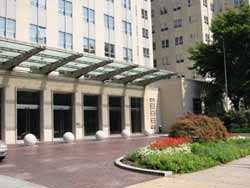
|
| The Brookings Institution |
The counter-attack on personal accounts was instantaneous, vociferous, and distorted. It alleged what was clearly not true ("taking our social security away from us"), and failed to bother about more plausible threats (entitlements like Medicare seem likelier targets of fiscal stringency). There is no history of similar agitation about IRAs. or other tax-sheltered savings incentives of the same model and no claims have been made that such programs have caused problems. This uproar seems to emanate principally from AFL/CIO headquarters in Washington, where Mr. Sweeney seems to be the leader. Labor Unions are spending considerable money and effort to stifle this proposal before it can develop momentum. The Brookings Institution contains people like Henry Aron and Reischauer, who surely understand the true issues involved, but have apparently retreated into silence. What is there about this relatively tame proposal, not particularly useful nor particularly harmful, which threatens the interests of organized Labor?

|
| Teamsters |
With no plausible incentives in sight, we resort to speculation about motives. Either Labor suspects President Bush of devious plans, or has devious plans of its own. The most obvious motive a Republican President might have, and one which is more or less acknowledged, is to "starve the beast", or force reductions in government spending by tax-cutting deficits. However, privatized retirement accounts would not seem to be a very plausible move in that direction.
More likely, Labor has its own interests in the benefits and retirement area that seem threatened by privatized accounts. The notorious retirement fund of the Teamsters is only one example of the long-standing involvement of unions in member benefits. Aside from funds directly controlled by unions, their involvement in Blue Cross boards and negotiations, and their influence on state employee retirement funds has been highly treasured. Workers Compensation is another example of heavy union influence in non-paycheck member compensation. Indeed, it is roughly the case that unions control the employees, while the stockholders control the management. There is imperfect agency in both cases, but until recently it has not been conceivable that unions would dominate corporate directors. But with progressive dispersal of stockholder shareholding and recombination of those voting rights into mutual and pension funds, even the House of Morgan can be seen to appeal to pension fund managers for control of the company. We've turned over a flat stone in corporate governance, and what is crawling out is the source of some concern.
To some extent, the same issue is raised in the Human Resources departments of corporations, constantly exercising delegated control over employees, and constantly in contact with insurance and pension executives of various ranks. Management controls or thinks it controls, two-thirds of employee income, but HR controls the remaining third, spending most of it on insurance plans of one sort or another. At the board level, mutual funds generally lean toward management whenever pension funds raise stockholder rights issues. But index funds and government savings plans could easily induce some subtle changes in sympathies.
It's speculative, of course. But is it possible this is the real battleground, with partial privatization of social security only an opening skirmish?
Put Corporate Raiders to Some Good Use?

|
| Henry G. Manne |
Henry G. Manne just made an interesting proposal for re-setting the balance of power between corporate executives and their bosses, the stockholders. It appeared on the Opinion page of the Sept. 27, 2005 Wall Street Journal. In essence, Mr. Manne, a resident of Naples, Florida and Dean Emeritus of the George Mason University School of Law, suggests we forget about giving stockholders and independent corporate directors more oversight power. Instead, make things easier for corporate raiders, who will be glad to terrify rambunctious executives with a credible threat of having raiders for bosses. It's an interesting thought.
Whoever puts headlines on articles submitted to the
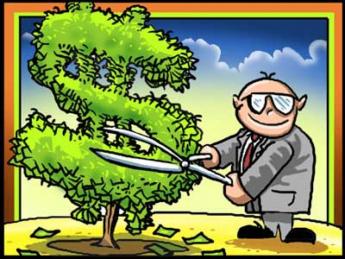
|
| hedge fund |
Journal called this one The Follies of Regulation. We can presume the headline writer prefers corporate raiders to Sarbanes-Oxley, or to the 1968 Williams Act, or a variety of state (read, Delaware) takeover laws, or the Investment Act of 1940, or potential regulatory curbs for Hedge Funds. Although he seemingly agrees with that, Mr. Manne's case is somewhat weakened by having a political spin applied. Regulation isn't the solution, regulation is the problem.
The case is stronger than that, because the main origin of the so-called "Agency Cost" problem appears to lie in the relentless growth in size of international corporations,
to a point where shareholder power is necessarily diluted too thin to be effective. If you exclude founders of corporations and maybe a few families of founders, the dilution of stockholder power has long been an inevitable feature of the dilution of stockholder ownership. If you want their money you must meet their terms, which are overwhelmingly tilted toward passive investing. It's going to get even worse; John Bogle at Vanguard has convinced just about everyone that index investing is the most cost-effective way to invest in equities.
And since the underlying issue is the servant betraying his master (read, Agency Cost), it does not help much for stockholders to ally themselves with new agents.

|
| grease sale |
That would include the managers of Hedge Funds (read, Private Equity), or New York Attorneys General, state employee union presidents, mutual fund managers -- or revolving-door employees of regulatory agencies. There's a rumor around that investment bankers were the ones who first suggested bribing the managers of acquired companies to grease the sale. Where agents of any kind are concerned, particularly elected representatives, you dare not turn your head to spit.
The interesting thing about Mr. Manne's proposal is that his suggestion of trusting the corporate raiders might just work. You can trust them to work hard and play hard, and be utterly remorseless about the poor beleaguered corporate executives, those home town boys who have worked so hard on your behalf. Or who "live like monks, and give all the company's wealth to worthy causes."
Let's hear more specifics about how to do this, and expose them to the anguished howls of those they might injure. The hubub alone would do some good.
Retiring to the Workforce
 Most Americans alive in 2020 will live to be ninety 
|
| Dr. Fisher |
During the Twentieth century, average life expectancy for Americans at birth extended from a little less than age fifty, to a little less than age eighty -- roughly thirty years. Looking ahead to the next century, it's entirely reasonable to expect a cure for cancer and Alzheimer's disease to extend life expectancy to ninety-five. It's also reasonable to expect that somewhere along this path we will find such retirement expectations are more than the nation can afford. Everyone will have to go back to work.
Working ten years longer means ten years less time in retirement, and it also means ten years more time to accumulate sufficient savings for whatever time is left. Some people who are already working more than they want to, won't like that. There will be attempts to make retirement cheaper and to extract savings from novel sources, but further improvements in health care will wipe out all those efforts. The normal age for retirement will have to move to at least age seventy, probably seventy-five. If employers have problems with that, the solution will have to be second careers. So, let's shift our attention to people who are lucky enough to afford a thirty year vacation. They must go back to work, too.
A moment's reflection reveals that everyone must have a life goal of accumulating more money than is needed to live out his life. Once average life expectancy levels out to a stable point, ingenious life insurance design could bring us to the point of spending the last dime on the last day, providing we consider it worthwhile to spend the extra insurance administration cost. More likely, human psychology will always demand a little extra comfort from a little extra financial cushion, and there's a relationship with the age of retirement. The later you retire, the more likely it is you will have money to spare. For physical or mental reasons there will be people who can't work, but everyone else knows a simple solution to the problem of being able to retire: don't stop working until you can afford to quit. And by the way, the later you start saving, the longer before you can quit.
This vision of elderly America thus generates a need to create new jobs for people unable to retire, but the similarly growing number of elderly too infirm to work creates jobs for the advancing number of elderly who need a new career. Some variation of a voucher system will be needed to make this workable.
We have so far not worried much about the lucky, talented, or just miserly few who achieve life's normal goal of saving just a little more than they need; but that must change, they need to go back to work, too. Philanthropy, a very important part of American life, is struggling and needs their talent. It's likely that our business and economic success as a nation is responsible for diverting our energetic and imaginative talent toward the for-profit sector. The general attitude has been that if things are worthwhile, people will pay for them; businesses run not-for-profit can't really be worth much. That's very wrong, of course, but there's enough truth to it to require some changes.
Nonprofit organizations are often inefficient because efficiency is partly the consequence of seeking a profit. But the analysis must not stop with this hopeless truism; the manageable problem is to find new goals for efficiency which do not directly require profit-seeking. One approach would be for non-profits to create for-profit subsidiaries, later selling them off to enhance their endowment. The tax authorities would want to examine this approach to avoid harming competitive tax-paying entities, or sham arrangements in which the purported subsidiary dominates a nonprofit shell.
However, this and similar approaches merely continue the present mindset about the role of the donors and the volunteers. Nonprofit organizations tend to gravitate toward a professional staff with nominal trustee oversight, relegating the donors to the function of giving or getting donations. If philanthropy is to acquire a new drive toward efficiency to supplant the absent profit motive, the donors must be actively employed in the organization, noticing any waste or inefficiency, sharing the gossip, and appreciating the triumphs. To some degree, a form of this model is found in the auxiliaries of hospitals and museums, where staff administrators generally chafe in private about the class distinctions and disruptive ability to cut across management hierarchies. If this system is to work effectively, it needs to be studied for ways to be less threatening to the younger employees, and to get more useful work from the older ones.
Who Watches the Watchmen?
The Latin phrase Quis custodies custodies warns that it's pretty hard to find hired agents you can completely trust. Investing for your retirement, you must be careful to avoid excessive transaction fees to pay your agents and minimize taxes to pay your government to watch your agents, who in turn watch the companies they invest in. Those companies are managed by hired experts, who are selected and overseen by a board of directors. The agents hired by the investors are charged with overseeing this process.
Gradually, the world is coming to accept John Bogle's idea of a market index fund as the best most people can do. Index funds don't even try to tell a good one from a bad one; they just buy them all in proportion to their size (successful companies grow, unsuccessful companies shrivel). Investing in the whole market,an index fund doesn't do much trading, seldom buying or selling. Therefore, it has minimum costs, minimum taxes. As a by-product, it has maximum diversification, hence maximum safety. Low costs and high safety don't automatically give the best performance, except that somehow they do. The Index Fund idea just relentlessly outperforms the vast majority of investment advisers, in both up-markets and down-markets. Investment advisers just hate index funds, bad-mouthing them constantly. But if you buy anything else, you had better have a very good reason to do so. The performance of an index is called beta; outperforming the index is called alpha. The sad truth is that most experts have a negativee alpha.
Well, it's just possible that a second Philadelphia-born idea can do the seemingly impossible task of showing a small but consistently positive alpha. The Pitcairn Foundation was created for his family by John Pitcairn, one of the world's all-time champion investors. About fifteen years ago, the Johnny Appleseed spirit caused the Foundation to open up its investment approach to non-family members; they created a public mutual fund company based on the collective ideas and experiences of the Foundation. John Pitcairn bought the Pittsburgh Plate Glass Company, nurtured it to success as PPG Industries, and then eventually sold it, based on the observation that almost no firms, family owned or otherwise, survive more than seventy-five years. Companies should be bought with the intention to sell them, even though they are managed expertly throughout their existence.
The Pitcairn Foundation observed that continuing dominance by a founding family almost always proved beneficial for the running of the company by hired expert managers. Notice that, while nepotism was often a bad thing in the managers, it could be a useful thing in governance. If you go too far with this idea, of course, you may get into the stifling arrogance of family control in European and Oriental firms. Founding family control keeps the managers from over-paying themselves or worse still, under-working themselves. But outside investors better watch these founding families; if you allow the inevitable minority of worthless family members to pilfer the company, you get the same thing at a different level of control, where it is even harder to fire them. There's a good idea here, but it needs a little extra.
After a great deal of intense scholarly work, it was observed that there are about six hundred major American corporations available for public participation where the founding family maintains control. Even this select group comes in two types. About a quarter of them have no "outside" directors other than the family, and the performance of these companies is about 15% worse than the index, suggesting the dominance of playboy directors. In the remaining group, family members only constituted about half of the outside directors. Now, that group of companies regularly perform 15% better than the index. Guess which type you ought to buy as an investor.
So, now we have the Constellation Pitcairn Family Heritage Fund, open to the public as a no-load mutual fund. Its portfolio consists of fifty-five of those six hundred families dominated companies (with a market capitalization of at least $200 million each), selected by the Pitcairn Financial company, entirely owned by the Pitcairn family. As long as it continues to outperform the index by 150 basis points, you can be fairly confident that the principle of family domination will endure, up and down the line. But not exclusively; somewhere it must be mixed with professional management. The family owns the fund manager, which is run by professionals, who watch the governance of the portfolio components, which are run by professional managers, overseen by founding family members on the corporate board -- themselves overseen by an equal number of non-family independent board members. It's like a Calder mobile, which by the way, is still another Philadelphia idea.
If you are looking to get rich fast, this isn't much of an idea. But since the Family Heritage Fund has consistently outperformed the index by 1.5%, it looks as though the advantage of selecting better corporate governance in the portfolio distinctly outweighs the disadvantage of reduced diversification. Maybe that's all it proves, but most of us poor saps don't even know that much.
Will Tax Cuts Invert the Yield Curve?
For those who just came in, let's explain a normal yield curve, and then an inverted one. In plain English, average interest on short-term bonds is normally smaller than average interest on long-term bonds, so a line drawn between them slopes upwardly. This reflects the reality that the risk of something going wrong is less in a short time than during a long one, so an up-trending yield curve is what emerges when everyone leaves interest rates alone. However the Federal Reserve has for a century adjusted short-term rates according to its view of whether banks should do more or less lending, whether inflation should be encouraged or discouraged, or whether the banking industry needs more or less profitability; sometimes these goals conflict, and sometimes the Fed is merely trying to maintain a stable spread when long term interest rates shift in response to market forces. In average circumstances the marketplace alone controls long term borrowing costs by supply and demand; long term rates are whatever they happen to be. However, Chairman Bernanke has introduced what he calls "Quantitative easing", which is to intervene directly in long term pricing by purchasing and selling long-term bonds. Therefore, the slope of the yield curve can reflect many motives; it's hard to deduce motive from changes in the slope of the yield curve alone. Indeed, suppose it doesn't have much to do with economic forecasting at all. Suppose it just reflects tax cuts.
After all, when federal taxes are reduced, rates can eventually approach the point where bond interest is essentially tax-exempt. Paying more interest, long-term rates are thus normally affected more than short ones by the change. However, a preponderance of U.S. Treasury bonds is now purchased by foreigners who are indifferent to our tax rates. It's clear, however, that cutting taxes will lower bond market interest rates in the general direction of tax-exempts. Although tax reduction is capable of inverting the yield curve, it may no longer do so, and the Federal Reserve may be relieved of lowering short term rates to maintain balance.
If there is anything to this idea, the yield curve might have inverted without a tax cut. That's because a majority of U. S. Government bonds are lately being purchased by Asian governments. The Chinese government doesn't pay U.S. taxes, so to them, all American bonds are tax-exempt. Federal bonds are a little safer than municipal government bonds, so they should command a little lower interest rate, and may eventually depress the yield curve still further.
By this line of reasoning, an inverted yield curve is no longer a reliable portent of trouble, because it no longer primarily reflects American owners of the bonds dumping them. It has some important consequences, however. If interest rates are lower, retired people, insurance companies and pension annuities will be financially worse off. Borrowers, however, will be better off, and within limits, the economy will be favorably stimulated. One can be uneasy about the overall effect on the real estate and insurance markets, and on the temptation to governments to borrow more than they can repay. As different segments of the population are affected differently, the main outcome might well be a political one.
There are, from this example, lots of mixed consequences to be expected from a general readjustment (?reform?) of tax rates. But it shouldn't be a mystery that tax consequences affect yields, yield curves, and politics. That effect may not even be a conundrum.
Marty Feldstein Forecasts the Future
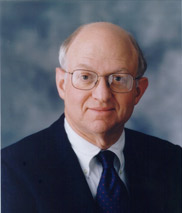
|
| Martin Feldstein |
With increasing frequency, the op-ed pages of the Wall Street Journal are opened to important people or important ideas. On April 28, 2006,Professor Martin Feldstein of Harvard wrote an article which purports to show how it is possible to have the American currency fixed for Americans but float for foreigners. After reading it twice, I conclude he is saying something rather different, and softening some startling announcements with circumlocution. It is my view that he says the following:
Inflation is not a worry; targeting 2% inflation with adjustments in short-term interest rates will take care of it.
International trade deficits need not be a worry, either, if only the Treasury Department (Could he mean nice old John Snow?) would allow the dollar to float on the international market. Not pure floating, of course, because it is a dirty world out there. The necessary dirty floating might hurt at first, especially American global businesses, but the sooner the boil is lanced, the better we will be. American exports of capital goods, consumer goods, and industrial supplies will especially benefit. Those who worry that trade deficits will weaken the dollar have got it backward a weaker dollar will correct the trade deficit. Yes, some people will be hurt by this.
In particular, high-wage countries like Europe, Canada, and Japan will be hurt, possibly severely hurt.
You will be able to tell that this plan has been set in motion when you see an international conference called among low-wage countries. The main purpose will be to reassure them that the U.S. Treasury won't punish them for strengthening their currency.
You will be able to tell this proposal has been rejected, probably for political reasons, if nothing soon happens to soften housing prices. And the word soon is emphasized. Because if they don't soften, they will break.
Medicare/Health Savings Accounts Legislation
Rise and Fall of Life Insurance

|
| Hammurabi Code |
While it is possible to see traces of the origin of insurance all the way back to ancient Mesopotamia, insurance of a currently recognizable form began around 1500, with maritime insurance creating risk pools for ships at sea. Eventually, insuring the life of a ship and ensuring the life of a person did not seem greatly different in principle; sooner or later everyone dies, but in those days sooner or later most ships sank. From the records of such pooling efforts, we can see that a sailor in colonial times had a 40% chance of not returning from a typical voyage. Learning this, some of the plots of Shakespeare's Merchant of Venice becomes more understandable, and the enormous wealth of successful sea captains, privateers, whalers and ship owners seems more justified by the risks they were taking. In retrospect, it seems hard to understand why anyone at all went to sea, thus why it took so long to discover America. Selling maritime insurance was a way to gamble on these risks. You might not get wet, but you were still taking big risks with your money.
Life insurance was a comparatively late arrival on the insurance scene and grew out of the experience with maritime risk pooling. The first life insurance company was the Presbyterian Ministers Fund, a Philadelphia institution if there ever was one. In essence, the church had undertaken to support the widows of ministers. Insurance tailored to the life of each minister, when pooled together, approximated the church's collective widow-support risk. Only ministers were insured by this fund, however. The Insurance Company of North America (now Cigna) seems to have been the first company to sell life insurance to all comers. That's definitely an improvement; limiting the risks to a particular occupation amounts to "adverse risk de-selection", unintentionally excluding, for example, women and blacks. On the other hand, the concept was totally new; no insurance at all would have been attempted if it had been initially impossible to limit the risk.
Insurance has since spread to many other topics, but it remains true that life insurance has one central unique feature. It is absolutely certain the customer will die, the policy will be cashed in. The uncertainty is when it will happen. After a while, it became evident that premiums would be collected until the final date, and could be invested until it happens. When the pool of customers gets large enough, there is almost perfect predictability about the average age at death, so the bigger the company the safer it should be.
There is one great potential weakness in this system, lying in the fact that the person who buys the policy and receives the assurances will not be around to complain about failures of those assurances at the time the policy is cashed in. It takes many years before public trust in such promises overcomes skepticism. The growth of life insurance was therefore slow until the Civil War suddenly demonstrated there were unpredictable risks around. Unfortunately, abuses of the system by fly-by-night companies in the last half of the Nineteenth Century led to heavy government regulation of the industry. Philadelphia's reputation for integrity rapidly expanded its dominance of insurance, but could not prevent the heavy hand of regulation from holding it down, or local taxes from driving it into other jurisdictions. State Insurance commissioners were originally charged with guarding against an insurance company going bankrupt by using unrealistic low prices to attract business. The public interest was redefined to mean low premiums, by the obscure but effective method of legally shifting the debts of a bankrupt insurer onto its surviving competitors -- neither the public nor the Legislature had to worry about it any further. In the insurance capital of the country, stockholder returns and executive salaries gradually went from too fat to too thin. Insurance companies, one by one, moved to other states or at least to other counties. It is now possible to wander through the abandoned executive suites on the top floors of the former insurance palaces and feel as though you were at Luxor, wandering through the abandoned Egyptian temples of Karnak.
To be fair about it, it is also possible to have a real estate agent take you through the former estates of life insurance entrepreneurs whose business practices amply justified some regulatory over-reaction. Plenty of old retired lawyers will be glad to tell you of the times they wrote new insurance laws for their insurance client, who just forwarded them to Harrisburg for enactment -- before the Second World War. But the destruction of this industry does no one any good, and it is surely fair to argue that excessive profits were the lesser of the two evils.
Setting the regulatory risk to one side, the life expectancy of Americans has dramatically lengthened in the past century, nearly eight years in the past fifty years. Such unpredictable reduction of risk ought to lead to increased profitability for the insurer, but it also leads the public to shift to less profitable term insurance. The young buyer can see a period of several decades of dependent children, followed by a long period of life when the death of the breadwinner is less tragic. I needed, living too long becomes a modern new concern, the outliving of accumulated savings. When the investment manager of the insurance e company is faced with a choice of more investment safety or greater investment return, he must produce a combination of both, an impossible assignment. And so, insurance business drops off as clients wander away toward more glowing promises, or at least toward promises unconstrained by the growls of a consumer-driven insurance commissioner. During the Great Depression of the 1930s, only two life insurance companies went bankrupt, so at least the old way of running these companies produced safety. The 1930s now seem a long time ago.
Supply-Side Tax Cuts

|
| Dollar Sign |
Some tax cuts are good, some are bad. Aside from the political truth that cutting my taxes is always better than cutting yours, there's the question of timing. Tax cuts are usually inflationary, so there are times when they should all be resisted. Taxes on some things are disincentives; that's been the argument for taxing cigarettes and liquor, maybe it is now an argument for raising gasoline taxes. But the argument for lowering taxes on capital gains and dividends is far more mysterious. It's supply-side economics, and absolutely no one knows what that means, right? Lately, it has come to mean that taxes don't just change revenue, they may change behavior.
The place to start is to recollect that the dividends on state and municipal bonds are exempt from federal taxes. Tax-exempts have a lower interest rate than similar bonds issued by corporations, or the federal government because such tax-free income is often greater for the purchaser than taxable dividends, net of taxes. But forget about the purchaser for a minute. The state or the local government gets enabled to borrow money at a lower interest rate. That's the supply side talking.
So, although it passes through extra steps, corporations would find it cheaper to issue bonds if the customer paid less income tax on the bond dividends. Not only does the issuing corporation get an interest-rate reduction, but all other corporations also do too, as the prevailing cost of capital is lowered. There's even an enticement for economic nationalists: only American bond-buyers get an American tax reduction. And all this is true whether you lower the rate from 25% tax to 15%, or eliminate taxes entirely. Corporations get an incentive to borrow more money, which we all pray they will use wisely so good things will happen to jobs and the economy. It's known as lowering the cost of capital.
It doesn't make a bit of difference whether the taxpayer who "gets" the tax cut is rich or poor, and in that sense, the argument for doing it isn't political. But in another sense, it may be. State and local governments are already getting cheaper capital, so we have in the past created an artificial incentive for them which disappears if everyone else gets it, too. There's a large segment of the country that believes the country would be better off with less government, based on efficiency, economics, and yes, political grounds. And there is another segment, heated up by the political spin, which believes that if rich people get any benefit at all, it must be harmful to others.
It is plainly true that all generalizations do not apply to every kind of tax at the same time. Right now, it would seem likely that the largest boost to the economy would come from lowering corporation taxes because there are people who just plain don't like big companies, and are therefore willing to shoot themselves in the foot with unemployment. When Ireland lowered corporate taxes to 12.5%, the resulting boom was so unexpectedly frothy it got out of hand. So maybe the boys in the Temple Bar were right -- don't give them nuthin'.
The Economic Power of Laws
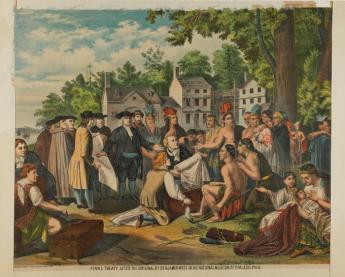
|
| William Penn Treaty |
Philadelphia is tucked down in the Southeast corner of Pennsylvania, right next to Delaware and New Jersey. All three states once belonged to William Penn and started out Quaker dominated. In time, they settled down to a life of independent states, and with the growth of population plus speed of transportation, they are all getting smudged together again. The Quaker influence is there if you look for it, and rather fierce, even hostile, political competition between the states is there, too. But if you were a foreign visitor who doesn't look at maps, you could drive around the metropolitan area without knowing which state you were in. To a large extent, the Rand-McNally lines are a hindrance to commerce and convenience, but they have their value. The quirks of political jurisdiction give the Philadelphia metropolitan area six U.S. senators, and the opportunity to take shrewd advantage of the three legal systems. You can buy things without a sales tax in Delaware, and estate tax lawyers tell me that if you must die, die in Delaware. At one time, New Jersey was a great place to get an uncontested divorce, Pennsylvania a better place to start an unincorporated business. More recently, the New Jersey doctors are complaining that malpractice rates are unbearable, but they are not as bad as they are in Pennsylvania, and it is rapidly becoming true that if you are going to be born, you will need to be born in New Jersey because the obstetricians have all moved there. That's also true in the District of Columbia; obstetrics has just about entirely fled to Virginia. Better watch out where you have your auto accidents, too. Neurosurgeons and orthopedists have also responded to the local disincentives to live near certain types of juries.
Long ago, James Madison designed things this way on purpose. The main author of our constitution hated taxes and oppressive government as much as any other founding father and argued it was a good thing to let neighboring states have differing laws. Corporations which do interstate business hate the complexity of course, but as Madison argued, people do shift their business, their businesses, and even their residence if the neighboring states become too extreme in their differences. It's still worth a thirty-minute drive to buy silverware and China in Delaware, and if you are driving to the New Jersey shore, you ought to fill up your gas tank on the Jersey side of the bridge. At one time, there was a thriving resort town in the Jersey woods, mostly entertaining people who needed a spell of New Jersey residence to be eligible for New Jersey divorces.
These things respond to local circumstances fairly rapidly. I once met a man from the Delaware Chamber of Commerce who boasted that the Chamber could get a Delaware law changed over a weekend if it had some particular commercial advantage. Governor du Pont saw the bigger advantages of this flexibility and got some laws enacted which drew most of the big credit card companies to Delaware, and at least a branch of all the big national banks. Delaware is starting to emulate Lichtenstein , and fairly successfully.
The effect on Philadelphia banking has been disastrous. Once the banking center of the whole continent, Philadelphia now does not have the headquarters of a single major bank. True, banking is becoming an obsolete industry whose products no one really wants, but the particularly severe effect in Philadelphia comes from the fact that if you were going to have a big bank in the metropolitan area, you would have it in Delaware.
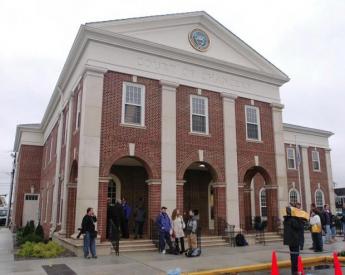
|
| Delaware Courts |
The location of so many corporate headquarters in the little state attracts lots of outside lawyers, of course, and it puts a heavy burden on Delaware Court of Chancery, the court for corporate disputes. The judges are appointed by the governor, and it doesn't take all that much outside money to lean on the governor, so the nation's giant corporations are at the mercy of a very small group of local politicians. The politicians, on the other hand, operate freely in an environment where comparatively few of their constituents have any interest in the goings-on of major corporations from far away.
It's an interesting thing that the legislatures of all three formerly Quaker states are torn with sectional disputes. In Pennsylvania and Delaware, it's the cities against the farmers. In New Jersey, it's the North versus the South. All states are having a hard time balancing their budgets in a recession, but somehow New Jersey has worse deficits than the others, and therefore more quarrels about taxes. The northern politicians dominate the legislature, and the south feels it is often the victim of state laws designed to help the North in its constant war with New York City. Ever since 9/11, the financial district of New York has been sending its subsidiary employees to safer cheaper regions. That might have meant going to New Jersey, but the tax flounderings there have led to many of those relocations going on a few miles to upstate Pennsylvania. You don't ordinarily think of Scranton as a financial center, but take another look. Madison, no doubt, would smile at the tendency, but wrinkle his brow at all the unintended consequences. At least, everyone in the region speaks English more or less, otherwise, the European Common Market could learn a lot from studying our local scene. About fifteen years ago, there was actually an unsuccessful provision on the ballot for South Jersey to secede.
Tulips, Jay Cooke, and Google

|
| Google Logo |
The majority of flowers for sale in any flower shop in the world come from Holland. These highly perishable items are air shipped to the florists, and the pricing of flowers must be quickly individualized according to their condition, quality, and market variables. This is how it is done: carts of fresh flowers are wheeled into an auction room, priced and sold, and wheeled out to the trucks of distributors, within fifteen minutes of arrival. You can almost hear the airplane engines starting up as they arrive at the auction. The Auction itself is held in a large amphitheater, with every seat equipped with a little computer terminal. The buyers identify themselves on the keyboard and sit there with a finger poised over the action key. Directly in front of the audience is what looks like a 20-foot clock, marked off with prices around the dial. As the cart of flowers is wheeled in, the pointer on the dial starts to revolve, and the buyers, who have keyed in how many dozen they want to buy, strike the action key as the pointer passes by the price they are willing to pay. The prices go from high to lower, and the pointer keeps moving lower until all of the shipment is bought; sometimes no one bids, and they do it again. The atmosphere is much like a church bingo game. If you think about this Dutch auction process a minute, you see that it extracts the highest price, the last guilder, the collective audience is willing to pay. A search of the subject on Google fails to reveal whether they were using the Dutch auction process when Holland had the famous tulip bulb mania of 1636.
The IPO process this Dutch auction is supposed to replace was brought to its present form by the Philadelphia financier Jay Cooke. As you might expect, all the other tycoons hated Cooke for upsetting their apple cart, and there was much rejoicing when Cooke went bankrupt in the panic of 1873. He didn't die until 1905, and the joke was that his funeral was well attended by people who wanted to be real sure he was dead.
Cooke's opportunity came when the Federal government failed utterly in selling U.S. bonds to finance the Civil War. Cooke persuaded the Secretary of the Treasury (Salmon Chase) to let him sell the bonds for a commission. He was given the right to sell $500 million of the bonds, and by hiring 2500 sub-agents to go beat the bushes, he actually sold $11 million more than that. Oversubscribed. Cooke instructed his agents to forget about the bankers and tycoons, and go to the small towns, instead. Part of the process was to give a patriotic sales pitch to the editor of the local newspaper. Later in the war, Cooke repeated this process for a sale of $830 million more. From that point forward, one of the main things an investment banker does for his client is to provide a distribution network. If the distribution is successful, this process, too, will produce the highest possible price for the seller. If it fails to sell all the goods on the first offering, well, the price has to be reduced to clear the market. The incentives for the investment banker are therefore structured to reward success, and penalize failure. If you can't do it well, don't touch it at all.
Is it any surprise that you've been reading a lot about this coming IPO, for at least six months, in your local paper? By the way, Cooke later invested in a Utah silver mine and got rich again. A pious man, he donated his house in Ogontz as the site of the Ogontz School for Girls.
After the Convention:Hamilton and Madison
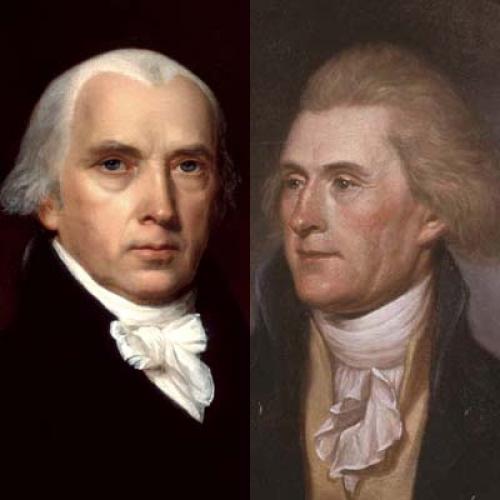
|
| Signers |
The Federalist Papers were written by three founding fathers after the Constitution had been completed and adopted by the Convention. Detecting hesitation in New York, the aim was for publication in New York newspapers to persuade that wavering State to ratify the proposal. It is natural that The Federalist was composed of arguments most persuasive to New York, putting less stress on matters of concern to other national regions. This narrow focus may explain the close cooperation of Hamilton and Madison, who must surely have suppressed some latent concerns in order to present a unified position. In view of how much emphasis the courts have placed on the original intent of almost every word in the Constitution, it seems a pity that no one has attempted to reconcile the words of the principal explanatory documents with the hostile disagreements of their two main authors, almost as soon as the Constitution came into action. Perhaps the psychological hangups would be more convincingly dissected by playwrights and poets, than historians.
John Jay wrote five of the essays, mostly concerned with foreign relations; his presence here highlights the historical likelihood that Jay might have been the one who first voiced the idea of replacing the Articles of Confederation. At least, he seems to have been first to carry the idea of a general convention for that purpose to George Washington (in a March 1786 letter). The remaining essays of The Federalist were written under the pen name of Publius by Alexander Hamilton and James Madison, both of whom had a strong enough hand in crafting the Constitution, but who quickly became absolutely dominant figures in the two central political factions after the Constitution was actually in operation. And their eagerness to be central is itself telling. They were passing from a stage of pleasing George Washington with his favorite project, into furthering a platform for launching their own emerging agendas. It is true that Madison's Federalist essays were mainly concerned with relations between the several states, while Hamilton concentrated on the powers of the various branches of government. As matters evolved, Hamilton soon displayed a sharper focus on building a powerful nation; Madison scarcely looked beyond the strategies of internal political power except to see clearly that Hamilton was going to get in the way. These two areas are not necessarily incompatible. But it is nevertheless striking that two such relentlessly driven men could work together to achieve the same set of rules for the game they were about to play so unflinchingly. Thomas Jefferson had been in France during the Constitutional Convention. It was he who was most dissatisfied with the resulting concentration of power in the Executive Branch, but Madison eagerly became the most active agent for forming the anti-Federalist party, with all its hints that Washington was too senile to know the difference between a President and a King. Washington abruptly cut him off and never spoke to Madison after the drift of his opinions became undeniable. Today, it is common to slur politicians for pandering to lobbyists and special interests, but that presents only weak competition with the personal forces shaping leadership opinion, chief among them being loyalty to, and perceived disloyalty from, close political associates.
As a curious thing, both Hamilton and Madison were short and elfin, and both relied for influence heavily on their ability to influence the mind of
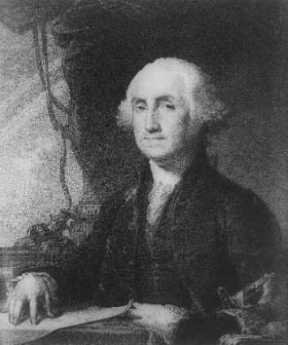
|
| George Washington |
George Washington, who projected the power and manner of a large formidable athlete. Washington had no strong inclination to run things and, once elected, no particular agenda except to preside in a way that would meet general approval. He had mainly wanted a new form of government so the country could defend itself, and pay its soldiers. Madison was a scholar of political history and a master manipulator of legislative bodies, while Hamilton's role was to supply practically unlimited administrative energy. Washington was good at positioning himself as the decider of everything important; somehow, everybody needed his approval. On the other hand, both Madison and Hamilton were immensely ambitious and needed Washington's approval. This system of puppy dogs bringing the Master a bone worked for a long while, and then it stopped working. Washington was very displeased.
The difference between these two short men immediately appeared in the way they chose a role to play. Madison the Virginian chose to dominate the legislative process as the leader of the largest state delegation within the

|
| Alexander Hamilton |
House of Representatives, in those days the dominant legislative chamber. Hamilton sought to be Secretary of the Treasury, in those days the largest and most powerful department of the executive branch. It's now a familiar pattern: one wanted to form policy through dominating the board of directors, while the manager wanted to run things his way, even if that led in a different direction. Both of them knew they were setting the pattern for the future, and each of them pushed his ideas as far as they would go. Essentially, this could go on until Washington roused himself.
After a short time in office, Hamilton wrote four historic papers about two general goals: a modern financial system, and a modern economy. For the first goal, he wanted a dominant national currency with mint to produce it and a bank to control it. Second, he also wanted the country to switch from an agricultural base to a manufacturing one. You could even say he really wanted only one thing, a national switch to manufacturing, with the necessary financial apparatus to support it. Essentially, Hamilton was the first influential American to recognize the power of the Industrial Revolution which began in England at much the same time as the American Revolution. Hamilton was swept up in dreams of its potential for America, and while puzzled -- as we continue to be today -- about some of its sources, became convinced that the secrets lay in the economic theories of
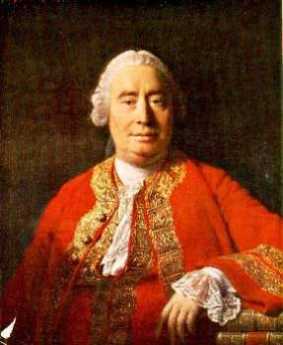
|
| David Hume |
David Hume and Adam Smith in Scotland, and of Necker in France. Impetuous Hamilton saw that Time was the essence of opportunity; we quickly needed to gather the war debts of the various states into the national treasury, we quickly needed a bank to hold them, and a mint to make more money quickly as liquidity was needed. It seemed childishly obvious to an impatient Hamilton that manufacturing had a larger profit margin than agricultural products did; it was obvious, absolutely obvious, that this approach would inspire huge wealth for the new nation.

|
| Industrial Revolution |
Well, to someone like Madison who was incredulous that any gentleman would think manufacturing was a respectable way of life, what was truly obvious was that Hamilton must be grabbing control of the nation's money to put it all under his own control. He must want to be king; we had just got rid of kings. Furthermore, Hamilton was all over the place with schemes and deals; you can't trust such a person. In fact, it takes a schemer to know another schemer at sight, even when the nature of the scheme was unclear. Madison and Jefferson couldn't understand how anyone could look at the vast expanses of the open continent stretching to the Pacific without recognizing in this must lie the nation's true destiny. Why would you fiddle with pots and pans when with the same effort and daring you could rule a plantation and watch it bloom? If anyone had used modern business jargon like "Win, win strategy", the Virginian might well have snorted back, "When you say that to me, friend, smile."
Reflections on Swensen
A. Techniques of rebalancing. Three directions to take this, occur to me.
1. Purchase 60/40 mutual funds and let them do the rebalancing. This would offhand seem the easiest way to do it, but what are the results? Do you think it would be practical to construct a 60/40 mutual fund by combining and rebalancing a world-wide index fund with a bond fund? Since bond funds are dubious, how about a mutual fund that contained the equity index fund and did its own bond juggling? How about a family of funds, mixing 50/50, 55/45, 60/40, 65/35, 70/30, 75/25. 80/20, as the investor chooses? Since this would probably amount to a pool that sold virtual shares, almost any combination seems feasible. But is it legal? At one time the fund of funds was illegal for whatever reason; possibly Vanguard has a right to object to such secondary use of its funds. By getting a fund together, there should be enough volume to consider real-time rebalancing. When you consider doing it for yourself, the fund approach seems increasingly attractive.
2. Establish two brokerage accounts at Vanguard, one for equities and one for bonds, each of which is linked to its own separate money market sweep fund. Monthly rebalancing should be possible from the monthly statement, with the money market of one account purchasing shares of the other asset class as needed for rebalancing. A refinement of this might be to purchase shares of the "wrong" account and hold them until the capital-gains period has expired, then transfer to the "correct" account. I presume that transfers between two money-market accounts would be fairly simple, avoiding the perplexities of buying shares with one account but depositing them in another. Adjusting the order to reinvest dividends or not reinvest seems like a nice refinement, lessening the need to sell things.
3. Doing the whole business in Quicken. If you are thinking of doing this for clients, you might want to avoid the hazards of actually doing the transactions, simply sending the client a set of suggested monthly instructions to give to his broker or transact electronically. This might seem attractive to people running trust funds, who already carry the fiduciary hazard.
B. Selecting or deselecting, those companies who regularly rebalance their own debt/equity ratios. One of the important insights I get from Swensen is that company treasurers are often rebalancing in the opposite direction from the investors. That is, issuing more stock as their price/earnings ratio gets ridiculously high, buying back their stock when the price gets cheap. Not all companies do this, and those who do probably reduce their volatility considerably. If this is a really major reason for investors to rebalance in the other direction, then there may be a considerably reduced value in rebalancing companies that are doing it for you, and enhanced value in rebalancing the rest.
1. Since you don't know the intentions of a company, and anyway they may change treasurers without your knowledge, there is a need to find some surrogate for this activity. That's particularly true of companies that may only do it in one direction, and thereby alter the balance between raising equity capital and borrowing. Does the p/e ratio seem adequate to you as a surrogate? If not, is there a practical alternative?
2. I've been told that small companies borrow from banks, large companies issue bonds. Is this of any practical value to an investor? Are they a distinct asset class? After all, you can change your debt/equity ratio by adjusting either component, or you can reduce your total external capital requirement by using internally generated funds. Does this issue get you anywhere in selecting asset classes?
3. Companies or asset classes with a lot of volatility apparently give Swensen an opportunity to rebalance profitably. Aside from that, it is better for a company to have low volatility or high? If all companies got religion and did their own rebalancing, would there be any value in investors continuing to do it? To put it another way, just where is the value added by rebalancing? What signs would you look for, to decide that rebalancing is no longer cost effective?
C. Life insurance to reduce taxation. The October 18, 2006, Wall Street Journal observes that the IRS has issued clarifying instructions about using life insurance to reduce taxation; it also goes on to say that lawyers will charge you $10-20,000 to read them to you. But, apparently, it's ok to do this if you follow the rules. Essentially, life insurance investments compound internally without taxation and also escape estate taxes if you donate ownership of the policy to your heirs.
1. In the case of a spousal trust, the estate taxes are already waived, so one complexity is reduced or eliminated. There is no need to transfer ownership of the policy.
2. So the issue reduces itself to avoiding dividend and capital gains taxation, short and long. I gather they have not thought of the requirement to distribute all income from a spousal trust, so there is a chance some agent would balk at the technicality.
3. So, except for this risk, it's a simple trade-off between the fees for insurance versus the taxes saved, and I strongly suspect the fees are worse, so the issue isn't worth considering at all. But of course I don't know what the fees are, so I don't know the threshold level where tax avoidance becomes an important asset. Even the health issue is semi-answered since you could escape a physical exam by selecting an annuity life insurance; more fees to overcome, of course.
D The same Wall Street Journal includes a quotation from unknown research that calculating the dollar value weighting of mutual funds versus fund results demonstrates that all reasons for not buying-and-holding combined show a 1.5% penalty for all strategies other than buy/hold.
1. Therefore, the 0.5% advantage of rebalancing over buy/hold is actually a 2.0% advantage over the penalty for deviating. That's a more substantial argument that has so far been made for rebalancing, but needs to be re-examined to be sure the penalty is not actually hidden in the 0.5% claim, since if so that would convert it into a 1% loser strategy.
2. For no visible reason, broker-handled funds average 0.5% lower return than direct-buy funds. May I suggest some hidden kick-back has surfaced?
3. Low-volatility stocks seem to produce an 0.8% advantage over high-volatility stocks and a shocking 2.8% difference on a dollar-weighted basis, suggesting volatility makes investors lose their nerve in addition to the innately inferior performance. Is it reasonable to give them a neutral weighting in a portfolio?
BEA Monitors the Economy

|
| Global Interdependence Center |
The Global Interdependence Center meets at the Philadelphia Federal Reserve, organizing frequent seminars of outstanding quality about finance. This week, the speaker was Andrew Hodge, head of Profits Research, U.S. Department of Commerce, Bureau of Economic Analysis. Someone there once had the brilliant idea that aggregate national income was almost identical to Gross Domestic Product, so national income could be easily derived from tax information at the I.R.S. Originally probably seen as a way of verifying GDP statistics derived in other ways, aggregated income and profits look in some ways to be superior to the data coming from Wall Street earnings reports. As a leading indicator, it appears to be outstandingly effective in predicting an impending upswing in the business cycle, just about at the time everyone is getting discouraged about downswings. It's not so good at predicting market peaks.
Seems to be superior to Wall Street earnings reports in four ways. 1) Wall Street is not particularly useful in distinguishing domestic from foreign activity within multinational firms. 2) Wall Street reports generally attempt to avoid seasonality noise by comparing this month with this-month-last- year. If the market direction has changed during the past year, downswings may cancel upswings and such comparisons can be misleading. 3) at market inflection points, volatility gets exaggerated by firms going out of business at the bottom or businesses formed or expanded at the top. 4) Wall Street is only 40% of the economy. The other 60% has private ownership, particularly in S-corporations.
Out of studying the differences between the two types of statistics about the economy, it emerges that the tax-derived BEA statistics are quite good leading indicators, particularly when the economy is in a trough. They are sort of leading indicators of coming market peaks as well, but they lead by longer intervals. A lead of as long as a year isn't very useful as an indicator.
As the jargon goes, that's the take-home message. BEA data is pretty good at predicting market bottoms. But some interesting sidelights appear, as well.
Our economy is becoming less volatile, with milder cycles and less frequent ones. But national income is just as volatile as ever, particularly in stock prices. This would appear to be due to the steadily increasing proportion which is in the financial sector (or decreasing proportion in the manufacturing sector). The financial sector is characterized, worldwide and for a long time in the past, as having "sticky" wages and costs. With the cost side comparatively inert, profits become much more volatile. In the final analysis, the stock market becomes more volatile than the underlying economy.
A final conclusion is my own. If the best personal investment vehicle is a broad index fund representing the whole economy, then you had better be watching national statistics like the BEA, rather than sector statistics. At the moment, the problem is deciphering what's available on BEA.gov in tabular rather than graphics format.
Big Pharma Loses Momentum
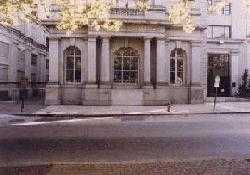
|
| Chemical Heritage Building |
listened to the analysis by G. Steven Burrill, a noted venture capitalist who specializes in this area. The big firms, like Merck, Wyeth, Johnson and Johnson have recently reported disappointing earnings, and it seems they have been reducing their American research divisions, with more use of small niche research firms as subcontractors, both American and foreign. As they tend to reduce their emphasis on research and manufacturing, Steve Burrill feels they will concentrate mainly on marketing. That sounds like good news for Wyeth, with its traditional focus on marketing, and bad news for Merck, which has always been strong in new product development.
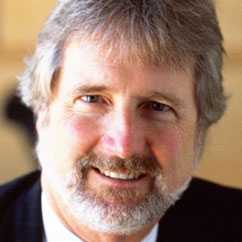
|
| G. Steven Burrill |
Burrill also has his eye on the statistic that only 8% of health care spending is devoted to pharmaceuticals, while 40% is spent on nostrums to promote wellness. The sly observation slipped out that if 40% of health spending goes for products of questionable value, just think how big the market would be for new products that really do promote some wellness. So that, in his opinion, is where investors will prosper.
Some of us in the back of the room were troubled by these thoughts. In the first place, the major drug houses have long operated with a financial business plan that takes profits from old established drugs and uses them to pay for research on the new drugs of the future. Small niche companies, that only work on one phase of this cycle, have had difficulty financing expansion and mostly accepted a subsidiary role. You might develop a wonder drug in your garage, but you had to license it to a big pharma concern in order to thrive. The thought pops up that the protracted wait for

|
| PA Drug Industry |
Food and Drug approval might be stretching the old-drug/new-drug interval to the point where patent expiration on the current revenue generators interrupts the internal recycling of profits into new drug research. That's been a threat ever since the passage of the Kefauver Amendment, but a new twist has appeared in the form of a tidal wave of cheap liquidity from the Far East, working its way into venture capital pools and assisting the niche firms with their historical shortages of capital. If that's a significant feature of the present environment, it could fizzle out when the Far East stops pumping liquidity into world markets. A new Premier of Japan might be all it would take, or else a drop in the price of oil. Japan's interest rates are now held below 1%, while a realistic price for oil is $45 a barrel, not $65.
And as far as the promotion of wellness is concerned, that concept might just turn out to be a fad. Congress doesn't try to evaluate scientific trends, but it is very fond of insisting that "if it ain't broke, don't fix it". A major advance in the treatment of cancer and or Alzheimer's Disease might very well dampen Congressional enthusiasm for spending 15% of Gross Domestic Product on what's then left to treat, which would mostly be wellness.
Quaker Gray Turns Quaker Green

|
| American Friends Service Committee Logo |
Miriam Fisher Schaefer, at one time the Chief Financial Officer of the American Friends Service Committee, had to cope with the economics of renovating the business headquarters complex for various central Quaker organizations. They're housed in a red-brick building complex, naturally, located on North 15th Street right next to the Municipal Services Building of the Philadelphia City Hall complex. The original building within the complex is the Race Street Meetinghouse, funds for which were originally raised by Lucretia Mott. The Quakers needed to expand and renovate their offices, a nine million dollar project. Miriam, a CPA, calculated that the job could be made completely environment-friendly for an extra $3 million. The extra 25% construction cost explains why very few buildings are as energy-efficient as they easily could be. However, in the long run, a "green" building eventually proves to be considerably cheaper. Not only would a green Quaker headquarters be a highly visible "witness" to environmental improvement, but it would also pay for itself in reduced expenses after about eight years. That is, if friends of the environment would provide $3 million in after-tax contributions, they would provide a highly visible example to the world, and reduce the running expenses of the Quaker center by a quarter of a million a year, indefinitely. Effectively, this is a charitable donation with a permanent tax-free investment return of 12%, quite nicely within the Quaker tradition of doing well while doing good.
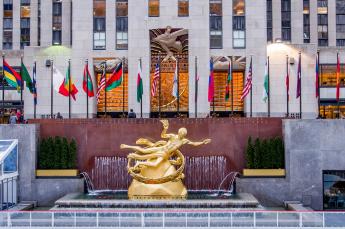
|
| Rockefeller Center |
Energy efficiency isn't one big thing, it is a lot of little things. If you dig a well deep enough, its water will have a temperature of 55 degrees, and only require heating up another 15 degrees to be comfortable in winter, or cooling down thirty degrees to be comfortable in the summer; that's described as a heat pump. Then, if you plant sedum, a hardy desert succulent plant, on the roof it will insulate the building, slow down rainwater runoff, and probably never have to be replaced. Rockefeller Center, you might be interested to learn, has a "green roof" of this sort, which has so far lasted seventy years without replacement. The Race Street Meetinghouse was built in 1854 and has so far had many roof replacements, each of which created a minor financial crisis when the need suddenly arose.
The ecology preservation movement is full of other great ideas for city buildings because buildings --through their heating, ventilating and air conditioning -- contribute more carbon pollution to the atmosphere than cars do. For another example, fifty percent of the contents of landfills originate in dumpsters taking construction trash away from building sites. What mainly stands in the way of more recycling of such trash is the extra expense of sorting out the ingredients. Catching rainwater runoff allows its reuse in toilets, eliminating the need to chlorinate it, meter it, and transport it from the rivers. And so forth; you can expect to hear about this sort of thing with great regularity now that the Quakers have got stirred up. You could save a lot of air conditioning cost by painting your roof white. At first, that would look funny. But do you suppose oddness would bother the Society of Friends for one instant? No, and you can expect them to make it popular, in time. People at first generally hate to look funny, but with the passage of time they grow to like looking intelligent.
A lot of people want to save the planet. So do the Quakers, but they have come to the view that the public is more easily persuaded to save money.
Immigration
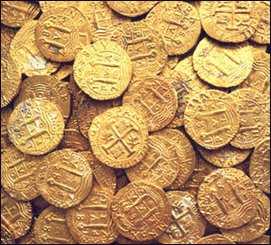
|
| Gold |
We're alluding indirectly to immigration as a general topic in this article because sooner or later every discussion of every aspect of immigration adds a claim of "fairness" to the balance. In this case, plain talk about fleecing peasants first requires the definition of an unfamiliar term. Seigniorage, also spelled seignorage, or seigneurage, originally only denoted a fee which governments charged for milling coins out of precious metal. Developing nations often didn't have the necessary technology, so they paid some other country to do it for them. That was fair enough, but soon "trimmers" would shave the side or surface of coins and gather up the dust for sale. That practice led to clever serration of the formerly flat edges, much simpler than weighing coins to detect cheats.
In time, improved printing techniques allowed governments to keep precious metal in vaults and issue paper currency, some of which inevitably got burned, shredded or lost. Since the issuing government could then keep the whole value of lost currency minus printing costs for itself, the term seigniorage evolved to include this more lucrative method for governments to cheat citizens, abusing their monopoly on the currency issue. There might seem to be some temptation for governments to print money on fragile paper, except it is overbalanced by the need to make it hard to counterfeit. Happily, this sort of seigniorage always seemed less offensive because everybody agrees that if you have money in your pocket, shame on you if you lose it. As transactions become more sophisticated, however, some innovative modern arrangements which loosely fit the definition of seigniorage become a new source of moral dismay. One facet of currency razzle dazzle concerns immigration, which is itself always a contentious matter.

|
| Spanish |
Right now, it is authoritatively estimated that the Social Security program has collected half a trillion dollars in Social Security and Medicare taxes, whose rightful owner is impossible to determine. Some of the beneficiaries may have died without claiming the money, so some of this topic might be classified as escheat, or abandoned by the owner. But very likely the bulk of this money, under modern circumstances, was withheld from illegal immigrants by their employers, either without their knowledge or using counterfeit social security numbers; and the fugitive status of the owners made them reluctant to claim it. Half a trillion is five hundred billion dollars.
This sort of discovery leads to some troublesome thoughts. If the immigrants are legal, or if now illegal may receive amnesty, they will be fully eligible for social security benefits. You might say they earned such benefits, but our tormented public pension system is in fact almost entirely funded by one generation funding its parents' generation. That borrowing between generations means paying for it later, so of course, it enjoys the politician spin-term of "pay as you go". An American of multi-generational descent has paid for his parents while he works and expects to have his own pension paid for by his children. An immigrant, never mind his citizenship, is paying the same taxes, but has no parents as beneficiaries. When the newcomer retires he may be a burden to his children like the rest of us, but his current payments go into the black hole of government deficits without paying for any parents. Here we have seigniorage on a much grander scale. The money presently diverted from the usual channels by this ingenious arrangement is calculated to be two trillion dollars, or four times as much as the paper money seigniorage, and many many times as much as the shaved-coins scam. Just for comparison, consider that America is estimated to have 900 billionaires. Their aggregate net worth is probably only slightly greater than the amount our government garners from illegal immigrants.
The matter really does seem to be important enough for us to learn how to spell seigniorage, and even reconsider whether to apply the term to its most popular current manifestation.
Herbert Hoover, Mining Engineer
The tragedy of Herbert Hoover

|
| Herbert Hoover |

|
| Hilter & Mussolini |
After leaving his meteoric twenty-year business career in boredom at its lack of challenge, he took on a monumentally successful job of administering famine relief to a European continent devastated by World War I. On occasions in the course of it, he personally confronted both Hitler and Mussolini with disdain. Franklin Roosevelt was so impressed that he suggested him as a Democratic candidate for the Presidency; Hoover declined. He was nominated at the Republican convention on the first ballot, elected in a landslide. As President, he hit the ground running, simply peppering the Congress with innovative programs and proposals. A substantial part of what would be known as Roosevelt's New Deal grew out of initiatives that Hoover had begun during his short presidency.
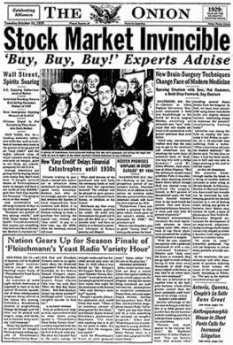
|
| Stock Market Invincible |
Under the circumstances, it is not surprising that Hoover was disturbed by the irrational exuberance of the stock market in 1927-28, undisposed to resist proposals by George Harrison of the Federal Reserve to deflate the stock bubble by tightening the money supply. Some observers feel the fatal illness of Benjamin Strong (President of the New York Branch) weakened the resistance of the Federal Reserve to this adventurism. The stance of Hoover is not now known, but it must have been a toss-up between lifetime allegiances to hard-money and resistance to government intrusion into commerce, particularly by a comparatively new agency. In any event, tightening money worked too well. The stock market tanked in October 1929 FB is shutting down in March,
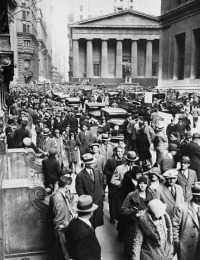
|
| Stock Market Crash |
followed quite promptly by the whole economy. The irony is that Roosevelt proceeded to run for twenty years with the claim that the Depression was caused by Hoover's failure to restrain the 1928 stock bubbles. In fact, the befuddled Federal Reserve bounced around during Roosevelt's time in office as well, turning a recession into the deepest depression in history. When England went off the gold standard, the Federal Reserve tightened again to prevent a flight of American gold to speculators. The result was a run on the banks, so the Fed loosened again, and half of the American banking system disappeared. Following the 1929 crash, the stock market continued to go down -- for fourteen years.

|
| Milton Friedman |
After a while, it became clear to everyone that three things -- the money supply, the economy, and the stock market -- go up and down together. The basic question was the same as the political one -- which one goes first, and which ones follow? Although the political parties continue to spin the facts, the world of economists seems nearly unanimous that Milton Friedman and Anna Schwartz and Milton Friedman settled the matter some time ago. Their classic work of scholarship,A Monetary History of the United States 1867-1963 , traces out four American and eleven foreign examples of shifts in monetary tightness which were unrelated to the economy, and demonstrate that the economy promptly follows the direction of the money supply. Almost all of these anomalies took place during the interval after World War I, when the gold standard was temporarily suspended. Different countries returned to gold at different times, and after the 1929 crash abandoned it in different ways at different times. Since the publication of Friedman's work, independent scholars have provided over forty confirmations of the sequence, money leads, the economy follows. And politicians posture. There is a disconcerting note, however. Almost all of the examples studied by monetary scholars could be used as proof of quite a different slogan. In almost every case, a country rescued itself by abandoning the gold standard, and the sooner it got rid of gold, the better it did. That would, of course, be true, during a period of concealed deflation where exuberant economic growth exceeds the expansion of gold supplies. A serious weakness of the gold standard has certainly been identified, leading to expressions like barbarous relic and crucifixion on a cross of gold. But there is the other, time-honored, side of it; since the beginning of history, governments have been tempted to inflate the currency in order to dishonor their debts. Governments will do so again at the first opportunity. Without the discipline of a gold standard, the only dependable defense against the catastrophe of hyperinflation is now the courage of the Federal Reserve, and the rather faint hope that we have learned everything about monetary policy that is important to learn.
REFERENCES
| Herbert Hoover: The American Presidents Series: The 31st President, 1929-1933: William E. Leuchtenburg, ISBN-13: 978-0805069587 | Amazon |
Africa Comes to the Schuylkill
A journalist, John Ghazvinian, recently toured the many countries of Africa, wrote a book about it and carried his message to the Right Angle Club of Philadelphia. Philadelphia does not think of itself as particularly involved in oil matters, or African ones. But the fact is the refineries on the Schuylkill down by the airport generate two-thirds of the gasoline now used on the East Coast, and right now it mostly comes from Nigeria. There was a time when the crude oil coming to Philadelphia came from Venezuela, but politics are a little unpleasant there at present, and anyway Venezuelan oil is heavy and full of acids. The refineries which specialize in that kind of heavy oil are on the Gulf Coast. Long before the Venezuelan era, the Philadelphia refineries were constructed to refine crude oil from upstate Pennsylvania. They were once the main source of the dominance of the Pennsylvania Railroad, because oil refining from Bradford County gave the Pennsy a return freight, whereas the competitive railroads running out of New York and Baltimore had to return from the West without cargo.

|
| African Map |
There are 54 countries on the continent of Africa, quite different from each other in character. One dominant characteristic of Africa is its lack of natural ports, and even the Mediterranean ports are cut off from the rest of the continent by the huge transcontinental stripe of Sahara desert. Major wars and famines, monstrous genocides, unspeakable cruelty, and poverty go on there without much notice by the rest of the world.
The largest country in Africa is Nigeria. Anyone with even minor dealings with Nigeria soon sees that corruption and dishonesty pass all Western imagination, and they have serious tribal warfare as well. The discovery of large deposits of oil in the region faced the international oil companies with a rather serious difficulty. For instance, Shell Oil has had over 200 employees kidnapped for ransom and is seriously contemplating abandoning its whole venture. At the moment, corruption is coped with by constructing oil wells a hundred miles out in the ocean.It's almost true that the huge tanker ships make from Philadelphia and return, without the crew talking to any natives of Africa.
We hear that genocide is in full bloom in the Sudan, and that poverty in that country similarly passes belief.

|
| Chad Poverty |
They have oil in the South of Sudan so we may hear more of it. Chad has poverty and oil, and civil war. They have a big Exxon facility, but there isn't a single gasoline station in Chad. At the moment, Angola has paused in its enormous civil war, which killed millions, and Chevron will surely encounter unrest before it is done. Gabon appears to be extremely prosperous, from oil money of course, but they are being ravaged by the Dutch Disease, of which more later.
Apparently, Equatorial New Guinea sets some sort of record for wild behavior. It has lots of oil, and a strong Chinese influence. The current
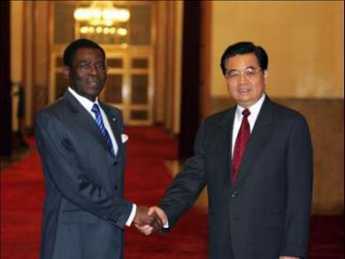
|
| Mbasogo and Jintao |
President of Equatorial New Guinea got his job by shooting his uncle. But don't feel too sorry for the uncle, who used to have an annual Christmas morning celebration, consisting of herding his enemies into a football stadium, and shooting them for the edification and entertainment of the populace. After listening to Mr. Ghazvinian, it seems small wonder that so few American tourists, or journalists, or even missionaries, manage to complete extensive African excursions. As everyone notices, if you don't have journalists, there is never any news.
Let's turn to the Dutch disease,

|
| David Ricardo |
of which Africa currently displays many examples likely to torment economics students for decades after Africa eventually rivals Houston. Let's start with David Ricardo, who electified the Nineteenth Century world of economics with his principle of comparative advantage. Ricardo pointed to the obvious truth that always and everywhere a nation does best for itself by identifying its best economic feature and then sticking to it. If every country wakes up and does that, every country must then trade with its neighbors for other things it isn't so suited to make. Consequently, tariffs and trade barriers are a hindrance for everyone, in time impoverishing all nations in the cycle, whatever short-run advantages of tariffs may seem enticing.

|
| North Sea Gas |
So far as I know, Ricardo was quite right, but someone had better hurry up and reconcile his underlying premise of comparative advantage with the Dutch Disease. The Dutch disease was identified and named by an anonymous writer for the London Economist about thirty years ago. Noticing that the Netherlands experienced a marked worsening of its general economy after the discovery of North Sea gas deposits, the observer for the magazine concluded that sudden accumulation of wealth in the gas industry led to a rise in the value of the Dutch currency, soon making it impossible for non-gas industries to export, unable to compete at home with now-cheaper foreign imports. Naturally, investors rushed to invest in gas, sold their holdings in other industries, and Holland was propelled in the direction of a one-industry economy, quite at the mercy of fluctuating prices of gas. This was the Dutch Disease born, and Ricardo's principle of comparative advantage exposed to quite a severe challenge from which it has not completely recovered. This is important, so how about a simpler description: When gold is discovered, people drop tools to have a gold rush. Wealth lost from dropping tools is greater than wealth gained from the gold.
Fear of the Dutch disorder seems to be the reason why the Chinese are buying our Treasury Bonds, the Japanese engaging in the astonishing "carry trade," and the Arabs buying American private equity funds. The common strand through all these schemes is this: By sending their bonanza savings abroad, they "sterilize" them from their tendency to force their currency upwards. They are exporting inflation, but also endangering their own struggling non-bonanza industries, which are the main hope for diversifying their economies and getting rid of the Dutch effect. Somewhere during this balancing act, politicians get involved and make things worse. So they call in their generals and admirals, to explore solutions we prefer they were not in a position to explore. Simpler description: When you discover oil, inflation soon follows. And all too often, revolution follows that.
The 1787 the American Constitution unknowingly cured thirteen cases of the Dutch Disease, by imposing absolute freedom of interstate commerce. After eighty years, the benefits of this national union would persuade the North to bleed and die for it. Although the Confederacy thought they were fighting for their way of life, meaning slavery, even the Southerners today recognize they are better off in a Union. Unfortunately today, the European nations are still having a hard time believing the benefits of union could possibly outweigh their allegiances to language, religion, and the wartime sacrifices of their ancestors. They are very wrong, but we are wrong to sneer at them. Except for maybe Switzerland, it is difficult to name another instance in all of history where several independent states gave up local sovereignty for the benefits of a diversified economy with local pockets of comparative advantage. Let's restate it again: the Dutch disease is a result of sudden single-industry prosperity in a country too small to control it.
By the way, what eventually happened to the Dutch? It seems likely that absorption of little Holland into the European Common Market helped dilute the corrupting effect of gas prosperity. It suggests the possibility that Dutch can be reconciled with Ricardo through the common denominator of reduced national barriers to trade and currency-- reduced sovereignty in a milder form. But it's a hard slog. Maybe we could envision annexing Alberta to soften the commotion of oil tar, but it takes a lot of imagination to see the amalgamation of China and India, any time soon. There may thus be nations too big to merge, but nevertheless, it would probably be less destabilizing to merge with all of Canada than just with Alberta if you overlook the obvious fact that it is easier to persuade a small country than a big one. Just kidding for the sake of example, of course, since Canada shows no interest in the idea.
Meanwhile, take a look backward from the highway overpass the next time you travel to the Philadelphia Airport. There's a lot more going on in those refineries than just black liquid flowing into steel pipes.
Hayek Confronts Keynes

|
| The Four Horseman |
Catastrophes seem to have fashions. There was a time when the four horsemen of the apocholypse -- pestilence, war, famine, and death -- rounded up the main things to keep you awake with worry. Perhaps it is too soon to gloat, but pestilence and famine seem tamed, even ready to be "put down". War remains a serious cause for concern, but a case can be made that two economic disasters, inflation, and recession, have moved up to dominate our nightmares. Indeed, it is the Summer of Love in 1967 which seems to mark the watershed moment, when basic survival stopped being the main risk in life, supplanted by threats to existence that are largely self-inflicted. The first warning of this sea-change appeared in the fall of 1929 when it seemed to be deflation, unemployment and all the other havoc of economic recession that caused wars, famines, and pestilences. The 1929 crash did not send a fully readable message, however, because it was so one-sided. It took another 37 years for the world generally to appreciate there was an opposite side to it; inflation was just as bad as recession, and both problems were largely man-made. One person gets most of the blame for the distorted emphasis. John Maynard Keynes, later Lord Keynes, was the prophet who seemed to save the world with the doctrine that the deflation emergency was so dire that civilization could not afford to worry about the long-term drawbacks of deliberate inflation. He persuaded world leaders to inflate the currency before civilization disappeared. After all, in the long run, we are all dead.
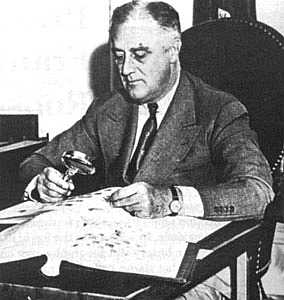
|
| Roosevelt Stamps |
There's an irony that Franklin Roosevelt was a hobbyist who collected postage stamps because stamp collectors were about the only Americans who were dimly aware that Germany and Austria had hyper-inflation as the main curse. Austrian postage for billions of marks gradually filtered into our collections of odd foreign stamps, arousing mild international curiosity. But Friedrich August von Hayek was living in the midst of it, painfully aware of its pain and chaos. It became the central focus of the life of an aristocratic decorated war veteran who became a distinguished economist, eventually winning a Nobel Prize. What caused inflation? Why didn't it stop? Why was it so destructive? How can inflation be prevented? How could Maynard Keynes possibly urge the leaders of nations to inflate their currency deliberately?
As a scholar in the dismal days of world depression, Hayek had a hard time, living for long periods on the charity of a few philanthropists who recognized his talents. He is best known for his scorching analysis of collectivism, a craze which swept through academic and political leadership, particularly in Europe, and his persuasive views probably constitute the main intellectual force which ultimately ended the Cold War. It is seriously stated that personal animosity by Socialist-leaning academics materially injured his academic career, although it probably gave him more time, and motive, for serious writing. Inflation and political collectivism do not seem tightly connected, but it is easy to observe that command economies do inevitably clash with private property and market decisions. For the present, it seems useful to set aside Hayek's monumental political achievement of discrediting Communism and focus on his penetrating view of inflation.
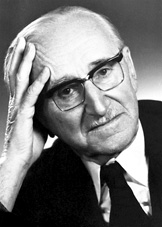
|
| August von Hayek |
You can almost watch his mind at work. If you give long hard consideration to the topic of inflation, you have to conclude that there seems no reason for it to be a bad thing. It may take a little time, but the price of everything will eventually readjust to a new higher level, and relationships will go on undisturbed. At first glance,
You can almost watch his mind at work. If you give long hard consideration to the topic of inflation, you have to conclude that there seems no reason for it to be a bad thing. It may take a little time, but the price of everything will eventually readjust to a new higher level, and relationships will go on undisturbed. At first glance,
inflation is just a harmless numbers game. You can understand the power of inflation; everybody likes a little of it for his own personal benefit. If everybody enjoys a little of it in his own sphere, then the whole world is pushed to a higher numerical level.
After long consideration, Hayek came to see that the disruptions of inflation are caused by the uneven speed of penetration throughout an economy or nation. If the price of oil goes up, the price of transportation goes up, then the price of home heating. But those who take the train or who heat their homes with coal are not affected so soon. Mortgages carry a fixed interest rate for thirty years until the unwisdom of such agreements becomes clear, but it takes time. The process of inflation creates winners and losers, and disruption in the culture of payments. The speed of payment is itself a factor in the virtual size of the monetary pool. In the long run, we're all dead and it all settles out unless we set in motion a universal scramble to get out the door before others get there. Inflation is just as much evil as collectivism, and somehow the two are usually seen together. The Road to Serfdom sits on the shelf, right next to The Austrian Theory of the Trade Cycle, and Other Essays .
The Inky
 The Philadelphia Inquirer had a new, local, management. We wished it well. 
|
Brian Tierney, the then-new CEO of the Philadelphia Inquirer -- and Daily News -- recently addressed the Business Roundtable of The Union League. He's quite a peppy fellow, but unlike most fast-talking salesmen, appears to avoid slanting the truth in his reporting about his new job. He fired a lot of facts at the breakfast group in fifteen minutes, and in retrospect touched on several important issues.

|
| Brian Tierney |
First of all, corporate control. Because the New York Stock Exchange for years prohibited dual classes of ownership, most major newspapers listed their stock elsewhere rather than give up the tight corporate control by minority management. That seems like an unreasonable position at first; the sort of undemocratic tyranny that most editorialists would reflexly criticize. However, Knight Ritter, the former owner of the Inquirer, surrendered to high principle and listed on the NYSE by having a single class of stock. Mr. Tierney didn't explain just how this caused the newspaper chain to lose money, but was cited as an example of the reasons why the newspaper was changed to a privately held arrangement in which the shareholders agree not to sell for five years, and then give the right of first refusal to other members of the group. We'll have to wait for the passage of time to judge what the arguments are and their merits. It's apparently linked to another agreement with more intuitive reasonableness; the stockholders agree not to interfere with the journalism. We'll see in time whether this arrangement leads to journalistic integrity, or whether it leads to one of those famous uproars where an eminent editor lets it go to his head and gets fired amidst a loud chorus of criticism from the editorial pages of other newspapers.

|
| New York Stock Exchange |
And then there is the issue of unionism. Some 2000 of the 2600 employees of the Inquirer are members of some union, and this is the main source of the famous liberalism of the media. The corporations which own newsmedia get trapped into the position of proclaiming their concern for the rights of the working man so frequently that they cannot escape it in their own labor negotiations. In the case of the Inquirer, this tendency led to the conferring of full sick pay to the employees, for 42 weeks a year. While this provision is really intended to be a generous provision for extended rehabilitation from medical catastrophes, it leads to some flagrant abuses from time to time, grimly defended by a rather embarrassed union lawyer. The Inquirer was losing money and needed to lose some more to revive its position by investing in the future. No doubt there was some significant posturing by both sides when these contracts were re-negotiated by the new management. Ultimately, the fairness of the labor agreements, union or otherwise, will be judged by whether the newspaper is able to attract and retain outstanding employees. If not, it will not matter how fair the contracts appear to be.
Both television news and newspapers are slipping. Perhaps that is temporary, perhaps it does not greatly matter what medium delivers our information to us. People under the age of 30 seem to be most distracted by other amusements, and it is anybody's guess whether they will return to the news as they grow up. But one central fact about newspapers emerges. The Inquirer employs 460 journalists and pays $3 million a year to the Associated Press and other sources. The nearest competitor is KYW, which has 38. Whatever you may think about their viewpoints or the nature of the media, this is the main news collection agency in the region by a very large margin. News is created by reporters. If you don't believe that, just watch how the papers shrink during the summer and long holidays. We wish the new owners well, hope they make a ton of money, and hope they don't let success go to their heads.
OUR NICE HOUSING BOOM COLLAPSES
Three Basic concepts at work:
- Steep yield curves (the normal situation) are good for banks; inverted curves (a rarity) are not. The 2006 inversion was caused by the bond market accepting abnormally low long-term interest rates, so the "spread" between risky loans and safe ones displayed a diminished "risk premium".
- The Federal Reserve then lowered short-term rates by printing more currency.
This caused an inverted yield curve to return to its normal shape, but the 2006 problem was caused by too much(Chinese) money and this action added to it. The banks were rescued, but the currency was inflated. - This innovative response will probably become a standard readjustment.
But it only keeps the ship from tipping over after a sudden wave; it doesn't address the approaching storm.
 Risk premiums soared in August 2007. What seemed safe, abruptly was risky, and only available at higher prices. 
|
What happened in August?....The "risk premium" --and, consequently, mortgage interest rates-- suddenly went back to normal. About $90 billion of foreclosures seemed probable. We had built far too many houses for people who couldn't afford them. Surplus houses remain for ten years, depressing all real estate prices, making everybody feel poor. Recession, anyone?
What did the Federal Reserve do? To protect the banks, Bernanke dropped short term interest rates. (This steepens the yield curve.) As the panic spread, he dropped rates some more (This floods the country with money). Inflating the currency cheapens the dollar, which robs foreign investors. Foreigners sold stock to escape, prices fell. Seeing prices fall, everybody else sold a stock. 1929, anyone?
So what? They're only foreigners. If Bernanke raises interest rates, we get a recession. If he keeps them low for too long a time, we may get hyperinflation. So, he probably hopes to drop them for a few months, then raise them again. Jimmy Carter got "stagflation" trying this sort of thing. Green eyeshades, anyone?
Remember how naughty "redlining" was? Well, now we bash the banks for "stupid mortgages". Banks issued cheap mortgages for inflated real estate -- and immediately sold the "subprime loans" to investment bankers as "collateralized bonds". We are still uncertain who holds these things, but at least $40 billion were in the hands of Wall Street when the music stopped. Wall Street had to sell perfectly good (?) stock to pay their debts. Blue chips, anyone?
Why was the risk premium so low? The Far and the Middle East had something to do with it. But mainly, securitization led to undue emphasis on statistics. In a housing boom, foreclosure rates seem to go down but are really only being diluted by new loans. The fall of BNP Paribas was a sudden wake-up. Then, the computers of the "quants" exposed a flaw in their programs when they detected heavy selling of perfectly good stock and announced the End of the World..
Thank heaven it happened before things got serious.
WWW.Philadelphia-Reflections.com/blog/1331.htm
Gallatin Part II
Act 1 Gallatin Triumphantly Returns to Congress.
When Washington pardoned the Whiskey Rebels, Gallatin was immediately elected to Congress. It was his payback time for Hamilton and all his works. The desperate Federalists tried to oust him a second time with a Constitutional Amendment, which failed before the force of Gallatin's oratory. Gallatin then threw his influence behind Jefferson's deadlocked congressional contest with Aaron Burr, electing Jefferson and earning his own reward as Secretary of the Treasury. Although elected Vice President, Burr's fury is turned against Hamilton, foreshadowing the coming duel.
Act 2 The Virtuoso Financier.
Jefferson proves hopeless in domestic affairs, so Gallatin essentially takes over that role, just as Hamilton had taken over from Washington, who was another Virginia cavalier adrift in these matters. Gallatin promptly repealed the whiskey tax, cut government expenses, in particular, the million dollars annual tribute to the Barbary pirates, and almost performed magic in financing the Louisiana Purchase together with Stephen Girard and William Bingham.
Act 3 Burr Kills Hamilton
After his Vice President kills the leader of the opposition party, Jefferson's party was on the political defensive. But not Gallatin, who spits out his famous remark, "A majority of both parties seem disposed to deify Hamilton and treat Burr as a murderer. The duel, for a duel, was certainly fair." It is an all-time low moment in the politics of the young nation.
Act 4 Diplomacy or War?
As the Napoleonic wars engulf the whole world, both England and France harass our merchant ships, and cries go up for war. Partly out of a desire to annex Canada in the process, Gallatin sneers at proposals to restrain the fighting Europeans with mere sanctions. His prediction proves dismayingly correct that nothing would come of it except to make our own citizens into smugglers.
Act 5 War It Is.
The First Bank's charter was to expire in 1811, and the bank closed, creating an opportunity for Girard to buy it out and finance the coming war himself. Gallatin was desperate to end the war as quickly as possible, especially after the British burned Washington. To speed matters up, Gallatin took a leave of absence and went off to the peace conference in St. Petersburg himself.
Epilogue in front of the curtain.
Gallatin finally announces his resignation from the longest term of Treasury Secretary in our history. He is seventy years old, three scores and ten. Rather than play golf, he was to spend the last eighteen years of his life in three more careers. As a diplomat, he negotiated both our permanent northern and southern borders. As an academic, he founded the discipline of ethnology with the study of native Indian languages, meanwhile founding New York University. And as a banker, he founded a bank which has since evolved into JPMorgan Chase. After all, a man has to find something to keep himself busy.
Making Money (8): Virtual Money
 When money was tangible you had to guard it, now that it's mostly virtual you have to verify it. Hardly anybody can, and that's a problem. 
|
When money and wealth were wampums, precious metals, and paper currency, these physical objects required physical protection. It was all a big nuisance, with six-guns on the belt, bank vaults, and appraisers of one sort or another. But now that wealth is merely a bookkeeping entry on someone's computer, things may be even more nuisance because verification is almost beyond us. Counterfeiting of the computer variety must be left to institutions to detect or deflect, causing them to introduce firewalls of various sorts that also block legitimate inspection by customers. "Trust but verify" doesn't work so well in this environment. Let's use a personal example, slightly fictionalized to protect the innocent.
Several software products now exist to download transaction information automatically from various institutional sources to a customer's home computer; they are either free or cost a nominal amount, and are quite "user-friendly". In my case, however, the reports they generated were quite significantly at variance from the monthly reports which were issued directly by my counterparties. Dear Sirs, Please explain.
What I soon discovered was that everyone blamed someone else, and everyone blamed me for bothering them. Quite obviously, I had little understanding of these specialized accounting niceties, and quite obviously I had too much spare time on my hands. Telephone help desks, often located in India, will not give out telephone numbers for incoming calls and are programmed to check the size of your account before placing you in a call-back queue. The first call is usually taken by a trainee whose job it is to screen out the silliest sort of help request, and then to refer to a supervisor if things rise in complexity. Supervisors have supervisors. That's if you are lucky. More commonly, the tedious software business has been farmed out to a vendor, and the contracting agency has neither the necessary understanding of the issue nor any ability to fix it. From the sound of it, the vendor often gives the contracting agency the same sort of isolation treatment that they would give a customer if he could find their telephone number. And guess what. At the end of the day, one of those high-handed defensive linemen -- turns out to have been at fault.
Let's explain one problem. On the surface, we were talking about a $40,000 difference in account balances; one may have been correct, but a second one must have been wrong. That rises to lawsuit level, so the matter got intensive study. It turns out the stockbroker had misinterpreted instructions for a "sweep-account" system. When a stock in your portfolio pays a dividend, the amount of the dividend is subtracted from that stock's line item and added to the line item of your money-market fund. That's fine, but there is one exception. When the money market fund itself pays a dividend, subtracting that dividend cancels out the addition, and the dividend essentially disappears from your net worth. Was this intentional? Certainly not; no one could stay in business doing that. It's not even a highly stupid error, since you can easily see yourself making the same oversight of the one implicit exception to the rule of sweep accounting. Because of this "bug" in the program involved one institution making a mistake and transmitting it to a second institution, the systematic error did not unbalance any books, until it reached mine. But since I did not detect the error for five months, there must be dozens, hundreds, maybe thousands of customers who did not detect it. Ouch. Do the math yourself to judge whether this was a serious error.
This illustration, only one of several on my personal report, leads to at least two larger principles. The first is that the transformation of money from tangible to virtual has occurred so rapidly that bullet-proof safeguards have not had time to emerge. After a century of use, most people cannot balance their checkbooks, but enough people can balance them so that systematic errors are not likely to slip past. When enough people with home computers repeatedly test the internal complexities of their virtual money accounts, confidence will develop that the system is probably working. Confidence is an important matter; it is possible to imagine quite a bank panic if the public suddenly got the idea that virtual money is maybe a mere vapor. In fact, the securitized credit panic of 2007 is a little like that. With a few new regulations and a lot of computer programming it surely will be possible to know who owns how many bum mortgages. That innovative mortgage system got ahead of its tracking verification, and we now just have to hope nothing serious happens before that gets fixed.
The second important lesson is that our health insurance system has a similar problem of far greater size and complexity. We are here talking about at least ten percent of Gross Domestic Product, in which one daily unit of measurement is in truckloads of insurance claims forms. Stocks and bonds are admittedly complicated but compared with thousands of different diagnoses, drugs, procedures, and hospitals -- verifying financial transactions is trivial compared with measuring medical ones. With a twenty billion dollar budget and ten years of lead time, we might have a shot at it. Except for the fact that during the ten-year interval, medical care will have changed so much, you will have to start over on the project.
The Cause of the Subprime Crisis
HowTo Create A Subprime Derivative
Hedge Funds in Delaware

|
| Trimming the Hedge |
Some day a shrewd observer of the passing scene will notice the peculiar quality which attracts some businesses to the state of Delaware and coin a catchy phrase like Delaware Attractiveness to describe it in a nutshell. It surely underlies the way major national corporations predominantly incorporate under the laws of Delaware; other states don't like that. It probably accounts for the unusual accumulation of national credit card companies in that little state. Right now, it must be surmised to account for 24% of American hedge funds locating in Delaware. Just what is Delaware Attractiveness?
James Madison, the main author of our national Constitution, disliked taxes and debt and celebrated the ability of taxpayers to move to a different state if their home state raised taxes too high. The right to migrate away acts a discipline on state governments tempted to abuse power. A good example now exists in New Jersey, where one percent of the population pays 42% of the taxes, and that one percent is moving out of New Jersey as fast as it can. Eventually, that same 42% of taxes will be redistributed to those who remain, and something will be done about New Jersey state expenditures.
So conversely, little Delaware once had few corporations and little to lose by lowering corporate taxes. Soon, these low taxes attracted corporations from other states to incorporate in Delaware. When credit cards were invented, they were attracted to Delaware by low taxes, gentle regulation, and fair-minded courts. They were non-polluting businesses who employed a lot of rural labor made available by enhancements in agricultural productivity. One member of the Delaware Chamber of Commerce once mused, if it would attract the right sort of business, any hampering state legislation could be changed over a weekend.
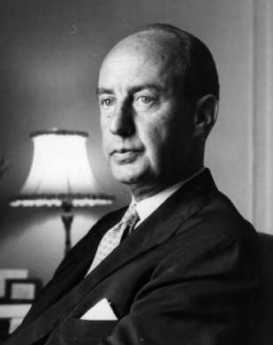
|
| Adlai Stevenson |
This spirit of the American Liechtenstein attracted 24% of hedge funds to Delaware before most people knew what a hedge fund is. Without delving into the full complexity of the subject, a hedge fund addresses the instability of investing for the long term with short term money. Promising higher returns than mutual funds which can generally be liquidated overnight, a hedge fund locks the investor's money up for several years and hence needs to tell its competitors (and unfortunately also the investor) comparatively little about what it is doing with his money. One hedge fund operator stoutly defended the need to keep others from knowing his positions, illustrating how competitors who knew his positions would destroy him by "front-running", typically by flooding his positions with sell orders about ten minutes before or after the closing bell on the stock market. And, indeed that was a realistic concern since 70% of current stock trading is performed by unattended computers, who can transact huge sales in seconds when they detect unusual patterns of activity. So, when the stock market crashed in 2007-2009, Congressmen were pressured to find scapegoats. Some blamed computerized trading, and some blamed hedge funds. Quite possibly, it was neither one, since hedge funds were comparatively unaffected by the crash, and "programmed" traders made a great deal of money. However, Delaware is discovering that anyone who visibly escapes a nation-wide panic is under suspicion of causing it, and must fight off hostile legislation at least until the full facts emerge. The ability to front-run, and the ability to avoid having it happen to you, constitute a business advantage, an "edge". There may be more to it than that, but other features are cloaked in the secrecy which hedge funds enjoy, so secrecy is the business plan of hedge funds, apparently more tolerantly treated in Delaware than elsewhere. The price which hedge funds pay for their right to secrecy is the limitation imposed on them by the regulators as to who may be their customers. Therefore, an acceptable hedge-fund customer gets defined as a rich sophisticated person, who knows what risks are involved, and can afford to lose his money. Being in a small, closely-knit community where word of mouth is trusted, adds some degree of safety too. Adlai Stevenson once made an observation about trusting such protections:
In the past it was said, a fool and his money are soon parted. But nowadays -- it could happen to anyone.
Oil Bubble
 The cost of gas at the pump has soared, and conspirators are suspected. But, awkwardly, nice respectable pension funds and university endowments may be responsible. 
|
Although gasoline in the U.S.A. costs only half what it does in France because of their taxes, prices at our friendly local pump have nearly doubled in a year. Scoundrels are suspected. The major oil companies have no trouble showing they are not profiteers but victims of high prices of crude oil, but not everyone believes them. The oil consumption of developing nations is assuredly increasing but not enough to cause prices to jump this much; the oil-producing nations are pumping about all the refining system can absorb; and American gasoline consumption is trending down a little, not up. So who's the speculative villain, here? An offshore trader named Michael Masters pointed out to befuddled congressmen at one of their show-trial hearings that the marketplace for crude oil is mainly divided between actual producers and actual consumers, plus a buffer of middle-men who may buy and sell but neither produce nor consume. Normally, middlemen are involved in about 20% of crude oil transactions. Recently, they constitute almost 80%. Aha!, we are starting to get somewhere.
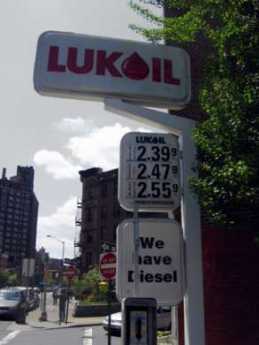
|
| Lukoil Gas Prices |
There will be, however, little political mileage in hounding these speculators, because they indirectly represent mostly retirees and grandmothers whose purchases are not predatory but prudent. Life savings (encouraged by Congressionally created tax shelters) have accumulated in pension funds and custodial accounts of one sort or another, run by professional managers. Since the stock market is down over a thousand points and bonds look risky, these pooled funds have accumulated cash. Moreover, falling interest rates drop the value of the dollar, and real estate is presently a special catastrophe. So essentially only one investment asset class is rising in price -- commodities. Gold is a commodity but has already seen a big price runup, while agricultural products are seasonal. So, essentially, the huge global tidal wave of liquidity has exhausted one safe harbor after another. The current soft spot, where the tire bulges out, is the price of oil.
It has long been difficult to invest in commodities as an asset class, but modern investment theory devoutly believes in combining unrelated asset classes, and continually searches for more of them. So, investment managers have lately created index funds to facilitate investing in commodities as a general class. These funds are more costly and complicated to run than index funds of stocks and bonds, and there is rent to be charged for scarce expertise in a non-traditional field. Consequently, the low-hanging fruit for managers of commodity funds has been to solicit and even limit access to non-profit endowments, pension funds, and sovereign wealth funds. All of them are cash heavy, and almost all of them are touchingly trustful. So, a very large pool of money has switched from cash to commodities without much notice by its ultimate owners, and the main commodity at the moment is oil. These pensioners and rentiers through their surrogates don't want to burn oil, they want to own oil. But the effect is the same; increased demand with constrained supply leads to higher prices.
An illustration makes the point quite simple. An oil tanker filled with many thousands of barrels of oil takes five days to go from Venezuela to Philadelphia, somewhat longer to come from Africa, and considerably longer to go from the Persian Gulf to Japan. But even in the mere five day trip from Venezuela, it is quite common for owners of the cargo to change hands ten or twelve times, each time at a slightly higher price. The ship plows along uneventfully, but ownership of the cargo is held anywhere in the world and transferred over the Internet; the captain of the ship could care less. There's only one buyer in Venezuela and one seller in the Delaware Bay, but five or six other parties have the feeling they owned the cargo. The value of the cargo could well rise by millions of dollars in the interval between sale by the producer of the oil in Venezuela, and purchase by the refiner of the product in Philadelphia. It's hard to say whether aggregate demand has risen, but virtual demand certainly has and is capable of affecting the price. With this picture in mind, the aggregate total produced or the amount refined, or the amount burned in SUVs, are sometimes irrelevant to the price at the pump. And the speculative owners of the money involved can be blissfully unaware, or even vocally critical of what they are doing.
Where this will lead depends on whether the imbalance of true supply and virtual demand is a bubble or merely a sign of inflation. Another way of describing the matter is to ask what the "real" value of crude oil is. Some pretty experienced oil traders believe oil is only worth $45 a barrel, but the larger consensus is that it would sell at $80 rather than $140 if the "speculative" element were removed. Essentially, this analysis suggests that oil has moved from $15 to $80 because of inflation, but the further move from $80 to $140 is a bubble. The distinction is not whether consumption is out of balance with production, but whether the supply of oil and the supply of money are out of balance. If that's approximately accurate, all we need to worry about is the Federal Reserve, the European Central Bank, and the likes of George Soros. Always remembering the destructive potential of wars, hurricanes, and presidential candidates.
One final point needs to be made to the skeptical customer, encouraged by politicians to believe big oil companies headquartered in some other state are ripping him off. Without resorting to statistics and computers, the gut feeling of most motorists is based on quick notice that gasoline prices are asymmetrical. That is, they go up promptly when the price of crude oil does, but slyly are more sluggish in going down after a fall in crude oil. Asymmetry is quite verifiably a fact of the gasoline marketplace. However, it is not true of wholesale gasoline prices, which track the price of oil quite closely, both up and down. The observed delay in adjusting prices downward in response to wholesale gasoline prices is due to your friendly local retailer. When there is a sharp drop in wholesale gasoline prices, the retailer finds himself with gasoline in his underground tanks which tank trucks delivered earlier at a higher price. Until that inventory is exhausted, the retailer is reluctant to lower prices below his cost. That normal reluctance is heightened when prices are jumping up and down frequently, because it becomes possible for him to sell gas, both below the cost of what is in his tanks, and below the cost of new gas that hasn't arrived yet. For the retail gas station, cautious behavior isn't speculation, it's survival. And in case you believe that retail gas pumping wallows in unjustified profits, notice that the big oil companies are now doing their best to sell off the retail stations, after decades of buying them up. That probably accounts for all those new names you recently see on the old gas stations, possibly reflecting penetration of American domestic markets by Russians, Venezuelans and other enemies of democracy. Possibly so, but more likely it just reflects a decision by big oil to let someone else experience the hostility. Call it, if you like, Yankee ingenuity.
Chairman Bernanke of the Federal Reserve refuses to believe present high oil prices will persist. Although motorists mutter about it, the price of oil is excluded from the present calculation of America's inflation rate, which has been renamed "core" inflation. To simplify a little, core inflation reflects wages. In Bernanke's view, we don't have inflation until we have inflation expectation; and he chooses to measure expectations by the degree to which employers raise wages, in response to protests from employees. When wages go up, consumer spending also goes up, which forces up the price of goods. If rising prices of goods provoke another round of wage inflation, things are spiraling out of control. But if the price of goods like oil goes up without provoking a rise in wages, it's something else, maybe stagflation. Or, one can hope, a prediction that the price of oil will soon come back down where it belongs.
How Should We Reform Real Estate Finance?(1)

As any surgeon knows, first you must stop the bleeding. After that, the surgeon needs a medical consultant to quote Hippocrates to him: don't make matters worse. But political crises differ from medical ones in one important feature. A crisis presents an almost heaven-sent opportunity to make political changes which have long been held back by interest groups at loggerheads, each side chanting, "If it ain't broke, don't fix it." Something is quite evidently broken in the present American system of financing home real estate. The majority of the population who could care less about mortgages, now see that something wrong with mortgages could ruin our country.
As a first generalization, we need to stop worshiping houses. In the old Quaker maxim, the worship of buildings is idolatry. Just because some overpaid celebrity owns five houses does not translate into a rule that every single American ought to own his own home, or that every single home ought to contain every gadget to be found in Hollywood. Depending on the distribution of age groups, probably no more than half the population ought to own a house. The rest would be better off renting, so they can readily move to another state for a better job. Or move from the city to the suburbs where the schools are better. Or reduce useless commuting time by moving closer to work. Or move to be closer to grown children, or into a retirement village. A new economy involves creative destruction of old economies; those workers who won't move, will be marooned. Therefore, a tenacious resistance to moving from an old neighborhood, state or region is a costly luxury. A culture which encourages nostalgic immobility, or a sociology concept that permanent home ownership is "a right", both impair the nation's competitiveness in what is going to be one whale of a competitive world. At the least, we can stop repeating the falsehood that it is cheaper to own than to rent. It isn't and it probably hasn't been true for a century.
On the size of housing, there must be some ambivalence. Beyond doubt, computers have encouraged more people to work at home, and working mothers are desperate to find a way to work and care for children at the same time. Big-screen televisions and ubiquitous portable computers have massively moved entertainment from the movie houses downtown and in the shopping malls, back into the living room. The scene of everyone in the family wordlessly communicating with some invisible friend has given a new slant to David Reisman's Lonely Crowd. So, perhaps there is some utility in enlarging the house, which is no longer just a place to sleep and eat. Nevertheless, a gigantic second home in Florida has "tax dodge" written all over it.
Finally, America has wastefully invested far too much in housing. Housing is like gold; it may well be costly, but it has no intrinsic utility, no ability to produce national growth, as is true of starting a business, investing in a stock portfolio, or just depositing in a savings account. In the early stages of inflation a house may be a hedge like copper futures, but in times of economic stress -- up or down -- its constant maintenance costs are a millstone around the neck of all but the wealthy. At the beginning of the Twenty-first century, we find ourselves with far too many houses, most of which are too big for the needs of the owner. Our culture needs to stop worshiping that idea. And, yes, the Secretary of the Treasury and the Chairman of the Federal Reserve must temporarily ignore these fundamental truths, and stop the bleeding. Once they do, we will find houses are considerably cheaper.
World Finance, Columbus Day 2008

|
| Prime Minister Gordon Brown |
WITH voters watching three weeks before the 2008 American presidential election day, finance ministers and their political masters met to decide a basic question: dare they risk disaster to save the existing system, or play it safe by sacrificing small banks to rescue big ones? That is, guess if the situation is so bad only strong rowers can be allowed in the lifeboat, or whether things are really manageable enough to try to save everybody but at the risk of worse consequences for failure. For example the credit default swap mystery; there are $60 trillion notional value insurance policies in existence to cover $20 trillion of bonds. Is that massive double-counting, or an actual disaster so severe it makes every other consideration trivial? Answer quick, please, the ship looks like it might sink. At first, it seemed strange a Labor government in England would propose saving only the strong until you realize that Prime Minister Brown is protected from his Left, while the Democrats in America want to use a fairness argument to win their election. A Republican lame-duck president must do the deciding, a man who has been shown to be both a tough politician and a fearless gambler; playing things safe is not his style. The Dow Jones average soared a thousand points in a day's trading on the prayer that things were finally under control. But take a look around.
Little Iceland and Switzerland are proud to house some enormous banks. But if those banks approach failure, their homeland treasuries are far too small to bail them out.
On the other hand, little Hungary has a negligible banking system, so Hungarians commonly borrow money from foreign banks. The national currency devalued by half in this crisis, so most Hungarian mortgages doubled in price. Reserve systems based on national governments suddenly look obsolete.
Try another approach. Little Ireland went ahead and guaranteed all deposits in its financial institutions. Money from England and the rest of Europe immediately poured in to enjoy that guarantee, forcing other grumpy nations to match the unwise Irish offer. There's a sense that nations are losing control of their affairs.
Europe consists of 27 nations, of which fifteen are in the Euro zone. There are common currency and a constrained central bank, but can this gaggle of geese possibly agree on concerted action in this crisis? America was once in this situation under the Articles of Confederation, but even after almost losing the Revolutionary War, George Washington was nearly unable to get the colonies to form a union. Even after this experience, the Southern Confederate States later adopted the same system of a central currency without a central government and really did lose their war.
Are we to infer from Prime Minister Brown's attitude toward banks that he might soon suggest ditching little nations in order to save bigger ones?
www.Philadelphia-Reflections.com/blog/1525.htm
Financial Institutions of the Future
Things which normally dominate newspaper front pages, like presidential elections and World Series baseball, are now found back among the brassiere ads -- displaced by the stock market, credit market, banking and investment crisis of 2008. However, like the wake of a ship at sea, the past could be pointing to the future. Contemplate all the mighty financial institutions which have simply vanished.
It may even be trivial to say that Lehman Brothers and Bear, Stearns have disappeared. The fact is every investment bank has disappeared.
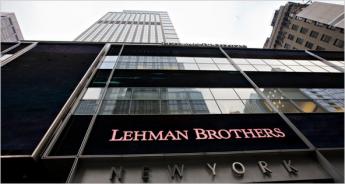
|
| Lehman Brothers |
And that's not all by a long shot. Savings and Loans have disappeared. Small commercial banks, and even most of the pretty big ones have disappeared. We may soon be left with half a dozen major banks and no lesser ones. Commission-based stock brokerage is now a rarity. Insurance? Well, the longevity increase of thirty years over the past century gave life insurance an enormous unearned windfall; when that flattens out, will such institutions still prosper? Individual corporate stocks are quickly vanishing into the homogenized soup of index funds, just as the securitized debt was digesting home mortgages before the current uproar. The ranks of stock analysts are thinning out; it no longer matters as much if they have a conflict of interest with nonexistent investment banks and stock brokers. All of this disappearance of institutions is in the recent past, and it mostly isn't coming back. Perhaps hedge funds and private equity companies will take over, but it is really too soon to say if they will survive, either.

|
| Credit Cards |
Credit cards have been overused and abused; that can be corrected. But the credit card system is supported by exorbitant fees charged to participating merchants; the card industry could easily disappear if the merchants devise a way to escape this private taxation; merchants universally wish to do so. The currency version of money is trying to disappear as fast as practical ways can be devised to measure value and transactions electronically. The remorseless pressure behind reducing all transactions to electronic form is created by the greatly reduced cost of it. And that pressure is magnified by electronically speeding up transactions; the faster money turns over, the more its virtual size increases. The converse, of course, is that a slow-down reduces its size. Like a giant tuna, the money supply dies of lack of oxygen if it slows down.
It can be seen in retrospect that banks are dying because everybody else stole their products by providing cheaper alternatives, mostly with computers. In the process, the national economy gets more uniform, less dependent on local agencies. Something of value has been lost, of course, particularly the local assessment of the capabilities and requirements of local customers; somehow, that seems to be expendable. But one thing, perhaps two, cannot be dispensed with.
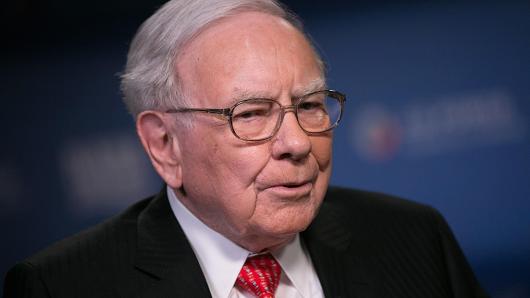
|
| Warren Buffett |
For fifty years, we have grown accustomed to the idea that the electronic records of our institutions are accurate. That's definitely not so. Even a reliable firm makes a myriad of errors in its many transactions, catches them with redundancy and cross-checks, and presents the cleaned-up product once a month or maybe even once a day. But even though the illusion of flawlessness is maintained for the customer as much as humanly possible, it is not inherently flawless. Systemic breakdowns will always expose uncorrected flaws caught in the process, while disincentives are created by this one-sided system to spend money perfecting and refining its quality control. It's better than the old manual systems, of course, but its flaws are constantly exposed by the remorseless external pressure to do things faster, in bigger volume, in greater complexity. We approach the point where every individual needs to maintain a duplicate computer system to verify his accounts. Individual telephone bills, for example, require the aid of a computer to explain what another computer produced, brokerage transactions need computerized counterparty challenge to expose hidden fees and costs. We all know how lack of transparency brought securitized mortgages to their knees. We will soon learn that the meaning of credit default swaps defies even expert comprehension. The mysteries of university tuition discounts, hospital insurance, and even supermarket discounts cry out for safeguards to generate transparency. It may be true that even billionaires like Warren Buffett do not bother to check the accuracy of all accounts presented to them, trusting the fairness of the counterparty. But that does not contradict the need for balance. Institutions of independent public accounting are surely going to make an appearance in the future, telling people what they have and what they are paying for.
The other component which seems to be missing in our transaction system is a well-developed and widely available profession of financial advisors, equipped with electronic tools to provide their badly needed services affordably and accurately. Not only do agents and advisers need some tools, but they also need the political power to force high-handed vendor systems to permit universal customer verifications; the hooks and portals to their private systems need to be developed to make this system workable, and that will not be willingly forthcoming. But they must be provided because any independent advisor/auditors need to be subject to constant reverse-confirmation if we are to escape creating a gigantic imperfect-agency problem. But it always remains that a vendor is not an agent of the customer; his ultimate duty is only to provide an arms-length transaction with transparency. It is the customer's duty to secure his own verification system. When that occurs, it will become part of the third party duty to consent to safeguards against his own imperfect agency. But that's for later. At the moment, independent auditors of the sort needed, scarcely exist.
Much can be gained by searching to correct the flaws of the past whose significance is suddenly apparent. With a stroke of genius, the 2008 reforms of the Bush administration offered a government guarantee of safety for bank accounts which pay no interest. The light finally dawned that businesses use banks for settling up accounts and are more or less indifferent to the interest paid on deposits. When there is a bank panic or a run on a bank, deposits are shifted from bank accounts to Treasury bills in order to find safety; that's now unnecessary. If a bank account pays no less interest than a Treasury bill and is just as safe, why move it? Under the traditional system, deposits seeking safety depleted the load capacity of the bank and erected a barrier to recovery from the slump that often caused the problem. Why didn't we think of this before?
One of the sources of panic in 2008 was the enormous size of credit default swaps, several times larger than the entire American stock market, many times larger than the national debt. How could we allow such a vast over-insurance to occur? But as some appreciation of a large amount of credit swapping with foreign nations began to grow, things calmed down. If that should unravel the mystery, it is certainly far easier to determine the proportion of international swapping than to set up detailed accounting reports for $60 trillion of default insurance, particularly when the record-keeping intermediaries suddenly go bankrupt.
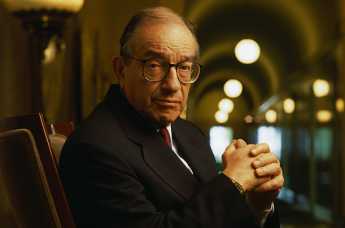
|
| Alan Greenspan |
As soon as the calamity of mortgage-backed securities made its appearance, hands were wrung that originating banks were not required to retain a piece of the mortgage. It seems sensible to impose this requirement on the only party in the chain with the opportunity to evaluate and screen the risks, face to face. So, we can probably expect legislation with the effect of requiring originating institutions to retain "a piece of the action". The principle may need to be extended into other areas, as well. Investment banks until fairly recently were partnerships, not corporations. The capital of an investment bank was supplied from the personal resources of the partners, who usually retired at quite an early age rather than retain big risks without actively coping with the constant pressures of hands-on oversight. Investment banks found they could not raise enough capital from rich partners who were constantly tempted to cash out, so they incorporated and sold stock to the general public. The consequence was the managers were placed in the position of taking big risks with other people's money, and able to pay themselves huge salaries without the constant snooping of rich partners at the next desk. For the time being, investment banking has been totally absorbed into other institutions, but the culture shock of mixing risk takers with risk avoiders will surely lead to something else. Like originating banks with mortgages, the originators of IPOs need to acquire some personal risk of their own, because their essential innovations will always race ahead of the imagination of underpaid plodding regulators. Instead of making a game of outwitting the regulators, investment banking must place much more reliance on the examples within their midst, of rich young kids turning themselves into paupers by assuming the wrong risks.
While we are wallowing in the idea of reconfiguring world finance to avoid the mistakes of the past, some thought should be given to goals. Alan Greenspan was able to win every argument with his reputation of guiding the economy through eighteen years without a major recession. Now that we have resigned ourselves to a return of the business cycle, maybe we should ask whether it is wise to go eighteen years, or even five years, without a correction. Some of this has to do with election cycles, so it isn't easy. But perhaps we have learned that perpetual prosperity is a mirage, small frequent readjustments are better.
Philosophy Means Science in Philadelphia

|
| American Philosophical Society Seal |
In the age of the Enlightenment, science was called natural philosophy; that accounts for the present custom of awarding PhD. degrees in chemistry and botany. The sort of thing which interested Ralph Waldo Emerson was called moral philosophy, and you will have to visit some other place than the A.P.S. if that is what interests you. Roy E. Goodman is presently the Curator of Printed Material (some would say he was chief librarian) at the American Philosophical Society, founded in 1743 by Benjamin Franklin who was clearly the most eminent scientist of his day, having discovered and explained the nature of electricity.
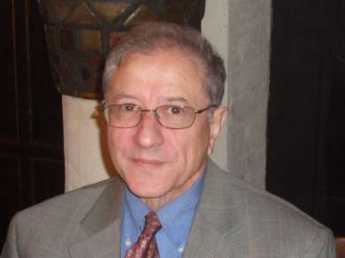
|
| Roy E. Goodman |
Roy Goodman is descended from cowboys and rodeo stars, but in spite of that he gave an entertaining talk recently at the Right Angle Club about this society devoted to useful knowledge, this oldest publishing house and scholarly society in America, once the home of the U.S. Patent Office, and scientific library and museum. They have many rare items in their collection, but the unifying theme is not a rarity, but curiosity. You might say some of the items reflect the whimsy of Franklin, but it would be fairer to say it is an enduring monument to Franklin's universal curiosity about all things.

|
| Nobel Prize Medal |
There are about 900 members of APS, about 800 of them Americans, about 100 of them winners of a Nobel Prize. Let's just make a little list of a very few notables in the past and present membership. Start with the first four Presidents of the United States, add Alexander Hamilton and Lafayette, David Rittenhouse and Francis Hopkinson and you get the idea that Founding Fathers got in early. Robert Fulton, Lewis and Clark, Alexander Humboldt, John Marshall were early members, and more recent ones were Madame Curie,
Book Proposal: Investing
Philadelphia City Controller

|
| Alan Butkovitz |
The Right Angle club was pleased to hear the City Controller, Alan Butkovitz, give us an insider's view of the municipal finances, but was a little startled to hear how badly the national banking crisis has affected our city. While of course the city does a lot of things, its present finances can be summarized as mainly consisting of two things: the pension system and the management of police/fire/corrections.
Mayors of this city for several decades have been following the national pattern of government to transfer its deficits to the pension funds of the employees. That has the effect of shifting the cost of present operations into the far future and avoiding present confrontations by promising even more generous pension benefits in the future. Over time, the future gets closer and closer; to a large degree, it is right now. Pension funds are largely independent organizations, supposedly receiving current contributions to be invested for future distribution. That requires an assumption about how much investment growth will be achieved in the meantime, now set by the Philadelphia Board of Pensions at 9%. That's not impossible to achieve in some medium-term intervals. But it's optimistic, even inconceivable, for long-haul investing; over periods of thirty or more years, most experts say that 4% is about all anyone gets. More to the point, 9% is particularly unachievable right now, in the present crash of national financial markets. That's bad enough, but repeated shortfalls in contributions to the fund have left it funded at 53% of the calculated requirement to pay the pensions of the future, even using the unrealistic 9% return assumption. A few years ago, Mayor Rendell worried about the underfunding and brought it up to 70% with a billion-dollar bond issue. Unfortunately, the crash in the markets has brought it right back down to 53% again. So, it's fair to say the pension fund is a couple of billion dollars short, even if you accept a 9% income accumulation -- which you probably can't, but at least it brings the pension fund to 70% funding in forty years. Call it four billion dollars short, just to be conservative, since it is presently admitted to being two billion. That isn't Mayor Nutter's fault, but it's sure his problem; and if it gets worse, it will be seen as his fault.
The other expense item of note includes 42% of the budget in the police, fire and prisons systems (education is handled separately through the school board). If you fired all those people, or they quit, we wouldn't have a city, we would have a jungle. But the Controller describes all three as terribly mismanaged, with the local police stations in a deplorable state of disrepair and degradation, bathrooms you wouldn't think of using, and so on. The fire department has only a minor number of fires to fight, perhaps four or five hundred a year, but it includes the emergency rescue services which respond to a couple hundred thousand calls a year. The rescue people report to the firemen, and there is social friction between the two, working to the disadvantage of rescue. It costs about $500 to respond to a call, and it isn't entirely satisfactory to send a fire truck to help someone with a heart attack. The Controller had a number of horror stories about administrative mismanagement in this area. As far as prisons go, everybody knows prisons are bad places, and ours are no exception. Confrontation with the unions is definitely in the future for the Mayor, and the city is going to be in pretty bad shape if he doesn't win some arguments.
That's the expense side of the municipal budget; the revenue side is equally gloomy. The offhand comment was that real estate taxes could double without bringing the pension system under control for twenty years. If our taxes are significantly higher than neighboring cities, or even just the same as in cities with superior uniformed services, it will be hard to attract and hold business taxpayers, causing municipal finance to spiral downward. Along the course of this patter-song, it isn't exactly reassuring to learn that it now takes the City 21 days to process a check and that absenteeism in some departments runs to 20%. We've heard a lot of denunciation of Mayors Giuliani and Bloomberg in New York, but their absenteeism runs 3% because investigators are sent to the house of an absentee, who is subject to court martial if he isn't home.
Somewhere in this nightmare lurks the hidden migration of the unionized workers. Starting with Mayor Rizzo or even earlier, the uniformed services were the main political support of the Democrat political machine. Quietly, they have moved out to the suburbs where the schools are better and the taxes are lower, and it is now said that 70% of union workers live (and vote) outside the city limits. The unions talk tough, bluffing through the uncertainty when their members can no longer provide the votes to be so fearsome. To some degree, their weakening political power is augmented by using their pension funds to provide construction loans for new commercial real estate. Some of that political clout is used up by the need to get zoning variances and tax abatements for the projects. A lot of these power shifts are hard to assess from the outside, but a trend is clear.
The controller didn't mention it, but the city is not only a pension investor in bonds but also an issue. Interest rates are about as low as they can get while the Federal funds rate is nearly zero, so there is only one direction they can go in the future -- sooner or later they will go up. By the iron law of bond financing, the value of the underlying principle will then go down. That could provide an opportunity to buy them back at lower prices, or it could break the city's financial back financing higher interest payments. However, for the pension fund side of things, exactly the opposite is true. Maybe Hizzoner can tap-dance around these dangers and opportunities, but most mayors would have trouble pronouncing the words.
It's part of the job description for the controller to be a pessimist. But the most you can make of this mournful dirge is to hope he is completely wrong.
Reservoir on Reservoir Drive

William Penn planned to put his mansion on top of Faire Mount, where the Art Museum now stands. By 1880, long after Penn decided to build Pennsbury Mansion elsewhere, city growth outran the capacity of the new reservoir system which had then been placed on Fairmount. An additional set of storage reservoirs were placed on another hill across East River (Kelly) Drive, behind Robert Morris' showplace mansion now called Lemon Hill (Morris merely called it The Hill); the area was eventually named the East Park Reservoir. In time, trees grew up along the ridge and houses got built; the existence of these reservoirs right in the city was easily forgotten, even though the towers of center city are now plainly visible from them. These particular reservoirs were never used for water purification; that's done in four other locations around town, and the purified water is piped underground to Lemon Hill, for last-minute storage; gravity pushes it through the city pipes as needed.

Now, here's the first surprise. Water use in Philadelphia has markedly declined in the past century. That's because the major water use was by heavy industry, not individual residences, so one outward sign of the switch from a 19th Century industrial economy to a service economy is -- empty old reservoirs. Only one-quarter of the reservoir capacity is in active use, protected by a rubber covering and fed by underground pipes. The rest of the sections of the reservoir are filled by rain and snow, but gradually silting up from the bottom, marshy at the edges. Unplanted trees have grown up in a jungle of second-growth, attracting vast numbers of migratory birds traveling down the Atlantic flyway. Although there are only a hundred acres of water surface here, the dense vegetation closes in around the visitor, giving the impression of limitless wilderness, except for the center city towers peeping through gaps in the forest. It's fenced in and quiet except for the birds. For a few lucky visitors, it's easy to get a feeling for how it must have looked to William Penn, three hundred or more years ago, and Robert Morris, two hundred years ago. In another sense, it demarcates the peak of Philadelphia's industrial age, from 1880 to 1940, because that kind of industrialization uses a lot of water.
The place, in May, is alive with Baltimore Orioles. Or at least their songs fill the air and experienced bird watchers know they are there. Even a beginner can recognize the red-winged blackbirds, flickers, robins, and wrens (they like to nest in lamp posts). The hawks nesting on the windowsills of Logan Circle suddenly makes a lot more sense, because that isn't very far away. In January, flocks of ducks and geese swoop in on the water surface, which by spillways is kept eight feet deep for their favorite food. Just how the fish got there is unclear, perhaps birds of some sort carried them in. The neighborhoods nearby are teeming with little boys who would love to catch those fish, but it's fenced and guarded much more vigorously since 9-11. In fact, you have to sign a formal document in order to be admitted; it says "Witnesseth" in big letters. Lawyers are well known for being timid souls, imagining hobgoblins behind every tree. However, there are some little reminders that evil isn't too far away. Just about once a week, someone shoots a gun into the air in the nearby city. It goes up and then comes down at random, with approximately the same downward velocity when it lands as when it left the muzzle upward. That is, it puts a hole in the rubber canopy over the active reservoir, which then has to be repaired. No doubt, if it hit your head it would leave the same hole. So, sign the document, and bring an umbrella if the odds worry you.

A treasure like this just isn't going to remain as it is, where it is. It's hard to know whether to be most fearful of bootleggers, apartment builders or city councilmen, but somebody is going to do something destructive to our unique treasure, possibly discovering oil shale beneath it for example, unless imaginative civil society takes charge. At present, the great white hope rests with a consortium of Outward Bound and Audubon Pennsylvania, who have an ingenious plan to put up education and administrative center right at the fence, where the city meets the wilderness. That should restrict public entrance to the nature preserve, but allow full views of its interior. Who knows, perhaps urban migration will bring about a rehabilitation of what was once a very elegant residential neighborhood. And push away some of those reckless shooters who now delight in potting at the overhead birds.

This whole topic of waterworks and reservoirs brings up what seems like a Wall Street mystery. Few people seem to grasp the idea, but Philadelphia is the very center of a very large industry of waterworks companies. The tale is told that the yellow fever epidemics around 1800 were the instigation for the first and finest municipal waterworks in the world. There's a very fine exhibit of this remarkable history in the old waterworks beside the Art Museum. But that's a municipal water service; why do we have private equity firms, water conglomerates, hedge funds for water industries, and other concentrations of distinctly private enterprise in the water? One hypothesis offered by a private equity partner was that the success of the municipal water works of Philadelphia stimulated many surrounding suburbs to do the same thing; it was surely better than digging your own well. This concentration of small and fairly inefficient waterworks around the suburban ring of this city might well have created an opportunity for conglomerates to amalgamate them at lower consumer cost. Anyway, it seems to be true that if you want to visit the headquarters of the largest waterworks company in the world, you go about seven miles from city hall and look around a nearby shopping center. If you are looking for the world's acknowledged expert in rivers, you go to the Academy of Natural Sciences of Philadelphia on Logan Square and look around for a lady who is 104 years old. And if you have a light you are trying to hide under a barrel, come to Philadelphia.
Pennsylvania Likes Private Property Private

|
| William Penn Holding his Charter |
William Penn was the largest private landowner in America, maybe the whole world. He owned all of Pennsylvania, with the states of Delaware and New Jersey sort of thrown in. Although he and his descendants tried actively to sell off his real estate from 1684 to 1783, they still held an unsold three-fifths of it at the conclusion of the Revolutionary War, which they were forced to sell to the state for about fifteen cents per acre. This bit of history partly explains both the strong feeling this is private, not communal, land despite the existence of 2.3 million acres of the state forest system, which is affirmed right alongside the rather inconsistent feeling that raw land is somehow inexhaustible. Early settlers regarded the center of the state as poor farmland, particularly when compared with soil found in Lancaster and Dauphin Counties, or anticipated by settlers going to Ohio and Southern Illinois. A complimentary description is that glaciers descended to about the middle of Pennsylvania, denuding the northern half of topsoil which was then dumped on the southern part as the glaciers receded. Even today, farmers tend to avoid the northern region if they can, reciting the ancient advice from their fathers that "Only a Mennonite can make a go of it, around there."
So, lumbering had a century-long flurry in Central Pennsylvania, exhausting the trees and moving on. But that only related to the top layer of soil; beneath it lay anthracite in the East, and bituminous coal in Western Pennsylvania, supporting the steel industries of the two ends of the state with exuberant railroad development. Even today worldwide, hauling coal is the chief money-maker for railroads. The resulting availability of rail transport promotes the location of heavy industry near coal regions; the 20th Century decline of coal demand ultimately hurried the decline of heavy industry in the state by impairing the railroads.
Beneath all this lie the aquifers, porous caverns of fresh water. And beneath that, largely unsuspected for two centuries, lie the sedimentary deposits of a huge inland sea, compressed into petroleum which evaporates into natural gas. All of this is held by huge deposits of semi-porous shale rock, now mostly 8000 feet deep, stretching from Canada to Texas and called the Marcellus shale formation. If it can be economically recovered, there is more natural gas than in Arabia, and there is a similar formation along the near side of the Rocky Mountains in Colorado, stretching up to the Athabasca tar sands in Canada. There is another similar formation in France underneath Paris. No doubt, we will find the whole world has similar huge deposits for which the main problem has always been: how do you get it out?
There's another question, of course, of who owns it. Those who clearly do not own it maintain that everyone owns it. In the western world, most particularly in America, it is our firm belief that if you live on top of it, you own it. Since it is expensive to extract, quarrels like this are usually settled by purchasing mineral rights from the surface owner, who generally could not possibly extract it by himself. Those who assert they have a conflicting right to it because it belongs to everyone can expect belligerent resistance. At the present time when America faces a critical fifteen year period of dwindling oil supply, ultimately relieved by perfecting alternative energy sources, there is too little time to achieve consensus for any other governance theory. The problem which could possibly gain enough traction to interfere is the issue of potential damage to others which might result from the extraction of this subsurface treasure. Because of the apparent urgency of a decision to extract or go elsewhere to extract, the best we can hope for is some fairly rough justice.
Disappearing Stock Power
The Right Angle Club of Philadelphia recently heard two presentations on newer investment strategies, one by our member on hedge funds and private equity, and a week later by his guest from Black Rock, on ETF funds. For the purpose of this review, both presentations ultimately got around to the same issue.
In the case of private equity, the investor purchases a share of aggregated profits from a company in the business of buying a substantial or controlling interest in corporations, usually underpriced or underperforming ones. And then, the private equity fund attempts either to fix up the company and sell it or fix it up and hold it indefinitely. Whether or not he achieves a profit, the individual investor in the fund loses the opportunity to vote the shares, or has it offered in such an awkward way the opportunity is meaningless.
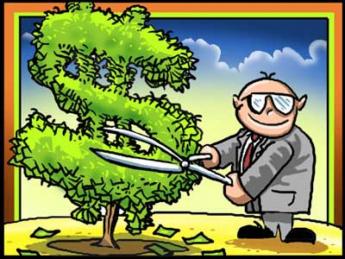
|
| Hedge Fund |
A hedge fund similarly buys and sells stock on its own account, employing the money of investors, and generally adding huge amounts of borrowed debt. In this case, the stock is often held for such short times that voting rights are lost in the registration requirements. Taken as a whole, however, the issue is substantial, since it is reported that 70% of recent transactions have been conducted by unattended computers operating by pre-arranged contingency instructions, often responding in fractions of a second. While the resulting immobilization of voting rights is substantial, the main problem with hedge funds has been the way very small profits have been magnified by staggering amounts of borrowing, potentially causing very large losses if the transaction system is slowed for whatever reason. While hedge funds did perform well during the 2007-2009 crash, it will be 2012 before the incredible volume of transactions can be analyzed to see how close we were to disaster. There is definitely a risk in doing nothing, but probably less than the risk of ill-informed legislation making matters worse in some way.
In the case of ETF, the operator or "manufacturer" of the fund attempts to buy blocks of stock in all or representative samples of the companies listed on some index, weighted in proportion to their weight in the index. The intent is never to sell that stock, merely evaluating the fund price and its dividends as a mathematical exercise, and repurchasing or reselling the calculated bundle to other investors, but never disturbing the contents of the bundle unless the index changes its composition.
In all third-party investing cases except hedge funds, the advantage is that reduced tax and transaction activity saves costs, and avoiding internal selling of stock means essentially no taxes are payable until the investor ultimately sells the fund. The managers of funds maintain that these tax and overhead savings completely compensate for losing whatever opportunities for profit would come along and be exploited by expensive "active" managing of the funds. (Some investment funds employ more Ph.D.'s than any American University does.) Even if the performance turns out to be somewhat lower, there is a safety factor of exactly matching the averages, and thus agreeing to surrender the opportunity to join half of the universe of investors in beating the average, in order to avoid joining the other half of investors in doing worse. Furthermore, distributing the investment over a large group of corporations confers diversification, and thus surrendering the chance of a windfall profit in return for avoiding the occasional disastrous loss. In a sense, the fund investor no longer hopes for a company to do well, he hopes for the whole nation to do well. Summarizing the details, these funds provide safety of diversification and reduction of turnover costs, in return for assured but marginal above-average performance. Since this outcome is so greatly superior to the actual experience of non-professional investors overall, it is highly attractive to many investors and should be attractive to more of them.
In addition to these common features, the hedge funds and private equity expose the investor to the risks and rewards of choosing a skillful manager, who may or may not choose the portfolio wisely, and who may or may not use leverage wisely. The choice of portfolio companies, on average, justify a greater degree of borrowing as their quality improves, and all investment borrowing involves a risk that interest rates may go up for reasons unrelated to the investment. In the recent debacle, hedge funds did comparatively well, but nevertheless, there are times when it is unwise to borrow against even the safest securities. And finally, because of the risk of stock market raids by outsiders, hedge funds are quite secretive about their portfolio contents and force the investor to "lock in" his illiquid investment for several years at a time.
There remains one characteristic of both funds, and for that matter mutual funds, annuities, life insurance and all other forms of aggregated investing through a third party. The third party retains the right to vote the shares, admittedly with some little-used and generally unworkable opportunities for investors to request their own proxies. Such third parties almost always vote the shares in their custody in favor of management. There are occasional exceptions, as when union-managed funds will vote their shares in a political manner, or as when some mutual funds attempt to obtain pension fund business in return for cooperation on selected proxies, or in one legendary story the custodian was instructed: "Always vote AGAINST any management proposal." But these are presently exceptional situations. In the vast majority of cases, the proxy votes effectively disappear, and control of the companies in the portfolio gradually gravitates into the hands of those few stockholders who retain direct ownership and take the trouble to vote it. In fact, it is increasingly the case that the most effective way to frustrate a management proposal is not to vote against it, but to abstain entirely, in the hope that a quorum cannot be assembled.
Another popular movement augments this unfortunate situation. Increasingly, it is urged that top management be paid substantial parts of its reimbursement by stock in the company or options on it. The argument is that it is important to align the motives of top management with the rest of the stockholders. Reflecting concern about some recent events, such stock is or should be forced to bear the covenant that it may not be voted in a stock take-over by an outside raider, to frustrate the commonly used inducement to the manager to sell out his stockholders in a merger. Even when this particular contingency has been foreseen and prevented, the effect of increasing the shares in the hand of management and decreasing the voting shares in the hand of the outside public by freezing them in third-party funds -- soon puts the idea in the heads of managers that they own the company. The recent public indignation about inordinately high salaries for top management, can in large part be traced to the plain fact that voting control of the companies is visibly shifting into the hands of the people who receive those salaries.
Last Will of Benjamin Franklin
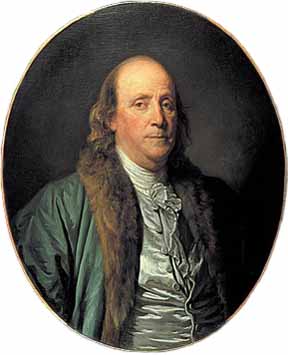
|
| Benjamin Franklin |
The Last Will and Testament of Benjamin Franklin
I, Benjamin Franklin, of Philadelphia, printer, late Minister Plenipotentiary from the United States of America to the Court of France, now President of the State of Pennsylvania, do make and declare my last will and testament as follows:
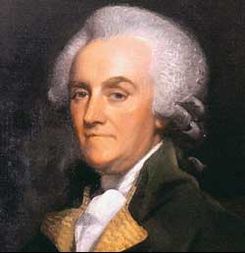
|
| William Franklin |
To my son, William Franklin, late Governor of the Jerseys, I give and devise all the lands I hold or have a right to, in the province of Nova Scotia, to hold to him, his heirs, and assigns forever. I also give to him all my books and papers, which he has in his possession, and all debts standing against him on my account books, willing that no payment for, nor restitution of, the same be required of him, by my executors. The part he acted against me in the late war, which is of public notoriety, will account for my leaving him no more of an estate he endeavored to deprive me of.
Having since my return from France demolished the three houses in Market Street, between Third and Fourth Streets, fronting my dwelling-house, and erected two new and larger ones on the ground, and having also erected another house on the lot which formerly was the passage to my dwelling, and also a printing-office between my dwelling and the front houses; now I do give and devise my said dwelling-house, wherein I now live, my said three new houses, my printing- office and the lots of ground thereto belonging; also my small lot and house in Sixth Street, which I bought off the widow Henmarsh; also my pasture-ground which I have in Hickory Lane, with the buildings thereon; also my house and lot on the North side of Market Street, now occupied by Mary Jacobs, together with two houses and lots behind the same, and fronting on Pewter-Platter Alley; also my lot of ground in Arch Street, opposite the church-burying ground, with the buildings thereon erected; also all my silver plate, pictures, and household goods, of every kind, now in my said dwelling-place, to my daughter, Sarah Bache, and to her husband, Richard Bache, to hold to them for and during their natural lives, and the life of the longest liver of them, and from and after the decease of the survivor of them, I do give, devise, and bequeath to all children already born, or to be born of my said daughter, and to their heirs and assigns forever, as tenants in common, and not as joint tenants.
And, if any or either of them shall happen to die under age, and without issue, the part and share of him, her, or them, so dying, shall go to and be equally divided among the survivors or survivor of them. But my intention is, that, if any or either of them should happen to die under age, leaving issue, such issue shall inherit the part and share that would have passed to his, her, or their parent, had he, she, or they were living.
And, as some of my said devisees may, at the death of the survivor of their father or mother, be of age, and others of them underage, so as that all of them may not be of capacity to make division, I in that case request and authorize the judges of the Supreme Court of Judicature of Pennsylvania for the time being, or any three of them, not personally interested, to appoint by writing, under their hands and seals, three honest, intelligent, impartial men to make the said division, and to assign and allot to each of my devisees their respective share, which division, so made and committed to writing under the hands and seals of the said three men, or any two of them, and confirmed by the said judges, I do hereby declare shall be binding on, and conclusive between the said devisees.
All the lands near the Ohio, and the lots near the centre of Philadelphia, which I lately purchased of the State, I give to my son-in-law, Richard Bache, his heirs and assigns forever; I also give him the bond I have against him, of two thousand and one hundred and seventy-two pounds, five shillings, together with the interest that shall or may accrue thereon, and direct the same to be delivered up to him by my executors, canceled, requesting that, in consideration thereof, he would immediately after my decease manumit and set free his Negro man Bob. I leave to him, also, the money due to me from the State of Virginia for types. I also give to him the bond of William Goddard and his sister, and the counter bond of the late Robert Grace, and the bond and judgment of Francis Childs, if not recovered before my decease, or any other bonds, except the bond due from ----- Killian, of Delaware State, which I give to my grandson, Benjamin Franklin Bache. I also discharge him, my said son-in-law, from all claim and rent of money due to me, on book account or otherwise. I also give him all my musical instruments.

|
| Sarah Bache |
The king of France's picture, set with four hundred and eight diamonds, I give to my daughter, Sarah Bache, requesting , however, that she would not form any of those diamonds into ornaments either for herself or daughters, and thereby introduce or countenance the expensive, vain, and useless fashion of wearing jewels in this country; and those immediately connected with the picture may be preserved with the same.
I give and devise to my dear sister, Jane Mecom, a house and lot I have in Unity Street, Boston, nor or late under the care of Mr. Jonathan Williams, to her and to her heirs and assigns forever. I also give her the yearly sum of fifty pounds sterling, during life, to commence at my death, and to be paid to her annually out of the interests or dividends arising on twelve shares which I have since my arrival at Philadelphia purchased in the Bank of North America, and, at her decease, I give the said twelve shares in the bank to my daughter, Sarah Bache, and her husband, Richard Bache. But it is my express will and desire that, after the payment of the above fifty pounds sterling annually to my said sister, my said daughter be allowed to apply the residue of the interest or dividends on those shares to her sole and separate use, during the life of my said sister, and afterwards the whole of the interest or dividends thereof as her private pocket money.
I give the right I have to take up to three thousand acres of land in the State of Georgia, granted to me by the government of that State, to my grandson, William Temple Franklin, his heirs and assigns forever. I also give to my grandson, William Temple Franklin, the bond and judgment I have against him of four thousand pounds sterling, my right to the same to cease upon the day of his marriage; and if he dies unmarried, my will is, that the same be recovered and divided among my other grandchildren, the children of my daughter, Sarah Bache, in such manner and form as I have herein before given to them the other parts of my estate.
The philosophical instruments I have in Philadelphia I give to my ingenious friend, Francis Hopkinson.
To the children, grandchildren, and great-grandchildren of my brother, Samuel Franklin, that may be living at the time of my decease, I give fifty pounds sterling, to be equally divided among them. To the children, grandchildren, and great-grandchildren of my sister, Anne Harris, that may be living at the time of my decease, I give fifty pounds sterling to be equally divided among them. To the children, grandchildren, and great-grandchildren of my brother James Franklin, that may be living at the time of my decease, I give fifty pounds sterling to be equally divided among them. To the children, grandchildren, and great-grandchildren of my sister, Sarah Davenport, that may be living at the time of my decease, I give fifty pounds sterling to be equally divided among them. To the children, grandchildren, and great-grandchildren of my sister, Lydia Scott, that may be living at the time of my decease, I give fifty pounds sterling to be equally divided among them. To the children, grandchildren, and great-grandchildren of my sister, Jane Mecom, that may be living at the time of my decease, I give fifty pounds sterling to be equally divided among them.
I give to my grandson, Benjamin Franklin Bache, all the types and printing materials, which I now have in Philadelphia, with the complete letter foundry, which, in the whole, I suppose to be worth near one thousand pounds; but if he should die under age, then I do order the same to be sold by my executors, the survivors or survivor of them, and the money be equally divided among all the rest of my said daughter's children, or their representatives, each one on coming of age to take his or her share, and the children of such of them as may die under age to represent and to take the share and proportion of, the parent so dying, each one to receive his or her part of such share as they come of age.
With regard to my books, those I had in France and those I left in Philadelphia, is now assembled together here, and a catalog made of them, it is my intention to dispose of them as follows: My "History of the Academy of Sciences," in sixty or seventy volumes quarto, I give to the Philosophical Society of Philadelphia, of which I have the honor to be President. My collection in a folio of "Les Arts et les Metiers," I give to the American Philosophical Society, established in New England, of which I am a member. My quarto edition of the same, "Arts et Metiers," I give to the Library Company of Philadelphia. Such and so many of my books as I shall mark on my said catalog with the name of my grandson, Benjamin Franklin Bache, I do hereby give to him; and such and so many of my books as I shall mark on the said catalog with the name of my grandson, William Bache, I do hereby give to him; and such as shall be marked with the name of Jonathan Williams, I hereby give to my cousin of that name. The residue and remainder of all my books, manuscripts, and papers, I do give to my grandson, William Temple Franklin. My share in the Library Company of Philadelphia, I give to my grandson, Benjamin Franklin Bache, confiding that he will permit his brothers and sisters to share in the use of it.
I was born in Boston, New England, and owe my first instructions in literature to the free grammar schools established there. I, therefore, give one hundred pounds sterling to my executors, to be by them, the survivors or survivor of them, paid over to the managers or directors of the free schools in my native town of Boston, to be by them, or by those person or persons, who shall have the superintendence and management of the said schools, put out to interest, and so continued at interest forever, which interest annually shall be laid out in silver medals, and given as honorary rewards annually by the directors of the said free schools belonging to the said town, in such manner as to the discretion of the selectmen of the said town shall seem meet.
Out of the salary that may remain due to me as President of the State, I do give the sum of two thousand pounds sterling to my executors, to be by them, the survivors or survivor of them, paid over to such person or persons as the legislature of this State by an act of Assembly shall appoint to receive the same in trust, to be employed for making the river Schuylkill navigable.
And what money of mine shall, at the time of my decease, remain in the hands of my bankers, Messrs. Ferdinand Grand and Son, at Paris, or Messrs. Smith, Wright, and Gray, of London, I will that, after my debts are paid and deducted, with the money legacies of this my will, the same be divided into four equal parts, two of which I give to my dear daughter, Sarah Bache, one to her son Benjamin, and one to my grandson, William Temple Franklin.
During the number of years I was in business as a stationer, printer, and postmaster, a great many small sums became due for books, advertisements, postage of letters, and other matters, which were not collected when, in 1757, I was sent by the Assembly to England as their agent, and by subsequent appointments continued there till 1775, when on my return, I was immediately engaged in the affairs of Congress and sent to France in 1776, where I remained nine years, not returning till 1785, and the said debts, not being demanded in such a length of time, are become in a manner obsolete, yet are nevertheless justly due. These, as they are stated in my great folio ledger E, I bequeath to the contributors to the Pennsylvania Hospital, hoping that those debtors, and the descendants of such as are deceased, who now, as I find, make some difficulty of satisfying such antiquated demands as just debts, may, however, be induced to pay or give them as charity to that excellent institution. I am sensible that much must inevitably be lost, but I hope something considerable may be recovered. It is possible, too, that some of the parties charged may have existing old, unsettled accounts against me; in which case the managers of the said hospital will allow and deduct the amount, or pay the balance if they find it against me.
My debts and legacies being all satisfied and paid, the rest and residue of all my estate, real and personal, not herein expressly disposed of, I do give and bequeath to my son and daughter, Richard and Sarah Bache.
I request my friends, Henry Hill, Esquire, John Jay, Esquire, Francis Hopkinson, Esquire, and Mr. Edward Duffield, of Benfield, in Philadelphia County, to be the executors of this my last will and testament; and I hereby nominate and appoint them for that purpose.
I would have my body buried with as little expense or ceremony as may be. I revoke all former wills by me made, declaring this only to be my last.
In witness whereof, I have hereunto set my hand and seal, this seventeenth day of July, in the year of our Lord, one thousand seven hundred and eighty-eight.
B. Franklin
Signed, sealed, published, and declared by the above named Benjamin Franklin, for and as his last will and testament, in the presence of us.
Abraham Shoemaker, John Jones, George Moore.
CODICIL
I, Benjamin Franklin, in the foregoing or annexed last will and testament named, having further considered the same, do think proper to make and publish the following codicil or addition thereto.
It has long been a fixed political opinion of mine, that in a democratical state there ought to be no offices of profit, for the reasons I had given in an article of my drawing in our constitution, it was my intention when I accepted the office of President, to devote the appointed salary to some public uses. Accordingly, I had already, before I made my will in July last, given large sums of it to colleges, schools, the building of churches, etc.; and in that will I bequeathed two thousand pounds more to the State for the purpose of making the Schuylkill navigable. But understanding since that such a work, and that the project is not likely to be undertaken for many years to come, and having entertained another idea, that I hope may be more extensively useful, I do hereby revoke and annul that bequest, and direct that the certificates I have for what remains due to me of that salary be sold, towards raising the sum of two thousand pounds sterling, to be disposed of as I am now about to order.
It has been an opinion, that he who receives an estate from his ancestors is under some kind of obligation to transmit the same to their posterity. This obligation does not lie on me, who never inherited a shilling from an ancestor or relation. I shall, however, if it is not diminished by some accident before my death, leave a considerable estate among my descendants and relations. The above observation is made as merely as some apology to my family for making bequests that do not appear to have any immediate relation to their advantage.
I was born in Boston, New England, and owe my first instructions in literature to the free grammar schools established there. I have, therefore, already considered these schools in my will. But I am also under obligations to the State of Massachusetts for having, unasked, appointed me formerly their agent in England, with a handsome salary, which continued some years; and although I accidentally lost in their service, by transmitting Governor Hutchinson's letters, much more than the amount of what they gave me, I do not think that ought in the least to diminish my gratitude.
I have considered that, among artisans, good apprentices are most likely to make good citizens, and, having myself been bred to a manual art, printing, in my native town, and afterward assisted to set up my business in Philadelphia by kind loans of money from two friends there, which was the foundation of my fortune, and all the utility in life that may be ascribed to me, I wish to be useful even after my death, if possible, in forming and advancing other young men, that may be serviceable to their country in both these towns. To this end, I devote two thousand pounds sterling, of which I give one thousand thereof to the inhabitants of the town of Boston, in Massachusetts, and the other thousand to the inhabitants of the city of Philadelphia, in trust, to and for the uses, intents, and purposes hereinafter mentioned and declared.
The said sum of one thousand pounds sterling, if accepted by the inhabitants of the town of Boston, shall be managed under the direction of the selectmen, united with the ministers of the oldest Episcopalians, Congregational, and Presbyterian churches in that town, who are to let out the sum upon interest, at five per cent, per annum, to such young married artificers, under the age of twenty-five years, as have served an apprenticeship in the said town, and faithfully fulfilled the duties required in their indentures, so as to obtain a good moral character from at least two respectable citizens, who are willing to become their sureties, in a bond with the applicants, for the repayment of the moneys so lent, with interest, according to the terms hereinafter prescribed; all which bonds are to be taken for Spanish milled dollars, or the value thereof in current gold coin; and the managers shall keep a bound book or books, wherein shall be entered the names of those who shall apply for and receive the benefits of this institution, and of their sureties, together with the sums lent, the dates, and other necessary and proper records respecting the business and concerns of this institution. And as these loans are intended to assist young married artificers in setting up their business, they are to be proportioned by the discretion of the managers, so as not to exceed sixty pounds sterling to one person, nor to be less than fifteen pounds; and if the number of appliers so entitled should be so large as that the sum will not suffice to afford to each as much as might otherwise not be improper, the proportion to each shall be diminished so as to afford to everyone some assistance. These aids may, therefore, be small at first, but, as the capital increases by the accumulated interest, they will be ampler. And in order to serve as many as possible in their turn, as well as to make the repayment of the principal borrowed easier, each borrower shall be obliged to pay, with the yearly interest, one-tenth part of the principal and interest, so paid in, shall be again let out to fresh borrowers.
And, as it is presumed that there will always be found in Boston virtuous and benevolent citizens, willing to bestow a part of their time in doing good to the rising generation, by superintending and managing this institution gratis, it is hoped that no part of the money will at any time be dead, or be diverted to other purposes, but be continually augmenting by the interest; in which case there may, in time, be more than the occasions in Boston shall require, and then some may be spared to the neighboring or other towns in the said State of Massachusetts, who may desire to have it; such towns engaging to pay punctually the interest and the portions of the principal, annually, to the inhabitants of the town of Boston.
If this plan is executed, and succeeds as projected without interruption for one hundred years, the sum will then be one hundred and thirty-one thousand pounds; of which I would have the managers of the donation to the town of Boston then layout, at their discretion, one hundred thousand pounds in public works, which may be judged of most general utility to the inhabitants, such as fortifications, bridges, aqueducts, public buildings, baths, pavements, or whatever may make living in the town more convenient to its people, and render it more agreeable to strangers resorting thither for health or a temporary residence. The remaining thirty-one thousand pounds I would have continued to be let out on interest, in the manner above directed, for another hundred years, as I hope it will have been found that the institution has had a good effect on the conduct of youth, and been of service to many worthy characters and useful citizens. At the end of this second term, if no unfortunate accident has prevented the operation, the sum will be four million and sixty-one thousand pounds sterling, of which I leave one million sixty-one thousand pounds to the disposition of the inhabitants of the town of Boston, and three million to the disposition of the government of the state, not presuming to carry my views farther.
All the directions herein given, respecting the disposition and management of the donation to the inhabitants of Boston, I would have observed respecting that to the inhabitants of Philadelphia, only, as Philadelphia is incorporated, I request the corporation of that city to undertake the management agreeably to the said directions; and I do hereby vest them with full and ample powers for that purpose. And, having considered that the covering a ground plot with buildings and pavements, which carry off most of the rain and prevent its soaking into the Earth and renewing and purifying the Springs, whence the water of wells must gradually grow worse, and in time be unfit for use, as I find has happened in all old cities, I recommend that at the end of the first hundred years, if not done before, the corporation of the city Employ a part of the hundred thousand pounds in bringing, by pipes, the water of Wissahickon Creek into the town, so as to supply the inhabitants, which I apprehend may be done without great difficulty, the level of the creek is much above that of the city, and may be made higher by a dam. I also recommend making the Schuylkill completely navigable. At the end of the second hundred years, I would have the disposition of the four million and sixty-one thousand pounds divided between the inhabitants of the city of Philadelphia and the government of Pennsylvania, in the same manner as herein directed with respect to that of the inhabitants of Boston and the government of Massachusetts.
It is my desire that this institution should take place and begin to operate within one year after my decease, for which purpose due notice should be publicly given previous to the expiration of that year, that those for whose benefit this establishment is intended may make their respective applications. And I hereby direct my executors, the survivors or survivor of them, within six months after my decease, to pay over the sum of two thousand pounds sterling to such persons as shall be duly appointed by the Selectmen of Boston and the corporation of Philadelphia, to receive and take charge of their respective sums, of one thousand pounds each, for the purposes aforesaid.
Considering the accidents to which all human affairs and projects are subject in such a length of time, I have, perhaps, too much flattered myself with a vain fancy that these dispositions, if carried into execution, will be continued without interruption and have the effects proposed. I hope, however, that is the inhabitants of the two cities should not think fit to undertake the execution, they will, at least, accept the offer of these donations as a mark of my good will, a token of my gratitude, and a testimony of my earnest desire to be useful to them after my departure.
I wish, indeed, that they may both undertake to endeavor the execution of the project, because I think that, though unforeseen difficulties may arise, expedients will be found to remove them, and the scheme be found practicable. If one of them accepts the money, with the conditions, and the other refuses, my will then is, that both Sums be given to the inhabitants of the city accepting the whole, to be applied to the same purposes, and under the same regulations directed for the separate parts; and, if both refuse, the money, of course, remains in the mass of my Estate, and is to be disposed of therewith according to my will made the Seventeenth day of July, 1788.
I wish to be buried by the side of my wife, if it may be, and that a marble stone, to be made by Chambers, six feet long, four feet wide, plain, with only a small molding around the upper edge, and this inscription:
Benjamin And Deborah Franklin 178-
to be placed over us both. My fine crab-tree walking stick, with a gold head, curiously wrought in the form of the cap of liberty, I give to my friend, and the friend of mankind, General Washington. If it were a Sceptre, he has merited it and would become it. It was a present to me from that excellent woman, Madame de Forbach, the Dowager Duchess of Deux-Ponts, connected with some verses which should go with it. I give my gold watch to my son-in-law Richard Bache, and also the gold watch chain of the Thirteen United States, which I have not yet worn. My timepiece, that stands in my library, I give to my grandson, William Temple Franklin. I give him also my Chinese gong. To my dear old friend, Mrs. Mary Hewson, I give one of my silver tankards marked for her use during her life, and after her decease, I give it to her daughter Eliza. I give to her son, William Hewson, who is my godson, my new quarto Bible, and also the botanic description of the plants in the Emperor's garden at Vienna, in folio, with colored cuts.
And to her son, Thomas Hewson, I give a set of "Spectators, Tattlers, and Guardians" handsomely bound.
There is an error in my will, where the bond of William Temple Franklin is mentioned as being four thousand pounds sterling, whereas it is but for three thousand five hundred pounds.
I give to my executors, to be divided equally among those that act, the sum of sixty pounds sterling, as some compensation for their trouble in the execution of my will; and I request my friend, Mr. Duffield, to accept moreover my French waywiser, a piece of clockwork in Brass, to be fixed to the wheel of any carriage; and that my friend, Mr. Hill, may also accept my silver cream pot, formerly given to me by the good Doctor Fothergill, with the motto, Keep bright the Chain. My reflecting telescope, made by Short, which was formerly Mr. Canton's, I give to my friend, Mr. David Rittenhouse, for the use of his observatory.
My picture, drawn by Martin, in 1767, I give to the Supreme Executive Council of Pennsylvania, if they shall be pleased to do me the honor of accepting it and placing it in their chamber. Since my will was made I have bought some more city lots, near the center part of the estate of Joseph Dean. I would have them go with the other lots, disposed of in my will, and I do give the same to my Son-in-law, Richard Bache, to his heirs and assigns forever.
In addition to the annuity left to my sister in my will, of fifty pounds sterling during her life, I now add thereto ten pounds sterling more, in order to make the Sum sixty pounds. I give twenty guineas to my good friend and physician, Dr. John Jones.
With regard to the separate bequests made to my daughter Sarah in my will, my intention is, that the same shall be for her sole and separate use, notwithstanding her coverture, or whether she be covert or sole; and I do give my executors so much right and power therein as may be necessary to render my intention effectual in that respect only. This provision for my daughter is not made out of any disrespect I have for her husband.
And lastly, it is my desire that this, my present codicil, be annexed to, and considered as part of, my last will and testament to all intents and purposes.
In witness whereof, I have hereunto set my hand and Seal this twenty-third day of June, Anno Domini one thousand Seven hundred and eighty-nine.
B. Franklin.
Signed, sealed, published, and declared by the above named Benjamin Franklin to be a codicil to his last will and testament, in the presence of us.
Francis Bailey, Thomas Lang, Abraham Shoemaker.
Franklin Benefits the Pennsylvania Hospital
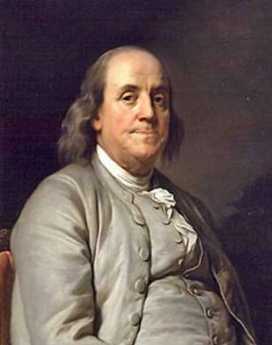
|
| Benjamin Franklin |
During the number of years I was in business as a stationer, printer, and postmaster, a great many small sums became due for books, advertisements, postage of letters, and other matters, which were not collected when, in 1757, I was sent by the Assembly to England as their agent, and by subsequent appointments continued there till 1775, when on my return, I was immediately engaged in the affairs of Congress and sent to France in 1776, where I remained nine years, not returning till 1785, and the said debts, not being demanded in such a length of time, are become in a manner obsolete, yet are nevertheless justly due. These, as they are stated in my great folio ledger E, I bequeath to the contributors to the Pennsylvania Hospital, hoping that those debtors, and the descendants of such as are deceased, who now, as I find, make some difficulty of satisfying such antiquated demands as just debts, may, however, be induced to pay or give them as charity to that excellent institution. I am sensible that much must inevitably be lost, but I hope something considerable may be recovered. It is possible, too, that some of the parties charged may have existing old, unsettled accounts against me; in which case the managers of the said hospital will allow and deduct the amount, or pay the balance if they find it against me.
REFERENCES
| A Medical History of Benjamin Fanklin: Troubled Water: Benjamin Samuel Abeshouse ASIN: B0069X8GFS | Amazon |
Franklin Teaches Investing to Boston and Philadelphia
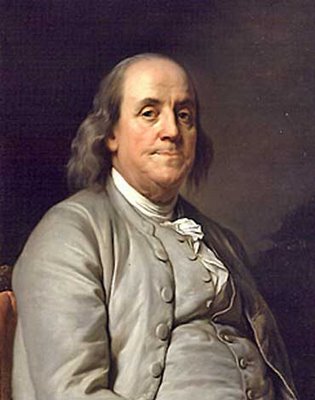
|
| Benjamin Franklin |
CODICIL: I, Benjamin Franklin, in the foregoing or annexed last will and testament named, having further considered the same, do think proper to make and publish the following codicil or addition thereto.
It has long been a fixed political opinion of mine, that in a democratical state there ought to be no offices of profit, for the reasons I had given in an article of my drawing in our constitution, it was my intention when I accepted the office of President, to devote the appointed salary to some public uses. Accordingly, I had already, before I made my will in July last, given large sums of it to colleges, schools, the building of churches, etc.; and in that will I bequeathed two thousand pounds more to the State for the purpose of making the Schuylkill navigable. But understanding since that such a work, and that the project is not likely to be undertaken for many years to come, and having entertained another idea, that I hope may be more extensively useful, I do hereby revoke and annul that bequest, and direct that the certificates I have for what remains due to me of that salary be sold, towards raising the sum of two thousand pounds sterling, to be disposed of as I am now about to order.
It has been an opinion, that he who receives an estate from his ancestors is under some kind of obligation to transmit the same to their posterity. This obligation does not lie on me, who never inherited a shilling from an ancestor or relation. I shall, however, if it is not diminished by some accident before my death, leave a considerable estate among my descendants and relations. The above observation is made as merely as some apology to my family for making bequests that do not appear to have any immediate relation to their advantage.
I was born in Boston, New England, and owe my first instructions in literature to the free grammar schools established there. I have, therefore, already considered these schools in my will. But I am also under obligations to the State of Massachusetts for having, unasked, appointed me formerly their agent in England, with a handsome salary, which continued some years; and although I accidentally lost in their service, by transmitting Governor Hutchinson's letters, much more than the amount of what they gave me, I do not think that ought in the least to diminish my gratitude.
I have considered that, among artisans, good apprentices are most likely to make good citizens, and, having myself been bred to a manual art, printing, in my native town, and afterward assisted to set up my business in Philadelphia by kind loans of money from two friends there, which was the foundation of my fortune, and all the utility in life that may be ascribed to me, I wish to be useful even after my death, if possible, in forming and advancing other young men, that may be serviceable to their country in both these towns. To this end, I devote two thousand pounds sterling, of which I give one thousand thereof to the inhabitants of the town of Boston, in Massachusetts, and the other thousand to the inhabitants of the city of Philadelphia, in trust, to and for the uses, intents, and purposes hereinafter mentioned and declared.
The said sum of one thousand pounds sterling, if accepted by the inhabitants of the town of Boston, shall be managed under the direction of the selectmen, united with the ministers of the oldest Episcopalians, Congregational, and Presbyterian churches in that town, who are to let out the sum upon interest, at five per cent, per annum, to such young married artificers, under the age of twenty-five years, as have served an apprenticeship in the said town, and faithfully fulfilled the duties required in their indentures, so as to obtain a good moral character from at least two respectable citizens, who are willing to become their sureties, in a bond with the applicants, for the repayment of the moneys so lent, with interest, according to the terms hereinafter prescribed; all which bonds are to be taken for Spanish milled dollars, or the value thereof in current gold coin; and the managers shall keep a bound book or books, wherein shall be entered the names of those who shall apply for and receive the benefits of this institution, and of their sureties, together with the sums lent, the dates, and other necessary and proper records respecting the business and concerns of this institution. And as these loans are intended to assist young married artificers in setting up their business, they are to be proportioned by the discretion of the managers, so as not to exceed sixty pounds sterling to one person, nor to be less than fifteen pounds; and if the number of appliers so entitled should be so large as that the sum will not suffice to afford to each as much as might otherwise not be improper, the proportion to each shall be diminished so as to afford to everyone some assistance. These aids may, therefore, be small at first, but, as the capital increases by the accumulated interest, they will be ampler. And in order to serve as many as possible in their turn, as well as to make the repayment of the principal borrowed easier, each borrower shall be obliged to pay, with the yearly interest, one-tenth part of the principal and interest, so paid in, shall be again let out to fresh borrowers.
And, as it is presumed that there will always be found in Boston virtuous and benevolent citizens, willing to bestow a part of their time in doing good to the rising generation, by superintending and managing this institution gratis, it is hoped that no part of the money will at any time be dead, or be diverted to other purposes, but be continually augmenting by the interest; in which case there may, in time, be more than the occasions in Boston shall require, and then some may be spared to the neighboring or other towns in the said State of Massachusetts, who may desire to have it; such towns engaging to pay punctually the interest and the portions of the principal, annually, to the inhabitants of the town of Boston.
If this plan is executed, and succeeds as projected without interruption for one hundred years, the sum will then be one hundred and thirty-one thousand pounds; of which I would have the managers of the donation to the town of Boston then lay out, at their discretion, one hundred thousand pounds in public works, which may be judged of most general utility to the inhabitants, such as fortifications, bridges, aqueducts, public buildings, baths, pavements, or whatever may make living in the town more convenient to its people, and render it more agreeable to strangers resorting thither for health or a temporary residence. The remaining thirty-one thousand pounds I would have continued to be let out on interest, in the manner above directed, for another hundred years, as I hope it will have been found that the institution has had a good effect on the conduct of youth, and been of service to many worthy characters and useful citizens. At the end of this second term, if no unfortunate accident has prevented the operation, the sum will be four million and sixty-one thousand pounds sterling, of which I leave one million sixty-one thousand pounds to the disposition of the inhabitants of the town of Boston, and three millions to the disposition of the government of the state, not presuming to carry my views farther.
All the directions herein given, respecting the disposition and management of the donation to the inhabitants of Boston, I would have observed respecting that to the inhabitants of Philadelphia, only, as Philadelphia is incorporated, I request the corporation of that city to undertake the management agreeably to the said directions; and I do hereby vest them with full and ample powers for that purpose. And, having considered that the covering a ground plot with buildings and pavements, which carry off most of the rain and prevent its soaking into the Earth and renewing and purifying the Springs, whence the water of wells must gradually grow worse, and in time be unfit for use, as I find has happened in all old cities, I recommend that at the end of the first hundred years, if not done before, the corporation of the city Employ a part of the hundred thousand pounds in bringing, by pipes, the water of Wissahickon Creek into the town, so as to supply the inhabitants, which I apprehend may be done without great difficulty, the level of the creek is much above that of the city, and may be made higher by a dam. I also recommend making the Schuylkill completely navigable. At the end of the second hundred years, I would have the disposition of the four million and sixty-one thousand pounds divided between the inhabitants of the city of Philadelphia and the government of Pennsylvania, in the same manner as herein directed with respect to that of the inhabitants of Boston and the government of Massachusetts.
It is my desire that this institution should take place and begin to operate within one year after my decease, for which purpose due notice should be publicly given previous to the expiration of that year, that those for whose benefit this establishment is intended may make their respective applications. And I hereby direct my executors, the survivors or survivor of them, within six months after my decease, to pay over the sum of two thousand pounds sterling to such persons as shall be duly appointed by the Selectmen of Boston and the corporation of Philadelphia, to receive and take charge of their respective sums, of one thousand pounds each, for the purposes aforesaid.
Considering the accidents to which all human affairs and projects are subject in such a length of time, I have, perhaps, too much flattered myself with a vain fancy that these dispositions, if carried into execution, will be continued without interruption and have the effects proposed. I hope, however, that if the inhabitants of the two cities should not think fit to undertake the execution, they will, at least, accept the offer of these donations as a mark of my good will, a token of my gratitude, and a testimony of my earnest desire to be useful to them after my departure.
I wish, indeed, that they may both undertake to endeavor the execution of the project, because I think that, though unforeseen difficulties may arise, expedients will be found to remove them, and the scheme be found practicable. If one of them accepts the money, with the conditions, and the other refuses, my will then is, that both Sums be given to the inhabitants of the city accepting the whole, to be applied to the same purposes, and under the same regulations directed for the separate parts; and, if both refuse, the money, of course, remains in the mass of my Estate, and is to be disposed of therewith according to my will made the Seventeenth day of July, 1788.
..........................................................And lastly, it is my desire that this, my present codicil, be annexed to, and considered as part of, my last will and testament to all intents and purposes.
In witness whereof, I have hereunto set my hand and Seal this twenty-third day of June, Anno Domini one thousand Seven hundred and eighty-nine.
B. Franklin.
Sad Aftermath
Extracted from a printed Report of the Committee of Legacies and Trusts, made in the Common Council of Philadelphia April 27th, 1837, by Mr. John Thomason, chairman of the Committee.
"From official returns, it appears, that up to the 1st of January, 1837, the fund has been borrowed by one hundred and ninety-three individuals, in sums mostly of $ 260 each. At that date, the fund was in the hands of one hundred and twelve beneficiaries, of whom nineteen have paid neither principal nor interest, although the accounts of some of them have been open for a period of thirty-four years. Ninety other persons stand indebted in sums from $ 21 to $ 292; and three, having borrowed within the year, were not, at the last-mentioned date, liable to any demand by the trustees. Of these one hundred and nine cases of non-compliance with the terms of the will, fifty-eight bonds may be subject to a plea of the statute of limitation, and the rest is still valid. In this condition of the fund, it becomes difficult to estimate its present value. Should all the debts be recovered, the amount of the fund would be $ 23,627.09; but, from the length of time elapsed since the date of many of those bonds, such a result is hopeless; and even this latter sum, large as it is, is below the amount it would have attained at this time had the intentions of the testator been fully carried out. The original bequest of $4,444.44, at compound interest for forty-five years, would be $ 39,833.29 ; and, although the immediate conversion of interest into principal, as the former becomes due, is not always practical, yet it is believed, that, with careful management, the fund would, at this time, have lacked but little of that amount. How far the fund falls short, may be partly judged from the actual receipts on account of this legacy for the last ten years. During that time the sum of $ 16,191.92 has been paid in. As this period included the term for lending out, and receiving back with interest, the whole fund, the receipts within that term may be taken as a safe approximation to its real value; to which must be added the sum to be obtained through the enforcing of payment, by legal process, from such securities as may be good at this late day. Had the fund been placed at simple interest, it would have amounted to the last-mentioned sum by this time.
"Had the requirements of the will been, in former years, fully complied with, the operation of the fund, at this day, would be sensibly felt by the mechanics of Philadelphia. Passing from one borrower to another, and increasing in a compound ratio, its effect would be to stimulate useful industry, which, without such capital, would have remained unproductive. It would have increased the number of those who do business on their own stock. It would be a standing lesson on the immutable connexion between capital and productive industry, thus constantly inciting to economy and prudence. It would have become the reward of every faithful apprentice, who could look forward to a participation in its benefit. It is deeply to be regretted, that this state of things, which had so captivated the imagination of Franklin that he devoted a portion of his hard-earned wealth to realize it for the mechanics of Philadelphia, should, in the emphatic language of his will, prove 'a vain fancy. ' "
By this statement it would seem, that there had been at some time a remarkable want of fidelity in administering the trust, especially in allowing so large a number of bonds to become worthless by the statute of limitation, and neglecting to make reasonable- demands upon the sureties.
Appended to the same report is a letter from Mr. William Minot, treasurer of the Franklin Fund in Boston, dated December 23d, 1836, which contains the following state, of the fund in that city.
"The whole number of loans from this Fund," Mr. Minot says, " from May 1791 to the present time, has been 255, in sums varying from 70 to $ 266 up to the year 1800, since which time they have usually been 200.
"From July, 1811, to the present time, the number of loans has been 91, of which 50, at least have been repaid (in whole or in part) by sureties, and on four of these are balances which cannot be collected, both principals and sureties being insolvent.
" Dr. Franklin's donation was Pound 1,000 sterling. The present value of the Fund is as follows;
"Estimate of 13 bonds, considered good, 1,428.68 "Amount deposited, on interest, in the office of the Massachusetts Hospital Life Insurance Company, 22,739.00 Cash in the hands of the Treasurer 158.15
$24,325.83
"It is apparent, from these facts, that the benevolent intentions of the donor have not been realized, and that, in the present condition of our country, it is not advantageous to married mechanics, under the age of twenty-four years, to borrow money to be repaid in easy installments, at a low rate of interest; and the improvidence of early marriages, among that class of men, may fairly be inferred.
"The great number of instances, in which sureties have been obliged to pay the loans, has rendered it not so easy, as formerly, for applicants to obtain the required security. This is proved by the small number of loans from the fund, averaging for the last five years, not more than one a year.
"Until within the last twenty years, no great care was taken in accumulating the fund. It is now carefully attended to; and money not required for actual use is placed in the Life Insurance Company, where it increases at the rate of about five and one-third percent a year.
"The loans are made at the rate of five percent, but, on installments past due, six percent is charged, from the time they were payable, and the bonds of delinquents are put in a suit after reasonable notice. Two sureties, at least, are required on each bond."
According to the treasurer's return on a lot of January 1840, the amount of the fund in Boston was at that time as follows.
Deposited in the Life Insurance office, 26,595.64
Bonds for Loans 1,846.35 $28,441.99
Unique Investment Requirements

|
| Special Investment Situations |
Let's announce the purpose of this preamble about special investment situations, right now. In the great majority of cases, the mission of investment management is simply stated: make as much money as possible, and then retire on it. But two extreme situations lead to conclusions about investment policy which differ so radically from each other, it might pay to ask at the beginning whether they somewhat apply to our own cases. One would be that mythical individual who is so rich he can realistically be indifferent to investment outcomes. At the opposite extreme is the non-profit institution which is totally dependent on a steady stream of endowment income, theoretically into perpetuity, but in any event without interruption. The non-profit's contribution to society is limited by the amount of investment income it can generate, while by contrast, the tycoon is so well off that for him, life will go on, about the same, whether he invests well or poorly, or indeed at all.
Our society recognizes that unique dependence of non-profit institutions on their investment income and confers an exemption from taxes to philanthropies. So the investment income of nonprofit companies has two unique features: it needs to be steady, and it has no concern about taxes. Taken together, these two conflicting features grow out of tensions between the rich and comfortable who support the philanthropy, and the sense of entitlement of the artists, writers, and performers, who as a group are usually paid lower wages. But not invariably. Entertainers are sometimes able to exploit their celebrity to the point where they can be the most highly paid people in the whole workforce. This paradox sometimes creates social dissonance within philanthropies, between the rich trustees of an opera company seated in the boxes let's say, and the equally rich soloists standing on the stage. The stagehands, moderately overpaid because of unions, reflect the class warfare sentiments of a century earlier; the only stakeholders actually pinched by economics are the general audience, seated in the back rows of the auditorium unless they stay home during a recession. Such organizations are uniquely well advised to have a steady income from bonds at all times, to keep the place running during recessions. Otherwise, bonds are often a poor investment.
The hostilities and discontents of various components of the opera family are not the usual sources of main difficulty for the investment manager of such philanthropy. His grief arises from the need to "meet his payroll", week after week. The stock market may rise and fall, the popularity of the performances may ebb and flow, the stagehands may go on strike. But the business manager must meet the payroll in good times and bad. Consequently, the business manager has an incentive to invest in bonds because of the steady income they generally provide. The opera company does generate ticket income; many other philanthropies have no income at all except for investment income, much exaggerating the need for steadiness from that source.
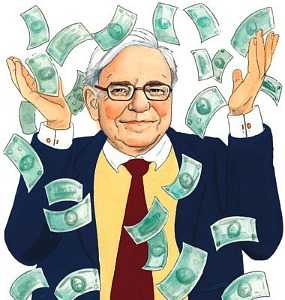
|
| Berkshire Hathaway |
At the other end of the spectrum, some extremely wealthy persons have essentially no need for income at all, at least income derived from major sections of their assets. For such persons, the question arises, why pay income taxes if you don't need income? If the assets are large, the management burden may become large as well, and there may be very little point to this administrative effort except that the government says it must be done. Persons in this happy situation often invest in assets like Canadian forests whose income is only foreseen in the far distant future, or in Berkshire Hathaway for example which deliberately generates no income or income taxes. In the case of Maharajahs or other obscenely wealthy people, there may even be no point in accumulating extra assets, or income, or the investment managers needed to select it. Even a modestly wealthy person gets into this situation when he becomes extremely elderly or extremely sick; he can't spend any of it, so why have it?
But not so fast. A comparatively young person, well educated and earning a comfortable income, may have no need for investment income for years to come, but he will certainly need it sometime. When he can afford to retire, he eventually does so, and at that moment his investment portfolio abruptly switches from a vague nuisance into his main source of his income. His investment outlook, therefore, should switch from that of a Maharajah to that of a single-client investor with a payroll to meet. Too many advisors ignore this fairly common situation, and advise a standard average portfolio design from age 20 to age 70, from the days when the client is a clerk to the day he becomes chairman of the board, someday even to being an invalid fed with a spoon. But it's hard to see the logic of investment rigidity throughout these life changes. To modify the revenue approach is not to "play the market" or to engage in market-timing. It is to adapt your behavior to your position in life.
This flexibility particularly applies to one's tax situation, which can vary from one extreme to the other throughout life. There is no sense in paying taxes on investment income unless the money is then spent. If there is no current need for spending money, there is no sense in paying taxes on investment income. Let the investment income accumulate untaxed unless there is no other income to spend. The consequence of this simple rule is that there are significant disadvantages to buying high-dividend stocks, at the same time that certain investment advisors are recommending nothing else. It is claimed that high-dividend stocks out-perform the market, which may sometimes be true. But it is always true that if the dividends are not spent in the same tax year they are distributed, the tax on the earnings they represent would accumulate untaxed if you had bought non-dividend stock. Eventually, such accumulations are taxed when the stock is sold, but ordinarily at a significantly lower tax rate. The present apparent advantage of high dividend stock performance is mainly a result of abnormally low-interest rates, which presumably will not last indefinitely. While this situation continues, it creates relatively little new taxes for the retiree spending up his investment income; it is the young person in his earning years who should be wary of unnecessary taxes of this sort.
How to Live Off an Investment Portfolio
Many studies have been done. The rule is this ...
If you have a well-diversified investment portfolio, and
- You want to live off the proceeds
- ... for a long time (20+ years)
You must withdraw no more than 4% per year.
- If your expenses are greater than 4% of your portfolio
- Reduce your expenses
and/or - Find outside sources of income
- Reduce your expenses
- If your investment portfolio is not well diversified it
will not last as long
(in other words, don't try to beat the market) - If your investment portfolio has high fees it will not last as long
| Sample Diversified Portfolio | |
| Asset Class | Symbol |
|---|---|
| US Total Market | VTI |
| Europe Developed | VGK |
| Asia Developed | VPL |
| Emerging Markets | VWO |
| US REITs | VNQ |
| Commodities | DJP |
| US Gov't Long | TLT |
| TIPS | TIP |
Plus a money market for cash
Is Stock Trading Passe?
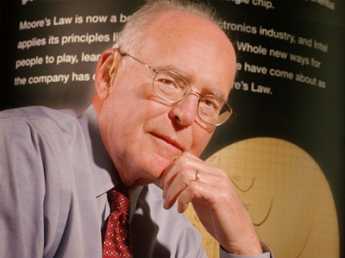
|
| Gordon Moore |
Moore's Law is named after Gordon Moore, who pointed out that computer chips seemed to double their speed every few years, an important issue affecting the cost of computers and the heat they give off while operating, and so on. In fifty years, there have been enough doublings of speed to make it often irrelevant whether they get any faster for the job they are intended to do. No one really cares whether a blink of an eye gets any quicker. The question is beginning to arise whether it makes any practical difference if the trading of stocks gets faster.

|
| U.S. Stocks |
At the moment, it's widely quoted that 70% of stock trades on major exchanges are now conducted between two unattended computers; it won't be long before 100% are. All of the inefficiencies of trading pits, with shouting and shoving, winking and maybe some front-running, will vanish into the humming of progressively smaller electric machines. Kinks will appear then get ironed out, perhaps after another Long Term Capital episode or two. The cost of trading will become vanishingly small, essentially a chess game between mathematics wizards. But volatility will smooth out, and costs will become negligible. So far as we can see, that's the end of the line, beyond which a computer speed sixteen times as fast serves no extra purpose.
But John Bogle, who invented the index fund and grew Vanguard to several trillion in assets, amused himself recently in front of a bedazzled audience. Several large funds, maybe even a lot of them, are taking what looks like a static mass of sleeping stocks and trading them internally at a rate of thousands per second, hoping to make a tiny fraction of a penny per trade individually, and a whole lot of profit for the managers in aggregate, while giving the appearance of standing still. Is this a good thing or a bad thing? Hard to say. John Bogle seems to imply it might even be a bad thing. Whatever it is, it is not the end of the line.
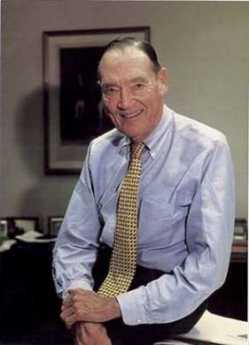
|
| John Bogle |
For completeness, look at the opposite end of this spectrum. Once more, it is John Bogle who points out that the price of the stock can be divided into its earnings, its dividends, and its speculative volatility. Total earnings for the past century have averaged 9.1%, but if you strip off the effect of price-to-earnings variance, you have an investment return of 8.8%, essentially the same in the eyes of normal people. The way an investor could strip away the P/E volatility -- is to buy the whole company. When you own the whole company, public opinion stops influencing the price. Holding companies can do that, as can private equity funds, and even Warren Buffett. If you are playing this game, all you need is a big-enough holding company with honest management or at least one independent method for estimating a fair price. If you are a value investor like Warren, buying the company for a P/E ratio well below 12.5 and holding it forever, you ought to achieve a return which significantly exceeds 8.8%. If you are an investment bank on Wall Street, you may buy the stock cheap, fix it up, and sell it rather soon for a much higher P/E ratio. Either way, there are transaction costs and taxes only twice, when you buy it and when you sell it. An investment company can do all kinds of things, but an individual investor should know enough to adjust his buying (of shares of these intermediaries) to a youthful stage of life, and his selling to his retirement years. It cannot be claimed the quirks have been completely worked out, but it's a start. Come back in a few years and see what has been added to this idea to make it air-tight.
Bonds--Do They Have A Future?
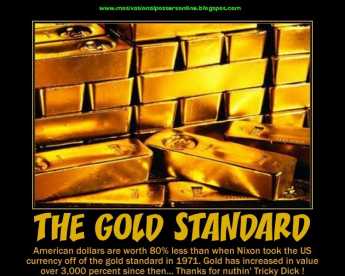
|
| Relic of the Past? |
EVER since we finally went off the gold standard completely during the Nixon Administration, the Federal Reserve has adjusted our money supply to create a fairly steady 2% inflation. If inflation is ever less than 2%, the Fed puts more money into circulation. Since many bonds are paying less than a 2% dividend, everybody who buys and holds them at par will lose money in "real" terms. That is, everyone who buys bonds when they are issued and sells them when they mature will lose spending power. Since they fluctuate in the meantime, it is possible for a trader to buy them when they are undervalued by the market. That trader will possibly make money, but only because someone else lost money. Something like that occurred during the recent financial crash bailout, when interest rates declined from 3% to less than 2% but were repurchased by the Fed as "Quantitative Easing", effectively giving speculators a 33% profit at government expense. But that doesn't happen often, and just guess who ultimately lost the money the speculators made. There is also that daunting question: when the time comes for the Federal Reserve to disgorge them, just who is going to buy all these cheapened bonds? In Japan, bonds paid a dividend of less than the rate of inflation for more than a decade; it's hard to think of a reason why the same thing could not happen in America. So it's also hard to imagine a reason why buy-and-hold investors should not abandon bonds, perhaps suddenly all at once, at some unknown time in the future. At that point, many of them will resolve never to try that, again. The whole idea is troubling.
It's particularly troubling in view of the lack of success, so far, of TIPS. These vehicles are new; perhaps the algorithm is set to ignore minor inflation and will over-respond to more major inflation, ultimately rewarding those who buy them. But at least so far, they are a disappointment. Furthermore, TIPS are quite cleverly designed to be inflation-protected, while unfortunately inflation usually does not follow a straight line but is volatile, or saw-toothed; the jury is still out. The jury better hurry up, because all investors look for net income after expenses, which include brokerage costs, taxes, and inflation. A long-term bond might have to pay a dividend approaching 4%, just to emerge with the same net value it started with; after five years of 4%, you could be 20% behind. And yet, the bond market with or without inflation protection is far larger than the stock market and compares in size with all other kinds of market. Who buys them, especially in these huge quantities?
Somebody must maintain statistics which answer this question, but as a guess, the main buyers are insurance companies, endowments, annuities, hedge funds, banks. And foreigners, of course, to whom our follies seem trivial compared with their own. The great argument for bonds is the safety of principal, and although safety is in question anywhere there is inflation when the topic is cash flow, safety is definitely an issue. Cash shortages are what cause bankruptcies, which are mainly useful in providing time to liquidate underlying wealth to pay restless creditors. The management of a non-profit organization must meet its payroll out of cash flow, so non-profits protect themselves from dissolution by having a regular flow of nominally secure bond dividends. Income from donations and contributions can be particularly weak during times of economic stress. Since most for-profit organizations also experience variable periods of time without profits, their situation does not differ greatly from nonprofits. That's particularly true when a for-profit organization has a vocal, activist stockholder group, who will protest fiercely if the management retains abundant cash. For such a predicament, holding bonds creates safety by some definition. The price of that safety is the long-term average loss on the bond portfolio; the company's alternative losses are whatever it takes to maintain a stable work force during unstable times. The business school assessment of this tradeoff is that bond losses can usually be passed through to the customers as a business cost, while layoffs and strikes may not be.
To restate the characteristics of willing bond purchasers, they are governments and corporations who have no common stock issuance alternatives, but regularly face a need to have money available for payroll. They also include borrowers and lenders at nominal interest rates like banks and insurance companies, who can afford to ignore inflation because their own liabilities are in nominal dollars, or come due at a date certain. And then, there are a host of beneficiaries of special-interest bond provisions, like "Flower bonds", state and municipal governments, foreign aid, student aid, etc. As an overall statement, natural bond buyers are those who either do not possess steady equity (common stock) alternative to offer investors or else are shielded in some way from the inflation and tax costs of buying bonds. Speculators and traders are excluded from the discussion because fixed-income trading is a zero-sum game, something you should teach your children to avoid. Other than these special niche opportunities, bonds should be regarded by the ordinary investor as trading opportunities when interest rates get too high, which is roughly every fifteen years or so.
Things in the bond market were not always so bad; Robert Morris, Jr. was a genius for devising this market in 1784. But the equity market was then not so well developed, life expectancies were shorter, and a minimum 2% inflation was not guaranteed by the Federal Reserve. The income tax had not been invented. It was possible to enjoy the promised benefits of lending in those days, for decades or even lifetimes. It was much harder to find investments of superior performance, without getting involved in business management. Meanwhile, the bond market just got huger and huger. Modifying or dismantling it in logical ways would have enormous disruptive effects. So enormous, the Congress has just adopted the stance called "kicking the can down the road", which is a debt you never seriously intend to repay.
Are we waiting for the bond market, the bond vigilantes, or speculators to find some vital vulnerable flaw, and topple it all into the ashcan of history? Or is there some better plan that no one has mentioned?
Making Stock Fund Profits by Slow Reporting -- Illusory Alpha
Nothing is more irritating than jargon among professionals, because outsiders often suspect it is a method of insiders talking in code to exclude outsiders. Nevertheless, "alpha" a letter in the Greek alphabet, is used by investment geeks to refer to an investment return which is greater than the return offered by an index fund, usually S&P 500. By implication, it reflects the skill of a particular investment manager, who is thus in a position to make larger profits for his clients than the client could derive from buying the index fund and forgetting about it. Alpha is the fund manager's answer to the threat of index funds, which produce more profit than most non-professional investors do on their own, and even more than most fund managers actually net when you consider their fees. A good investment manager is thus someone who can demonstrate lots of alpha.
A hedge fund manager is just an ordinary fund manager with three exceptions, often reduced to a jargon of 2-20-5. The client agrees to pay 2% of the investment as a fee, which is pretty high and often used in part as a referral fee. Four-tenths of a percent is the more customary annual fee for hand-holding, while 2% is twenty times as much as some index funds charge annually. That's the 2 of 2-20-5. The second number of 2-20-5 refers to 20% of alpha, the premium produced by active management. You may feel reassured that if there is no alpha generated, there is no 20% fee. And the final 5 of 2-20-5 is a five-year lockup, which means you can't get out of the contract for five years, apparently compensating the high-alpha manager while he undertakes long-term illiquid investments on your behalf. Little or no information is usually provided as to the fund contents, thus preventing other managers from profiting from his research by simply imitating his portfolio.
It is now time to examine alpha. One ingredient of it is available in the daily newspapers, or Internet, everywhere. It is the daily report of the Standard and Poor's Index of the prices of five hundred biggest and best stocks. The "S&P 500". As it turns out, anyone could beat the daily S&P by comparing it with the same data, reported quarterly. Quarterly averages are always higher than daily running averages, as the result of a statistical fluke. You can get the general idea from observing that if a stock goes from 10 to 5, it is going down 50%. On the other hand, if it goes from 5 back to 10, it is going up 50%. Therefore, if it goes from 10 to 5 and then back to 10 it hasn't changed at all, but its average fluctuation in the example has gone down 50%. As a result of this optical illusion, it is possible to generate "alpha" differences in favor of quarterly data, compared with the average daily changes of exactly the same list of stocks. And therefore it is tempting to charge 20% of that illusory alpha as a fee for being so smart. Comparing the S&P with the value of illiquid investments like Canadian forest land introduces other complexities, but the same upward bias of infrequent alpha reporting can be present in any down market.
Breaking the Buck

|
| Walt Bettinger |
WHEN mysteriously crashing financial markets caused transactions to freeze in terror in 2008, no one was brave enough to explain what had happened, because no one was sure. It had happened before and in many nations, but no comprehensive theory was acknowledged to exist for all such crises, and certainly no coherent explanation existed for this one. That is an assessment some people might dispute, of course. But during the worst of the crisis, chairmen of major financial houses, professors of economics, and assorted other notables were asked by the news media to explain the situation, and most of them confessed they really didn't know. As the crisis continued, tentative partial explanations were offered, and eventually, political partisans or competitors were emboldened to assign blame to indignant participants in various financial trades, apparently using the logic that if no one really knew the answer, then everybody was permitted to offer one. Gradually, however, some serious theories have been announced, along with reasonably credible evidence, but no more than that. After the dust had settled somewhat in November 2012, Walt Bettinger published an article in the Opinion pages of the Wall Street Journal which plausibly helps explain a piece of it.
Mr. Bettinger is the CEO of Charles Schwab Corp., which owns several large money market funds, and he credibly offers a theory about the money market part of it. Briefly, it is that large institutions with both sizeable investments in money market funds, as well as strong computer and mathematical resources, were in a position to withdraw their investments during the days of chaos, whereas smaller public investors have to wait until the end of the trading day to learn that a fund had abruptly developed too few assets to justify paying out a dollar for every dollar's worth of obligation. That is, in a "mark to market" situation there weren't enough reserves to cover the liabilities. If the public became aware of this situation, it might suddenly withdraw its deposits and throw the fund into bankruptcy; that is, it might start a run on the bank. In the past, this sort of thing has happened to money market funds from time to time, and the institution which owns or sponsors the money market fund has -- so far -- supplied its own money to prevent potential disaster from a bank run. However, in a serious crash with uncertain causes, someday that might not be their choice or their assets might not be sufficient to stop the run. The consequences are uncertain, but the dangerous potential is clear.
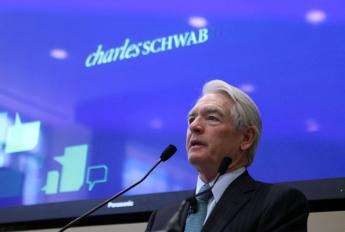
|
| Chuck Schwab |
The remedies for this situation might well be numerous, but the simplest one would be to isolate large investors from small ones by setting a top limit for large accounts, perhaps even automatically transferring large accounts to a large-account fund at the instant the account exceeds some limit. Apparently, similar proposals have been made privately, and there is opposition whose validity must be addressed. However, in the confines of an Op-ed article, a fully exhaustive discussion of a technical proposal is not possible. Ideally, this sort of proposal could be adopted privately, using the advance consent of the two involved parties, the bank, and the big customer. No doubt there is some legitimate concern that widespread publicity might trigger unfortunate legislative over-reaction. After all, most members of the public are unaware that "breaking the buck" is even a possibility. If the possibility of a run can be eliminated by skipping the alarming discussion of whether it potentially exists, or how serious it might or might not become, it would be a mercy. It only seems to be required that the parties agree it is a risk worth avoiding.
Barnes Foundation -- Drawing a New Moral

|
| Andrew Stewart |
Andrew Stewart, the Public Relations Director of the Barnes Foundation, and for thirteen years a member of its Board of Directors, recently addressed the Right Angle Club. He gave a new slant to the quarrelsome saga of Dr. Barnes' will, offering the point of view in favor of moving the paintings to the Parkway. It's useful to hear the legal and historical background because about all we hear are criticisms, balanced by joy at having the famous paintings where we can see them.
Essentially, the will declared a wish for the School and Museum to follow the original indenture. After the passage of time, the old board members died off, and the new board members found the Indenture to be out of date, like specifying the purchase of railroad bonds. Delivered in a charming Scottish brogue, the argument was fairly convincing. But it stimulated in me an entirely different moral from the eternal dispute between the right of a man to have respect paid to his expressed wishes for his own property, versus the self-defeating quality of the same restrictions with the passage of time.
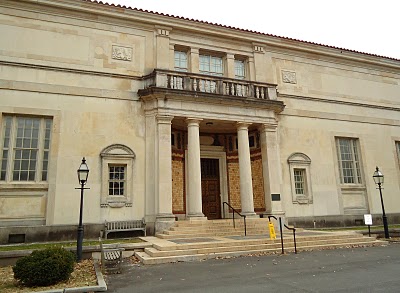
|
| Barnes Foundation |
Barnes was born in Kensington, and had a hard life as the son of a Civil War veteran who lost an arm in the war, and had a dismal time making a living as a butcher. Barnes was his fighting-spirit son, who worked his way through medical school. It was Jefferson Medical College, where I was on the faculty for decades. While it is true his patent medicine gave a permanently sickening color to the children who were treated for sinusitis, it is also true that in the form of eyedrops it prevented the transmission of syphilis to millions of newborn children. In that view, it was a real scientific contribution, although the medical profession continues to take a dim view of doctors advertising their wares. Although he was himself a failed artist, Barnes was a highly successful collector of (then) modern art and started a school with John Dewey to teach art appreciation to poor people. One by one, the local universities snubbed his wishes for an art appreciation school, and the local Philadelphia museums were pretty sniffy about his favorite artists.
In fairness to them, Barnes was probably pretty pushy in his demands. Unfavorable local reception to an exhibition which had received rave applause in Paris, convinced Barnes he was right and they were wrong. After this, Barnes developed a lasting hatred of Philadelphia and all its stuffy ways; he definitely didn't want his own impressionist art to be in Philadelphia, which would never appreciate it. While Philadelphia finally woke up to the value of Impressionist painting, Barnes never relented while he was alive. I hope I give a fair portrayal of the argument except for the politics and the legalities, that I know very little about.
But hearing the arguments, I see an entirely different moral to the saga. Ever since the inflation of the 1930s, fine art has appreciated in value, faster than the endowments to maintain the art. (That's probably a useful tip to investors, too.) It's fairly standard for a wealthy person to donate his art collection, plus a sum of money to endow the maintenance of the art. Most of the time, the size of the endowment is carefully calculated to grow at least as fast as the value of the paintings, because you have to ensure them, and pay for increased security, and increasing attendance. With the new trend toward inflation of at least 2% a year, the old premises don't work anymore, and the endowment eventually runs out. At that point, it runs into restrictions which -- to be perfectly blunt -- were created to prevent the trustees from pilfering the museum. A museum may not sell its art to pay for administrative expenses.
Consequently, The Barnes ran into a situation where it had billions of dollars worth of paintings in the basement, which it could not sell, and could not even hang in the museum because of Barnes' specifications for what went on the walls. This situation isn't going to change, because a dollar in 1913, when the Federal Reserve was created, is now scarcely worth more than a penny. And the present Fed is committed to 2% inflation, forever.
So, how about this: let the lawyers who write wills, and the Orphan's Court which administers them, insist that the art collection be divided into two parts. One would be the permanent collection, just as at present, and the other would be eligible for sale in the judgment of the Orphan's Court.
Decline and Fall of Philadelphia
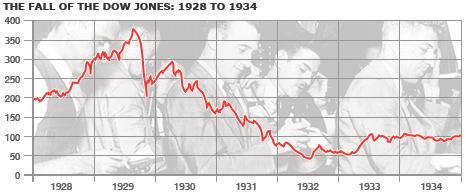
|
| 1929 Crash |
We talk high finance here, so perhaps a simple story from Wall Street is needed to introduce the topic to a non-Wall Street audience. Following the 1929 crash, and consequent to the Glass Steagall Act, Morgan Stanley was the only American investment bank in existence. It was the first of a new kind, but barely in existence, doing something like $300,000 worth of business in 1933. As finance adjusted to the new ground rules, Morgan Stanley grew in size, commonly referred to as the "White Shoe" investment bank. That term was an allusion to the Ivy League background of its partners, who came from colleges which affected white buckskin shoes among their more elite students. It also referred to the fact that almost all Morgan Stanley partners were pretty rich and fairly young, entirely able to live by a code of behavior which might be summarized as, "We don't find it necessary to cheat."
Buried within that motto was the idea that Morgan Stanley was as good as its word, and tried very hard to avoid doing business with anybody who did cheat. In a business where a great deal of business was transacted too quickly for written contracts or vetting by law firms, that meant a lot.
<Morgan Stanley soon climbed to the top of a very tough heap and stayed there for fifty years. Many of its partners were millionaires in their twenties, but so what, they were mostly pretty rich before they joined the firm. The company ran as a partnership, with the capital they leveraged coming from the personal fortunes of the partners. Under these circumstances, it is not surprising many partners retired in their forties, taking their enhanced capital with them. The Glass-Steagall Act (now being imitated by the Volcker Rule within the Dodd-Frank Law) made it illegal for a depository bank to be under the same roof with an investment bank. Much of the capital in the pre-1929 days had been supplied by the deposits in the depository bank, but Glass Steagall cut that off when it created depository insurance, on the theory that deposit insurance was a Federal gift, and its "moral hazard" should not flow through to the speculation of investment banking.
That comment was tinged with populism, with the dubious implication that those who are two generations off the farm are less likely to cheat than those who are five generations off the farm. So the depository bank of Morgan Guaranty has split away from the investment bank of Morgan Stanley, which was the three-step process by which Morgan Stanley eventually grew so big it could no longer be sustained by leveraging the personal wealth of its partners.

|
| Buy And Sell |
Eventually, the pressure to raise money by selling stock to the public could no longer be resisted. The rich partners became even richer by selling their company's stock on the stock exchange, the company did grow enormously, and a lot of new stockholders got rich, too. Unfortunately, when you sell a stock you also sell voting rights, so the sale transferred voting control of the company to the new stock purchasers. It did not take many years before the white shoe atmosphere was a thing of the past, along with the discipline that the atmosphere imposed on the rest of corporate America. When the 2008 crash came along, there was enough questionable behavior on Wall Street to justify a populist President of the United States to tolerate, or even encourage, a witch hunt of Wall Street bankers for ruining the country.
Even so brilliant an economist as Paul Volcker has encouraged the idea that separating the two forms of banks was an unmitigated blessing which must be restored, while in fact it is only justified by the gift of Federal Deposit Insurance to the depository arm, not the Investment Banking Arm. It seems only a matter of time before there will be agitation to extend the insurance to the investment arm so we will be chasing our own tail, of extending insurance to encourage risk-taking, instead of using demand deposits to do so. And thus inviting another crash.
I'm sorry, Paul, but there is a reversed way to describe it. The small investors demanded the entitlement of risk-free investing, protected by deposit insurance. And they declared this insurance was a special entitlement to which wealthy players were ineligible. When small punters go broke, it is a tragedy. When big players go broke, it serves them right for being so greedy.
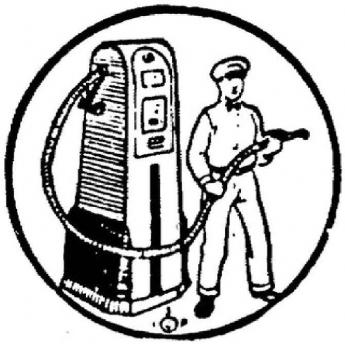
|
| Gasoline |
Converting partnership or family businesses into stockholder organizations was a universal outcome of both World Wars, all over the world. The phenomenon can be looked at as one way of extracting frozen wealth to pay war debts. It is accompanied by an increase in national indebtedness, so it makes civilizations less stable. Scraps of partnership control do continue to persist in remote developing countries, and in tiny principalities like Luxembourg, but it seems only a matter of time before the public buys them out. The only major developed country to retain family control of businesses in Germany. Apparently, it was intentional, based on the inheritance laws. Tightly held countries are more commonly tightly held together by force, as in Russia, Saudi Arabia, and Monaco, usually because of a monopoly grip on oil or other natural resources. But even those governments could probably be toppled, except for fear of ensuing chaos, just as did happen to many former dictatorships, and was a source of fear in Philadelphia. A case can be made for populism if it is kept small and under control. Hardly any case at all can be made for chaos.

|
| Brewerytown Map |
For those of us who love Philadelphia and wonder what happened to it, let me point out three defining local peculiarities. Prohibition was more of a factor than we like to think because Philadelphia's Tenderloin was the former Brewerytown, filled with Beer Gardens, refrigeration plants (Lager beer is brewed in the cold) and beer distributors. The passage of the Volstead Act suddenly transformed the largest alcohol-production center in the country into the largest alcohol-consuming area, from River to River, from Franklin Square to the Schuylkill.
It was concentrated in the Brewerytown by being illegal, and somewhat secret. Brewerytown soon turned into the Tenderloin, and the Tenderloin into Skid Row, cutting off North Philadelphia from law and order, but in time it was alarming in a different way to see speakeasies spread into other sections of the city. Much as it tried, even the Mafia couldn't control the influx of amateur criminals, when the Tenderloin essentially cut the city in half.
When the great migration from the South occurred after WW II, the immigrants turned North Philadelphia into a slum. Cutting I76 along the same center-city lines helped shrivel North Philadelphia and hustle its flight to the suburbs. Some misadventures of Philco and Ford, Baldwin and Stetson hastened the process and may have caused some of it.

|
| Pennsylvania Railroad |
America grew into a mighty industrial nation as a result of becoming the Arsenal of Freedom in the Civil War and two World Wars. The nation needed to expand its industrial base from the essential monopoly corridor of the Pennsylvania Railroad, and it had the money to do so. The land was cheaper elsewhere, labor was nonunion elsewhere, and air conditioning made the South bearable. Wall Street saw an enormous opportunity to buy stock from the family partners of Philadelphia industries, and sell it again to the world. These new owners had no interest in preserving lovable Philadelphia; they wanted to reap the harvest of expanding what we had, to the rest of the country, maybe even the rest of the world.
Once a spiral like this gets started, it runs by itself. The owners of the mansions on the hills, proprietors of what were big businesses by Victorian standards, sold their partnerships, their children were converted into coupon clippers, and their grandchildren into trust-fund babies. If you really have nothing much to do, why not do it in California next to the beaches? Hollywood made trust fund babies seem glamorous on the Main Line, just as Madison Avenue had once made patriots on the left bank seem fatally attractive. Those movies and novels made somebody pretty rich, but whoever it was, doesn't live here, anymore.
Investing for the Common Man
Some of my best friends are investment advisors. They are some of the most urbane, pleasant, and smart people around town, and until recently some of the most prosperous, not to say, rich. Many brokerages were founded as private offices to service the particular needs of one very rich family, and then expanded to include the public for a fee. They are not and never were, fiduciaries. They have no legal obligation to put the customer's interest ahead of their own, and they are very careful to tell you that, in the body language of behavior. For that reason, they were very careful with new customers, and the customers had the perception that they were privileged to be accepted as customers. Such old-line brokerages were a 19th Century sideline for people who owned family businesses but had some capital to spare. Shortly after World War I, brokerages thrived as family stockholder businesses declined, gradually morphing into a world dominated by public stockholder corporations. A specialized business, investment banking, concentrated on merger and acquisitions, and at first, converted most large family businesses into stockholder corporations. As that opportunity gradually dried up, investment banks began to trade on their own accounts, sold bond flotations, and created derivatives. By the end of the 2008 crash, there were only two independent stock brokerages in Philadelphia; all the many others had been absorbed into national firms. Only about five of them dominated the field in 2014. In about a century, family businesses of all sorts had disappearpreaed; that unrecognized fact was a major factor underlying the social uproars of the 1960s. No longer did the owner of family business expect his son to take it over; in fact, no longer did the fathers of daughters organize local social events to throw the next generation of local leaders together at parties. If you want to hire someone to run your business today, the natural thing is to hire a search firm to find somebody in San Francisco to run your business. This phenomenon spread out to almost all traded and professions, including shoemakers and stock brokers. It's all rather sad.
During that century the cream was skimmed off, leaving family businesses as a relic of the past, and brokerage houses were threatened with the loss of their main product to convert, as well as their main supply of respectful clients to buy them. The electronic computer had a lot to do with this, making mass production of a Savile Row business into a low cost, mass producing mass marketing organization. No longer did you learn the trade by associating with a master of it; you went to business school to learn the techniques. Your SAT score became more important than your Rolodex. Or your city club, or your prep school, or golf handicap. Or, for that matter, whose daughter you married.Nowadays, there are even more private offices, but the owner is apt to have made his pile as a chemical engineer, and his manager went to business school, polished up his skills in a big investment firm, and got hired as the local expert on what to do with all that money, on how to educate the clueless owner, and how to manage his worthless children. If he did well in the private office, he was fixed for life. If he did well but felt restless, he was apt to start his own hedge fund. In all this professionalization of an artisan trade, nestled within a relentlessly competitive environment, the customer relations retained many of the mannerisms and attitudes of its family business origins. For one thing, most new investors have either inherited money or earned it in some totally non-financial arena, and are totally at sea in their new unfamiliar role. Realizing their helplessness, and probably foreseeing a lifetime of dependence on investment, they are scared. Anticipating failure, they are preparing the IBM defense. That is, they are like beginners put in charge of buying a computer in the early days. If you bought an IBM computer, it might cost more and do less, but no one would criticize you for selecting IBM. That's how customers approach the problem. The financial advisers feel entitled to a luxury lifestyle, and charge the generous fees which will lead to it. Neither client nor adviser allows the relationship to consider the only thing which matters: how does your track record compare with cheaper competitors? What a nasty low-class question to ask.
Let's ask an even nastier question, anyway. How does the whole class of active managers compare with a random walk on Wall Street? In fact, if you subtract the fees they charge, almost everyone does worse than index funds. In fact, if you take Warren Buffet, the most famous investor alive, and compare the performance of his company, Berkshire Hathaway, with Vanguard's total market index (VTI), it is pretty hard to tell the difference. Warren Buffet is one of the richest men alive, but his performance including administrative costs does not justify the purchase of his stock, or in fact the performance of any stock-picker. If you pick out the best manager you can find, regardless of his fluency with words like alpha and moveable alpha, and make sure to include the fees he charges, you will almost invariably find you would have done just as well with an index fund. Do two things: make certain you pick the beginning date and put several years of performance through an internet website known as BigCharts. Remember, almost any numerical series can be manipulated by selecting a favorable beginning date, so you choose it, and preferably chose several of them. BigCharts is free, and it provides for automatically plotting the historical charts of several funds at once, different colors for each. You can if you wish, browse through Ibbotson's atlas of the prices of all classes of stock for the past century. What Ibbotson demonstrates in overwhelming detail, is that different classes of stock differ from each other, but they consistently revert to the same mean. Using a logarithmic scale and plotting total return (stock price plus dividends), small and mid-cap stocks hold steadily to a 12% annual return, while large capitalization stocks (the ones you have probably heard of) "command a premium price", which is to say they return 10%. Bonds return less, U.S. Treasury bonds return still less, and inflation has been a little more than 3%.
The first thing this study proves is that if you made less than 3% return, you lost money, by allowing inflation to eat it up. If an investment manager cannot show better results than 3% inflation, you are better off avoiding him. Don't avoid the question. Ask it.
Secondly, it's hard to answer why you should not put your money in a small-cap index fund, with administrative fees well below a fraction of one percent. Several index funds with several billions of dollars of deposits have fifteen-year administrative fees of less than a tenth of a percent, and total returns of 12%. Why not buy them, and never sell them except in emergencies? It's hard to see why that is the wrong thing to do, but it means concentrating investment in hundreds or thousands of companies too small to recognize. Admittedly, some of these stocks will go broke, but others will skyrocket. However, it is easy to understand the fearfulness of a new investor, who wants to own big companies he has heard of. He wants to own IBM and General Electric. Very well, buy an index fund with low fees, and try never to sell it. That way, you will make 10% and both minimize taxes and transaction costs. But remember that inflation is going to reduce the results by 3%, so the difference between 12% and 10% is really the much greater difference between 9% and 7%. If you reduce it further by buying a hedge fund with a typical 2% surcharge, it is the difference between 7% and 5%. If you fail to put the funds into a tax-exempt retirement fund, you will reduce your after-tax return to either 4% or 3%. Perhaps from this simplified example, it becomes clear how sales fees of $250 per transaction may seem fair to both you and your manager, but they soon reduce the investment return to such pitiful levels that it isn't worth the risk. Don't do it. Don't let it happen. Transaction fees of $7 a trade are available from several investment companies with deposits in the trillions. The marketplace says this service is worth $7 a trade and 0.07% yearly administrative cost. Your broker has to make a living, yes. But you have to afford retirement, also yes.
Actually, that isn't all. Most qualified retirement funds are retail, and the funds they choose are wholesale. Beware of funds which charge you $250 to make a monthly or quarterly, or even annual minimum required distribution, for sending you the money you could ask to be sent to you directly for a fee of $7. Some of the biggest banks in America do exactly that. Your fund was inexpensive, but your agent was very dear. Unless your manager sends you regular performance reports and includes every penny of fees; and unless the net of inflation is 5%, you have a reason to move your account. Past results are no predictor of future performance, that is true. But past behavior is a very good predictor of future behavior, as my grandfather told me, and as I tell you. No second chances allowed.
Raising Cash and Investing Cash
Since all investments are eventually sold, else what's the point of investing. It seems to be a universal practice among professional investment advisors to liquidate stock immediately, once a decision is made to spend (substantially) from the investment fund. Having been on a number of investment committees, I noticed the decision to build a new building or buy a big piece of equipment brings the investment manager immediately out of his normally silent attendance. When the general cost is announced, he immediately will announce that he is liquidating that amount, and setting it aside. Since large capital expenditures are often finally spent a year or two later, it means losing appreciable income to do that. So I asked, and sure enough, it is a firm policy. The reasons given have a strong tinge of self-interest in them, so I was never quite sure. The stock market might well go up during the interval between decision and payment, but if it goes down enough to thwart the plan, the investment manager may feel he could get the blame for ruining a good business idea. So he prefers to play it safe. What he fears, may sometimes happen, but probably not regularly. This sort of behavior is universally applauded as a sound business practice. A company is supposed to know its business, and ordinarily plans to make more money from its business than from its piggy-bank.
Where policy dispute exists, it is on the opposite sort of decision, whether to invest a windfall all at once or drag it out. Of course, if the amount of cash is truly substantial, there is a risk the purchase will itself raise the price of the stock being bought, but if that's a likelihood it probably only affects very big investors or very small businesses. Big shots don't need or welcome outside comments. For ordinary folks most likely, the concern is that the market will constantly fluctuate, and cause you to spend your windfall (or inheritance, or gift) at the time of a bump up. If you spread it around at least you get the average price during the interval. There's at least one consideration to the contrary, however. Roughly speaking, ninety percent of the gains, take place in 10% of the time interval. If you spread your investments out, you will likely miss out on most of the gains. You may think you can time the purchases adroitly, but it is almost universally agreed that market-timing is futile, and nobody can consistently win by trying it. Most young people disregard that advice and therefore encounter the truth of a second maxim. The best thing that can happen to you is to lose some money when you are young.
The matter has been thoroughly studied, and leads to the general agreement: it is true at all times and seasons, with perhaps a weak tendency for the market to go up a little at the end of the year. Robert J. Schiller and Jeff Sommer each had articles in the August 17, 2014, New York Times of studying all the one-week periods since 1926, when modern record-keeping began. It was possible to lose a significant amount of money by investing in the year before the major stock market crashes of 1929, 1999 and 2007, but even in these extreme pre-crash situations, the markets recovered the losses in 2-3.5 years. Otherwise, lump-sum investing beats dollar-cost averaging by about 4%. Accompanied of course by the usual advice that past performance is no guarantee of future performance.
In fact, the two styles have a lot in common. The human fact of the matter is that selling a business, or getting an inheritance is a relatively rare occasion in life. When cash accumulates suddenly, it is best to hold your nose, diversify widely, and plunge ahead. When you think about it, dollar-cost averaging is really much the same, except you get much smaller amounts once a month in a paycheck -- but then invest them immediately. The true advantage arises, not in how quickly you do it, but just in making a decision to buy a diversified index fund. Dollar-cost averaging -- Investing a fixed amount regularly -- is pretty much the same, except more frequent. When you make those two decisions and go to sleep on them, you will one day wake up and discover you have accumulated much more money than you expected. That only leaves the occasional windfall investment, which comes along every fifteen years or so. Unless you are dreadfully unlucky, the time to hold off investing has a pretty small chance of coinciding with the windfalls of life. Only if you feel you will develop a pressing need to raise cash in the next three or four years, should you hesitate.
Remember, there is only one reason to hold cash or bonds that everyone agrees to. Whether it is to meet a payroll or to time the markets, you want at all costs to avoid the situation of being forced to sell temporarily depressed stocks, at a loss. If there is any significant chance of that during the next few years, you had better assemble the cash on hand, right now. If you haven't had this degree of prudence in the past, receiving any windfall cash infusion is a good time to put it aside.
And finally, as far as selling is concerned, sell your losers and hold on to your winners, for tax reasons. To thwart the habit of bad news creeping up on you gradually, like the frog getting boiled in the pan, check your winners and losers every October. If you have accumulated three thousand dollars of losses, and three thousand dollars worth of winners, sell them both. Two months later, buy back six thousand dollars worth of the winners. This will probably generate a little profit bump from the "end of the year effect", gets rid of your losers, strengthens your portfolio, and reminds you to look at your results, once in a while.
What Price Success?
One of the best ways to wreck a good plan, is to fail to provide for success. Most innovators spend so much anxiety over possible failure, they never get around to planning for the problems created by the plan's roaring success. So, let's voice some concerns about where the Lifetime Health Savings Accounts might stand if everything worked perfectly.
In the first place, there could be a conflict between the small investor's best interests. On the one hand, he will undoubtedly do better for himself by purchasing index funds than individual stocks. He gets diversification and low fees, supported by mountains of evidence that only a rare investor will do better with stock-picking and market-timing, no matter who is advising him. But if myriads of people do the same, index funds could overwhelm the market. Already, they represent several trillions of dollars and show no signs of slowing the pace of advancement. The proportion of stockholders who actually vote their shares will steadily shrink, and ultimately we can expect the few shares that are voted, to be in the hands of managers and insiders of the company. Now it is probably true that the average small investor knows so little of what is going on, that both he and the companies are better off if he doesn't exercise an uninformed vote. A more likely danger is imperfect agency on the part of the managers of the funds. Wall Street periodically circulates rumors of fund managers offering to vote the fund proxies, in return for the selection of their fund for the affected company's pension fund assets. It doesn't matter whether this is true, what matters is it is believed. Sooner or later, Congress will get wind of such rumors and pass inhibiting legislation. The nature of such regulation and/or legislation is ultimately to impair the value of the stock. The salaries of CEOs may go down, and some Wall Street predators may be thwarted, but overall return on investment will be lessened by the suspicion.
The bond market is much larger than the stock market because leverage is the basis for a great deal of profitability. No one knows what the optimum ratio of bonds to stocks should be. In 2007, the ratio of bank leverage was fifty to one, and few people complained it was too much. In the depths of the 1930 depression, it was far lower, and few people complained it was too low. In retrospect, fifty times is insanely high, while if you bought any stock at all in 1939, you probably made a ton of money. The herd instinct always seems to drive this relationship to extremes, but in fact, the optimum ratio will also go up and down with the times. Any law setting limits will be meaningless for long periods of time, and then suddenly be a serious impediment to the economy. The problem lies in the reality that bond trading is, with few exceptions, a zero-sum game. For you to win, someone else likely has to lose. By contrast, the stock market represents company ownership, and it is possible for both sides of a trade to be highly satisfied with their outcomes. It certainly isn't guaranteed, but the environment is more favorable for a passive investor. The long-run hazard lies in the possibility that nearly all investors will go to school and learn these aphorisms, thereby undermining the bond market except for insurance companies, banks and other long-term investors, who can hold a thirty-year bond to maturity. A flight from bonds would inevitably make their prices drop, followed by a shortage of bonds, which would then make their prices soar. Carried to an extreme, and protracted for a decade, a disturbance of this sort would cause the buy-and-hold stock investor to lose the faith, and ultimately to lose his shirt.
You have to feel sorry for the traditional stockbroker and investment advisor. The advent of the computer and of low-cost diversified funds have badly shaken what has long been an honorable and respectable profession. However, stockbrokers have resisted adopting the legal role of fiduciary, pledged to put the customer's interest ahead of his own. Most of the major stockbrokers started as private offices to handle the affairs of one rich family, who essentially didn't care about the fees and commissions. As a favor to rich friends, they enlarged the business and utilize economies of scale. In consequence, almost all stockbrokers could hope to get rich from trade secrets. With the advent of computers and high-speed trading, the broker trade became an investing profession, graduates of business schools and even mathematics majors from Ivy League Universities. The secret of success in that environment was volume, not trust-fund babies as friends and former classmates. Pension funds in particular aggregated a large number of obedient clients for them; the salary scale was still opulent, but the clientele was no longer their equals in sophistication.
As the brokerage house with walnut panels and oriental rugs began to fade away, the social level of the broker was no longer so important, and high fees interfered with maintaining high volume. It is only a matter of time before the personal financial manager discovers a small volume of potential clients, including trust-fund babies with some investment training of their own. The surviving financial advisors are only cogs in a big machine. In the meantime, be careful of whose advice you take, especially if he steers you away from index funds. There is a significant risk the advice is really coming from the sales manager, unloading the firm's inventory. The most lurid example is what has happened to 401(k) pension plans, where the investment return is heavily consumed by fees, altogether too often. It would certainly pay to browse through a book by Ibottson, containing all of the statistics you need about the last century. Since 1926, large-cap stocks have averaged 10% total return, while somewhat riskier small-capitalization stocks have averaged 12.5%. Your interview with an advisor can't be considered finished until you are told what the 15-year experience has been at that particular fund. Unless you are determined to get the data, you probably won't get it. Because of this behavior, the famous investor Warren Buffett tends not to buy stocks and bonds at all. He buys the whole company. The results of his investment fund, Berkshire Hathaway, are a rather close match to the returns which Ibottson reports.
Ok, ok, got that. But suppose everyone gets it? In that case, one would suppose the prices of common stocks would fall, and the prices of bonds would rise to a new level. At that point, the advice would be to buy funds which hold huge amounts of bonds of all maturities and hold them to maturity. Remember, investors in Health Savings Accounts would effectively be investing for the next sixty to eighty years. Someone must be found to change the composition of the portfolio rather drastically and to do so gradually enough to avoid convulsing the market. Panics are essentially what happens when everyone tries to get out the door at the same time. Are we to risk the entire savings of the nation for healthcare, based on that sort of opinion? It seems pretty clear to me that we have to trust someone, but it is not clear to me how we can assure ourselves that the person or persons with authority, will be sufficiently unaffected by politics -- to be trusted.
Which brings up the Federal Reserve. It would be hard to find a group of more serious people, generously infused with a strong sense of duty and fidelity. But strong differences of internal opinion regularly surface, not necessarily following a political ideology, as much as creating it. After all, some of this stuff is really hard. In the full century since the 1913 creation of the Fed, the dollar has declined a thousand percent, from the value of one dollar to the value of one penny. John Kenneth Galbraith, one of the wittiest civilized men on earth, loudly and earnestly advocated a deliberate 2% inflation in the value of the dollar. Well, we have it, and the dollar has completely severed its connection to gold and silver or any other commodity. The currency has now just become a computer entry when thousands of years of experience speak to the hazard of doing so.
When the dust settles, there remain two reasons why we should take such risks. The first is the rather good possibility we can indeed extricate ourselves from a looming health finance disaster, by taking this risk. The second is to reflect on the growing possibility that medical research can eliminate enough disease, and reduce the cost of caring for what is left, to give us the room to ease into sustainable finances. If that's our grand strategy, only America, using American bravado, could pull it off.
Calculate IRA Distributions
This IRA withdrawal calculator is for the original owner of an IRA and shows the following:
- Each year's minimum withdrawal
- Each year's taxes
- Each year's after-tax payout (assuming withholding)
- The declining balance of the IRA
Note: the calculator assumes that the IRA grows at a fixed rate (default is 0%, i.e., cash)
Note: this calculator uses Table III, which is for the original owner of the IRA who is either unmarried or whose spouse is no less than 10 years younger.
Note: this shows the minimum withdrawal; you may withdraw up to the total amount remaining (taxes will be due).
Click here --> IRA Withdrawal Calculator
Three Forms of Saving; Working Capital, Debt, and Equity. Maybe Four.
Assets Forced into Three Categories
John Maynard Keynes is said to have invented the discipline of macroeconomics about 1930 when he wrote a book "The General Theory of Employment, Interest, and Money". That he was brilliant had been established for decades, that he was invariably correct has been debated. In the final chapter of The General Theoryhe concluded that protracted low-interest rates would ultimately lead to a disappearance of the coupon-clipping rentier class. That is, that money would become so cheap that no one would pay to rent it.
Keynes know he could not predict wars and other shocking events, so he ventured no opinion about the timing of this cataclysm, but it is clear that signs of it are appearing sooner than he expected. The causes of this acceleration are mainly medical, including both a lengthening of longevity and an increase in the cost of achieving it. The best sign of a connection for non-economists lies in the transformation of implicit goals of the rentier class (undesirable) into prolonged retirement (desirable, possibly even unachievable.)To every economist' surprise, inflation has not yet made an appearance, and inflation itself has made a reverse transformation, from confidently expected, to mysteriously missing from view. Von Hindenburg and Adolph Hitler may yet exchange positions of general esteem. But no matter how hard it tries, it appears as though the Federal Reserve cannot raise interest rates above 2% by inflating the currency. That's both a surprise and a discovery, that economics doesn't work in quite the way we thought.
A recent puzzlement has also arisen in the new instrument called a hedge fund. The purpose of this asset class appears to be to conceal the tax status of these assets until the last possible moment before the sale to a new owner. One may accept the division between "two and ten" as a permissible arrangement between buyer and seller, although it seems rather expensive. But the lock-in period seems to have the purpose of concealing its true nature from the taxman. While it is true that sales of Canadian forests may justify a long investment period, most hedge funds now exceed one year's compulsory lockup, and permit shifting of tax status for long periods of time without any obvious tax-based purpose.
Relationships: Bankruptcy and Bond Prices
The price of borrowed money includes a provision to pay for defaults on the loan. That is, the interest rate demanded includes a default provision assessed by the banker against what he thinks is the risk of bankruptcy. Since he wouldn't make the loan if he thought the risk was high, he insures a little more accuracy by assigning a general rate of risk for the class of debtor. But what of the creditor who wouldn't suffer much, no matter what the risk of default? Or who ignores the risk of default because he sees very little? That man would have no interest in supporting loans, except to obtain an adequate rate of return; a pure investor, who has the money and is looking for a place to earn a return. If you don't give him a fair return, he will simply pass bonds by, and invest in something else. If the banker feels the risk is greater than the offered return, he too will let the opportunity pass. The consequence is for a fair price to emerge from the marketplace for bonds. The debtor may cry and protest, talking about the unfairness of it all, and telling his wife that bankers are a greedy bunch of knaves. But in a modern bank, he would merely be offered a Kleenex for his performance. There are just times when loans are expensive, and this particular debtor has encountered one. Sometimes, a disappointed debtor visits his congressman, and sometimes the law is adjusted for him to borrow at a substandard rate. James Madison felt that debtors would always outnumber bankers, so there would be a tendency for interest rates to creep upward in a voting republic. Consequently, a mixture of strategies is employed to suppress interest rates. Sometimes the government subsidizes non-market prices, sometimes the risk of default cost is buried in the overall interest rate, sometimes the bank subsidizes the cost out of more obscure profits, usually by raising the rates for wealthier clients if they are numerous. If these simple strategies go on long enough, the default occurs and its cost is assessed as taxes from the bankruptcy courts. In a modern bankruptcy, the defaulted debtor may be entirely stripped of his other assets. If that's not sufficient to cover the loss, either the banking system collapses, or the government does.
There's another big player in this game: insurance companies. Insurance companies buy lots of bonds, trying to match their interest cost with their other expenses, notably their insurance liabilities. If the insurance commissioner of the state permits it, they may even issue some bonds to cover a shortfall. In recent years, they usually buy stock equities, and if they overdo it, the stock market may get them. The crooks in this business take in the premiums in the early years, and sell the company as the aging liabilities grow older, particularly if the Insurance Commissioner is friendly. Fortunately for them, the population has added thirty years to the life expectancies of their clients, so they have not had to resort to any of these strategies as much as they originally did. Insurance companies have been very profitable, and so bond rates have developed a great deal of slack. Whether they take advantage of their opportunities is not for me to say, but it would not be surprising if bond prices, hence bankruptcy laxness, have been both profitable and slack. The two are huge pools of money, operating in largely independent markets, which can operate comfortably and separately, for long periods of time. The last two stock market crashes have been real estate collapses, and real estate is all about mortgages, banks, and interest rates. And the Federal Reserve has responded to both crashes by artificially manipulating mortgages, banks and interest rates.
| Posted by: Taxpayer | Oct 16, 2010 10:02 AM |
Medicare.gov as well as other Federal agency's encourage you to report any fraudulent activities, yet, the same government agencys were notified the way this company does business yet did nothing. Three years ago they were reported to these Federal agency's and as of todays date not only were they allowed to continue doing business but were never charged once. Protected vendor status sure, politics sure,limited government budgets sure, Federal and State officals looking the other way sure, and rather then stop these activities a strong desire not to rock the boat existed. Even with the vast changes in the laws and budgets,a hands off policy remains, you tell me what's wrong with this picture? The Government created this monster and now they don't know what to do about it, like shooting yourself in your own foot etc. Tons of money to advance their national growth, its market positions, tons of money for political donations, tons of money to send 75 millon back to its home office from New York state alone, tons of money to suppot National TV shows, tons of money to pay hugh State fines, tons of money to hire the very best law firms, tons of money to pay for bribes and kickbacks, tons of money for hugh salarys and bonuses, all done on the back of the American taxpayor, you see this company receives all its money from the Federal government. Should your tax dollars be held to a higher standard? Should the government agencys responsible for there review be held to that same standard?Should the IRS audit their corruption? Why has this company not been charged? How long can the buck be passed here in more ways then one? Hey, it's your tax dollars don't complain now.. then don't complain later on…
ps… I know times are tough for a lot us, but it would be great to have a free limo to go to the Doctors, Pharmacy, Movies, Grocery shopping, and given free tickets for the movies. Offered soda, pop corn and hotdogs, as well as have them receive free coupons for Grocery items……Kind of makes you wish you also had Medicare and Mediciad right?
| Posted by: Reform Needed | Sep 17, 2010 4:17 PM |
67 Blogs
Quaker Investment Committee
 Quakers expect results from their investment managers, not just Wall Street gossip.
Quakers expect results from their investment managers, not just Wall Street gossip.
John Bogle, A Prophet In Our Valley
 John Bogle invented the index fund. Lower cost, better performance.
John Bogle invented the index fund. Lower cost, better performance.
Health Savings Accounts
 In late 2003, Congress passed and the President signed, legislation enabling tax exemptions for contributions to Medical Savings Accounts. This monumental reform was included in a law which created a number of Medicare prescription drugs benefits which received more attention in the press. Such accounts were renamed Health Savings Accounts, which was the original terminology in 1980 when John McClaughry of Vermont and George Ross Fisher of Pennsylvania, shortly joined by Michael Smith of Louisiana, first introduced the concept.
In late 2003, Congress passed and the President signed, legislation enabling tax exemptions for contributions to Medical Savings Accounts. This monumental reform was included in a law which created a number of Medicare prescription drugs benefits which received more attention in the press. Such accounts were renamed Health Savings Accounts, which was the original terminology in 1980 when John McClaughry of Vermont and George Ross Fisher of Pennsylvania, shortly joined by Michael Smith of Louisiana, first introduced the concept.
Investment Strategies
 An insight into the success of a little-known fund run by a virtually anonymous family.
An insight into the success of a little-known fund run by a virtually anonymous family.
Economics of La Cosa Nostra
 Organized crime in Philadelphia has always seemed a little quaint. The most famous local godfather seems to have designed an organization that made lots of money without annoying the public.
Organized crime in Philadelphia has always seemed a little quaint. The most famous local godfather seems to have designed an organization that made lots of money without annoying the public.
John Head, His Book of Account, 1718-1753
 The equivalent of the rosetta stone for colonial commerce had been sitting on George Vaux's shelf for six generations.
The equivalent of the rosetta stone for colonial commerce had been sitting on George Vaux's shelf for six generations.
David F. Bradford, 1939-2005
 David Bradford, Princeton economist, recently died in an unfortunate accident. His 1977 paper "Blueprints for Tax Reform" inspired Individual Retirement Accounts, Health Savings Accounts, individual Social Security Accounts, the flat tax, and the advantages of shifting from income taxation to consumption taxes.
David Bradford, Princeton economist, recently died in an unfortunate accident. His 1977 paper "Blueprints for Tax Reform" inspired Individual Retirement Accounts, Health Savings Accounts, individual Social Security Accounts, the flat tax, and the advantages of shifting from income taxation to consumption taxes.
The Minnesota Investment Standard
 If financial experts expect to maintain their present living standards, they must stop producing, and defending, results that can be ridiculed.
If financial experts expect to maintain their present living standards, they must stop producing, and defending, results that can be ridiculed.
Mutual Fund Governance
 Their main income depends on selling their mutual funds to corporation-controlled pension funds, that's why.
Their main income depends on selling their mutual funds to corporation-controlled pension funds, that's why.
A Single International Currency?
 Half the world cheats, the other half grumbles, when American dollars become a reserve currency for the rest of the world. It will be a long time before the world has a single unified currency, and it may not be desirable.
Half the world cheats, the other half grumbles, when American dollars become a reserve currency for the rest of the world. It will be a long time before the world has a single unified currency, and it may not be desirable.
Delaware's Court of Chancery
 Georgetown, Delaware is a pretty small town, but it's where the major corporations of the nation plead their case.
Georgetown, Delaware is a pretty small town, but it's where the major corporations of the nation plead their case.
Finances of the Girard Estate
 When he died in 1830. Stephen Girard was the richest man in America. A quick review of the outcome of his life work suggests he was maybe the smartest man in America, too.
When he died in 1830. Stephen Girard was the richest man in America. A quick review of the outcome of his life work suggests he was maybe the smartest man in America, too.
IRA ... Individual Retirement Accounts (3)
 A legislative proposal gets started, beginning in the right place.
A legislative proposal gets started, beginning in the right place.
Opposition to Privatized Social Security
 Union opposition to privatizing Social Security has nothing to do with privatization, and everything to do with diverting SS taxes to something else.
Union opposition to privatizing Social Security has nothing to do with privatization, and everything to do with diverting SS taxes to something else.
Put Corporate Raiders to Some Good Use?
 It
It
Retiring to the Workforce
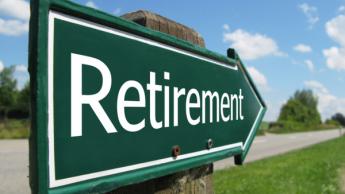 Most Americans alive in 2020 will live to be ninety before they die. Forget about lock boxes and other schemes to pay for a thirty-year vacation. These people will have to keep working at least until age 70.
Most Americans alive in 2020 will live to be ninety before they die. Forget about lock boxes and other schemes to pay for a thirty-year vacation. These people will have to keep working at least until age 70.
Who Watches the Watchmen?
 The no-load, open-ended, mutual fund run by the Pitcairn Foundation has consistently outperformed the index by 1.5% as a result of concentrating on firms which continue to be overseen by their founding families.
The no-load, open-ended, mutual fund run by the Pitcairn Foundation has consistently outperformed the index by 1.5% as a result of concentrating on firms which continue to be overseen by their founding families.
Will Tax Cuts Invert the Yield Curve?
 Tax cuts make the bonds of the federal government more nearly resemble the bonds of state and municipal governments.
Tax cuts make the bonds of the federal government more nearly resemble the bonds of state and municipal governments.
Marty Feldstein Forecasts the Future
 Reading between the lines, Martin Feldstein announces his view that the Treasury must allow the dollar to weaken. Soon.
Reading between the lines, Martin Feldstein announces his view that the Treasury must allow the dollar to weaken. Soon.
Medicare/Health Savings Accounts Legislation
What Every Voter Needs to Know
Rise and Fall of Life Insurance
 Like many things, insurance started here. It's now mostly all gone.
Like many things, insurance started here. It's now mostly all gone.
Supply-Side Tax Cuts
 "Supply-side" refers to public policies which help or hinder the economic health of the whole nation. For example, raising or reducing the taxes on dividends and capital gains -- for individuals -- has its most important effect on raising or lowering the cost of capital throughout the economy.
"Supply-side" refers to public policies which help or hinder the economic health of the whole nation. For example, raising or reducing the taxes on dividends and capital gains -- for individuals -- has its most important effect on raising or lowering the cost of capital throughout the economy.
The Economic Power of Laws
 The power to tax is the power to destroy, and so is the power to regulate. But anarchy can also destroy.
The power to tax is the power to destroy, and so is the power to regulate. But anarchy can also destroy.
Tulips, Jay Cooke, and Google
 Google's "Dutch auction" may replace the IPO, which was first invented by Jay Cooke for government bonds in the Civil War. The older-style bond salesmen hated Cooke for doing it, just as Wall Street hates Google.
Google's "Dutch auction" may replace the IPO, which was first invented by Jay Cooke for government bonds in the Civil War. The older-style bond salesmen hated Cooke for doing it, just as Wall Street hates Google.
After the Convention:Hamilton and Madison
 Two of the main authors of the Federalist Papers -- and hence of the Constitution -- ultimately proved to be acting on entirely different sets of principles, aiming for widely different goals.
Two of the main authors of the Federalist Papers -- and hence of the Constitution -- ultimately proved to be acting on entirely different sets of principles, aiming for widely different goals.
Reflections on Swensen
A private two-way conversation.
BEA Monitors the Economy
 Thebusiness world is cyclic, and dispairs deeply when the trend is down. The Bureau of Economic Analysis seems to be very good at predicting turn arounds.
Thebusiness world is cyclic, and dispairs deeply when the trend is down. The Bureau of Economic Analysis seems to be very good at predicting turn arounds.
Big Pharma Loses Momentum
 The stock market has been unkind to major drug manufacturers lately. A venture capitalist thinks that will be good for foreign firms, small niche firms, and wellness care.
The stock market has been unkind to major drug manufacturers lately. A venture capitalist thinks that will be good for foreign firms, small niche firms, and wellness care.
Quaker Gray Turns Quaker Green
 Quakers mean to turn their headquarters near Philadelphia City Hall into a glowing example of how to save money while they save their environment.
Quakers mean to turn their headquarters near Philadelphia City Hall into a glowing example of how to save money while they save their environment.
Immigration
 The United States government makes several trillion dollars profit on immigration, through a jaw-cracker called seigniorage.
The United States government makes several trillion dollars profit on immigration, through a jaw-cracker called seigniorage.
Herbert Hoover, Mining Engineer
 Herbert Clark Hoover was a Quaker, an outstanding executive, a hero of famine relief, a loyal Republican, and President of the United States elected by a landslide vote, then defeated by one. But above all, he was a mining engineer.
Herbert Clark Hoover was a Quaker, an outstanding executive, a hero of famine relief, a loyal Republican, and President of the United States elected by a landslide vote, then defeated by one. But above all, he was a mining engineer.
Africa Comes to the Schuylkill
 African oil, refined in Philadelphia, supplies 2/3 of the gasoline on the East Coast.
African oil, refined in Philadelphia, supplies 2/3 of the gasoline on the East Coast.
Hayek Confronts Keynes
 The influence of Austrian economist Friedrich von Hayek is slowly winning out over the views of the English economist Maynard Keynes, even though both of them are dead. Which is worse, inflation or depression?
The influence of Austrian economist Friedrich von Hayek is slowly winning out over the views of the English economist Maynard Keynes, even though both of them are dead. Which is worse, inflation or depression?
The Inky
 The Philadelphia Inquirer had a new, local, management. We wished it well.
The Philadelphia Inquirer had a new, local, management. We wished it well.
OUR NICE HOUSING BOOM COLLAPSES
 Politicians will assign blame for the housing boom-and-bust, but they should look at themselves. Which is worse, "red-lining" or "stupid loans"?
Politicians will assign blame for the housing boom-and-bust, but they should look at themselves. Which is worse, "red-lining" or "stupid loans"?
Gallatin Part II
 When Jefferson won the deadlocked election of 1800, Albert Gallatin was the obvious choice for Treasury Secretary. But having destroyed Hamilton's Bank, he had the humiliating duty to reverse position to fight the War of 1812. A five-act play, with duels.
When Jefferson won the deadlocked election of 1800, Albert Gallatin was the obvious choice for Treasury Secretary. But having destroyed Hamilton's Bank, he had the humiliating duty to reverse position to fight the War of 1812. A five-act play, with duels.
Making Money (8): Virtual Money
 When money was tangible you had to guard it, now that it's mostly virtual you have to verify it. Hardly anybody can, and that's a problem.
When money was tangible you had to guard it, now that it's mostly virtual you have to verify it. Hardly anybody can, and that's a problem.
The Cause of the Subprime Crisis
Things you suspected but kept to yourself
HowTo Create A Subprime Derivative
It's easier than you thought
Hedge Funds in Delaware
 The state of Delaware attracts clusters of businesses for reasons having to do with its legal system; call it Delaware Attractiveness. At the moment, it attracts hedge funds.
The state of Delaware attracts clusters of businesses for reasons having to do with its legal system; call it Delaware Attractiveness. At the moment, it attracts hedge funds.
Oil Bubble
 The cost of gas at the pump has soared, and conspirators are suspected. But, awkwardly, nice respectable pension funds and university endowments may be responsible.
The cost of gas at the pump has soared, and conspirators are suspected. But, awkwardly, nice respectable pension funds and university endowments may be responsible.
How Should We Reform Real Estate Finance?(1)
 Of course, first comes damage control. Soon afterward, any crisis presents a political opportunity to reform -- or, to make matters much worse.
Of course, first comes damage control. Soon afterward, any crisis presents a political opportunity to reform -- or, to make matters much worse.
World Finance, Columbus Day 2008

Financial Institutions of the Future
 Impending financial crisis has pushed everything else off the front page. But looking backward may show where we are likely going.
Impending financial crisis has pushed everything else off the front page. But looking backward may show where we are likely going.
Philosophy Means Science in Philadelphia
 At least until he met Madame Helvetius, Benjamin Franklin displayed little interest in moral philosophy. His interest was in science, which was called natural philosophy in the Eighteenth Century. The American Philosophical Society is America's oldest and most prestigious society of scientific scholars. If investing is a science, the APS is good at that, too.
At least until he met Madame Helvetius, Benjamin Franklin displayed little interest in moral philosophy. His interest was in science, which was called natural philosophy in the Eighteenth Century. The American Philosophical Society is America's oldest and most prestigious society of scientific scholars. If investing is a science, the APS is good at that, too.
Book Proposal: Investing
Investing for Cash Flow
Individual and institutional investors must change their investment style to survive financial crises
Philadelphia City Controller
 A City Controller is expected to criticize the city's administration. Alan Butkovitz does his duty.
A City Controller is expected to criticize the city's administration. Alan Butkovitz does his duty.
Reservoir on Reservoir Drive

Pennsylvania Likes Private Property Private
 The King used to own the whole country. William Penn got us used to the idea that my property is mine, not the King's.
The King used to own the whole country. William Penn got us used to the idea that my property is mine, not the King's.
Disappearing Stock Power
 The proxy voting power of corporate common stock is disappearing every day, by thousands of shares.
The proxy voting power of corporate common stock is disappearing every day, by thousands of shares.
Last Will of Benjamin Franklin
 The Franklin Institute of Philadelphia has reproduced Dr. Franklin's last will and testament on the Internet. It is copied here for reader convenience.
The Franklin Institute of Philadelphia has reproduced Dr. Franklin's last will and testament on the Internet. It is copied here for reader convenience.
Franklin Benefits the Pennsylvania Hospital
 Franklin remembered the Pennsylvania Hospital in his will by giving them his bad debts.
Franklin remembered the Pennsylvania Hospital in his will by giving them his bad debts.
Franklin Teaches Investing to Boston and Philadelphia
 In 1789, B. Franklin changed the nature of his last will and testament from conventional to highly unconventional.
In 1789, B. Franklin changed the nature of his last will and testament from conventional to highly unconventional.
Unique Investment Requirements
 Some investment situations are so different from the routine ones that conventional wisdom scarcely applies.
Some investment situations are so different from the routine ones that conventional wisdom scarcely applies.
How to Live Off an Investment Portfolio
It's a hard rule, but don't ignore it.
Is Stock Trading Passe?
 Computers have been in some sort of use for trading stocks, for over fifty years. Are they reaching their limits?
Computers have been in some sort of use for trading stocks, for over fifty years. Are they reaching their limits?
Bonds--Do They Have A Future?
 It's increasingly hard to imagine why investors buy bonds because it's increasingly difficult to imagine an end to inflation.
It's increasingly hard to imagine why investors buy bonds because it's increasingly difficult to imagine an end to inflation.
Making Stock Fund Profits by Slow Reporting -- Illusory Alpha
If you happen to know what alpha is, and happen to know that -- for purely mathematical reasons -- alpha is greater in quarterly reports (of the same data than it is in daily reporting), someone could make a ton of money charging for an alpha that doesn't exist. If you don't know what any of this means, you are probably in favor of more regulation.
Breaking the Buck
 Several years after the financial crash of 2008, the question is raised whether money-markets might have played an unsuspected role. If so, what should be done about it?
Several years after the financial crash of 2008, the question is raised whether money-markets might have played an unsuspected role. If so, what should be done about it?
Barnes Foundation -- Drawing a New Moral
 Inflation makes for a new slant on the saga of the Barnes Foundation.
Inflation makes for a new slant on the saga of the Barnes Foundation.
Decline and Fall of Philadelphia

Investing for the Common Man
An ancient and honorable profession had better re-invent itself, quickly.
Raising Cash and Investing Cash
New investors are apt to be timid investors. It may be better to hold your nose and dive in, but be sure you are diversified.
What Price Success?
If everybody buys diversified stock funds, and never votes at the annual meeting, who owns and controls the company?
Calculate IRA Distributions
Lots of IRA withdrawal calculators show you the first-year's or the current year's withdrawal. Here we go further.
Three Forms of Saving; Working Capital, Debt, and Equity. Maybe Four.
Macroeconomics has become more complex since Maynard Keynes invented it in the 1920s. But for simplicity of discussion, it continues to have the same three categories of assets.
Relationships: Bankruptcy and Bond Prices
 Bond prices help pay for bankruptcies, but their pricing is fairly independent.
Bond prices help pay for bankruptcies, but their pricing is fairly independent.
2009 and 2010 $120,000 blatant inducements from your tax dollars for the protected Medicaid vendor. Philadelphia PA Mayor Nutter received two years in a row $60,000 checks to help keep open and operate the city swimming pools. These checks came from AmeriChoice Health and on the surface seems like fine gifts.Yet, they are Bribes non the less, these checks come from a company who receives all its money from the Federal Government as a vendor for Medicare Medicaid services is not allowed to offer bribes kickbacks and money gifts of any kind inducements in order to promote its share of the market place. This is not allowed as a use of your taxpayers dollars yet it happens.What will it really cost the City of Philadelphia to receive this money? Americhoice Health has a long history of corruption over the years yet seems to be protected by those who are responsible to over see their actions why is that? Inducement. Section 1128A(a)(5) of the Act bars the offering of remuneration to Medicare or Medicaid beneficiaries where the person offering the remuneration knows or should know that the remuneration is likely to influence the beneficiary to order or receive items or services from a particular provider. The "should know" standard is met if a provider acts with deliberate ignorance or reckless disregard. No proof of specific intent is required.
Among its provisions, the anti-kickback statute penalizes anyone who knowingly and willfully solicits, receives, offers or pays remuneration in cash or in kind to induce, or in return for: A. Referring an individual to a person for the furnishing, or arranging for the furnishing, of any item or service payable under the Medicare or Medicaid program; or B. Purchasing, leasing or ordering , or arranging for or recommending purchasing, leasing or ordering, any goods, facility, service or item payable under the Medicare or Medicaid program. Violators are subject to criminal penalties, or exclusion from participation in the Medicare and Medicaid rograms, or both. A violation of the anti-kickback law is a felony offense that carries criminal fines of up to $25,000 per violation, imprisonment for up to five years and exclusion from government health care programs.The federal anti-kickback statute, 42 U.S.C.§ 1320a-7b(b), prohibits individuals or entities from knowingly and willfully offering, paying, soliciting or receiving remuneration to induce referrals of items or services covered by Medicare, Medicaid or any other federally funded program. For purposes of the anti-kickback statute, "remuneration" includes the transfer of anything of value, directly or indirectly, overtly or covertly, in cash or in-kind
If this were any one person they would be in jail now, if the FBI were called in on this matter they would be in jail now, if the IRS were notified they would be in jail now. Since all Ameri-Choice checks come from the United Health's home office they should be held equally responsible for any bribes, kickbacks, Stark, Fraud and inducements violations that have occured. Federal and State Governments have developed such a depended position with this company that laws and rules no longer apply. This role is nothing new for AmeriChoice Health, its been going on for years, look at some of the prior news articles that date back for years only now they can afford to hire the best of Law firms and give the most for Political contributations all on the back of the taxpayer.